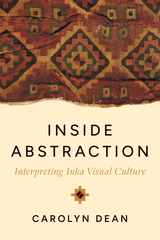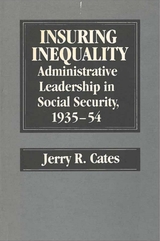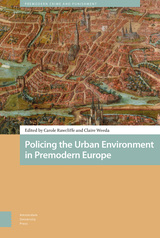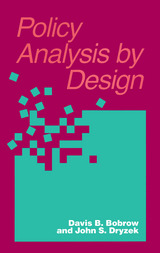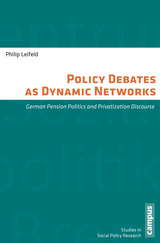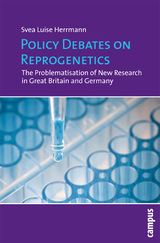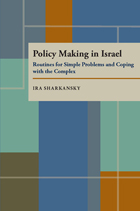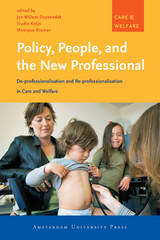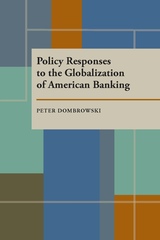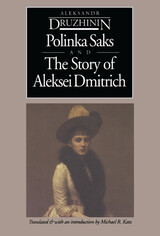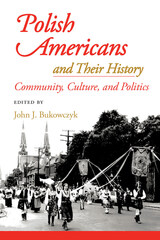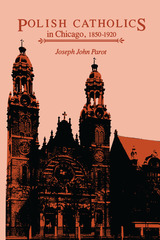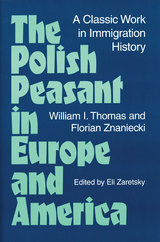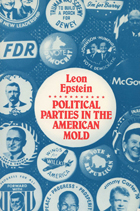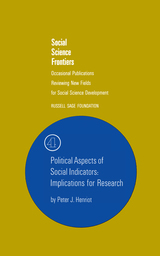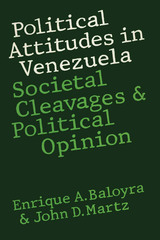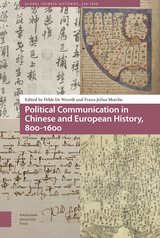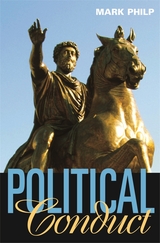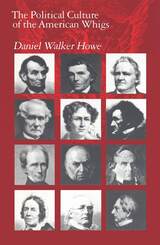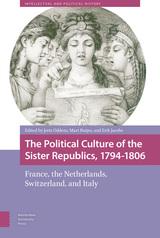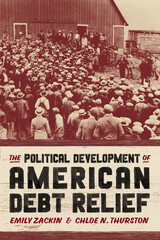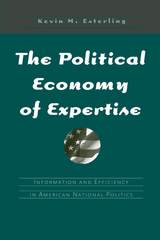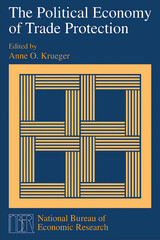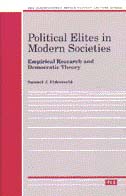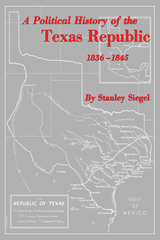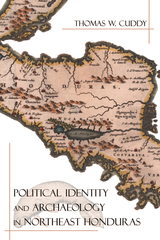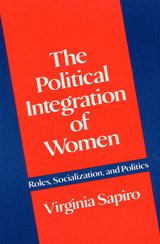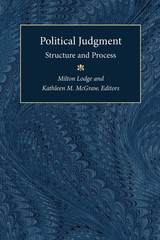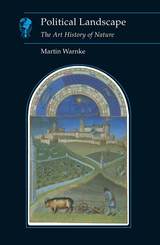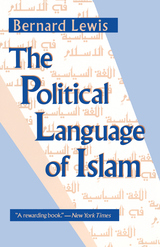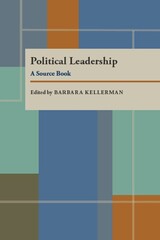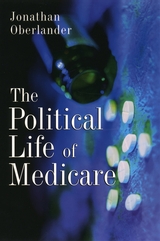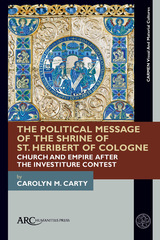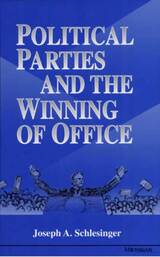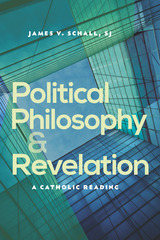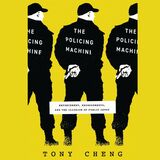 The Policing Machine: Enforcement, Endorsements, and the Illusion of Public Input
Tony Cheng
University of Chicago Press, 2024 This is an auto-narrated audiobook version of this book.
A revelatory look at how the NYPD has resisted change through strategic and selective community engagement.
The past few years have seen Americans express passionate demands for police transformation. But even as discussion of no-knock warrants, chokeholds, and body cameras has exploded, any changes to police procedures have only led to the same outcomes. Despite calls for increased accountability, police departments have successfully stonewalled change.
In The Policing Machine, Tony Cheng reveals the stages of that resistance, offering a close look at the deep engagement strategies that NYPD precincts have developed with only subsets of the community in order to counter any truly meaningful, democratic oversight. Cheng spent nearly two years in an unprecedented effort to understand the who and how of police-community relationship building in New York City, documenting the many ways the police strategically distributed power and privilege within the community to increase their own public legitimacy without sacrificing their organizational independence. By setting up community councils that are conveniently run by police allies, handing out favors to local churches that will promote the police to their parishioners, and offering additional support to institutions friendly to the police, the NYPD, like police departments all over the country, cultivates political capital through a strategic politics that involves distributing public resources, offering regulatory leniency, and deploying coercive force. The fundamental challenge with police-community relationships, Cheng shows, is not to build them. It is that they already exist and are motivated by a machinery designed to stymie reform.
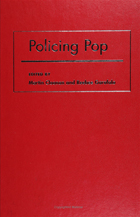 Policing Pop
edited by Martin Cloonan and Reebee Garofalo
Temple University Press, 2002 Fans and detractors of popular music tend to agree on one thing: popular music is a bellwether of an individual's political and cultural values. In the United States, for example, one cannot think of the counterculture apart from its music. For that reason, in virtually every country in the world, some group identifies popular music as a source of potential danger and wants to regulate it. Policing Pop looks into the many ways in which popular music and artists around the world are subjected to censorship, ranging from state control and repression to the efforts of special interest or religious groups to limit expression.The essays collected here focus on the forms of censorship as well as specific instances of how the state and other agencies have attempted to restrict the types of music produced, recorded and performed within a culture. Several show how even unsuccessful attempts to exert the power of the state can cause artists to self-censor. Others point to material that taxes even the most liberal defenders of free speech. Taken together, these essays demonstrate that censoring agents target popular music all over the world, and they raise questions about how artists and the public can resist the narrowing of cultural expression.
 Policing Protest: The Control of Mass Demonstrations in Western Democracies
Donatella della Porta Della Porta
University of Minnesota Press, 1998 The first international examination of how police respond to political protests. The way in which police handle political demonstrations is always potentially controversial. In contemporary democracies, police departments have two different, often conflicting aims: keeping the peace and defending citizens’ right to protest. This collection, the only resource to examine police interventions cross-nationally, analyzes a wide array of policing styles. The contributors look at cultures and political power to examine the methods, the trends and cycles, and the consequences of policing protest. Focusing on Italy, France, Germany, Great Britain, Switzerland, Spain, the United States, and South Africa, the contributors explore the various police strategies of coercion, negotiation, and information surveillance. They discuss protest policing in relation to specific countries’ governments and consider public opinion, media, and the police’s perception of reality to illustrate the reciprocal ways in which police and protest are defined. Moreover, this volume considers the profound changes from the forceful 1960s to a “softer” 1990s, including the consequences of this move.Comparative and innovative, Policing Protest highlights the crucial influences of demonstration interventions and lends greater understanding to the study of social movements and their relationship to the state. Contributors: Rocco De Biasi, U of Genoa; Olivier Fillieule, Institute of Political Science, Paris; Oscar Jaime-Jiménez, Universidad Nacional de Educación a Distancia, Madrid; Fabien Jobard, U of Rouen, France; Hanspeter Kriesi, U of Geneva; Gary T. Marx, Massachusetts Institute of Technology and U of Colorado, Boulder; John McCarthy, Catholic U of America; Clark McPhail, U of Illinois; Fernando Reinares, Universidad Nacional de Educación a Distancia, Madrid; Robert Reiner, London School of Economics; David Schweingruber; P. A. J. Waddington, U of Reading, UK; Martin Winter, U of Halle, Germany; Dominique Wisler, U of Geneva.
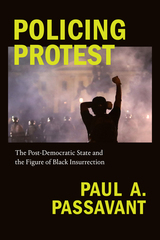 Policing Protest: The Post-Democratic State and the Figure of Black Insurrection
Paul A. Passavant
Duke University Press, 2021 In Policing Protest Paul A. Passavant explores how the policing of protest in the United States has become increasingly hostile since the late 1990s, moving away from strategies that protect protesters toward militaristic practices designed to suppress protests. He identifies reactions to three interrelated crises that converged to institutionalize this new mode of policing: the political mobilization of marginalized social groups in the Civil Rights era that led to a perceived crisis of democracy, the urban fiscal crisis of the 1970s, and a crime crisis that was associated with protests and civil disobedience of the 1960s. As Passavant demonstrates, these reactions are all haunted by the figure of black insurrection, which continues to shape policing of protest and surveillance, notably in response to the Black Lives Matter movement. Ultimately, Passavant argues, this trend of violent policing strategies against protesters is evidence of the emergence of a post-democratic state in the United States.
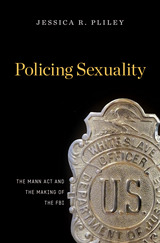 Policing Sexuality: The Mann Act and the Making of the FBI
Jessica R. Pliley
Harvard University Press, 2014 America’s first anti–sex trafficking law, the 1910 Mann Act, made it illegal to transport women over state lines for prostitution “or any other immoral purpose.” It was meant to protect women and girls from being seduced or sold into sexual slavery. But, as Jessica Pliley illustrates, its enforcement resulted more often in the policing of women’s sexual behavior, reflecting conservative attitudes toward women’s roles at home and their movements in public. By citing its mandate to halt illicit sexuality, the fledgling Bureau of Investigation gained entry not only into brothels but also into private bedrooms and justified its own expansion.
Policing Sexuality links the crusade against sex trafficking to the rapid growth of the Bureau from a few dozen agents at the time of the Mann Act into a formidable law enforcement organization that cooperated with state and municipal authorities across the nation. In pursuit of offenders, the Bureau often intervened in domestic squabbles on behalf of men intent on monitoring their wives and daughters. Working prostitutes were imprisoned at dramatically increased rates, while their male clients were seldom prosecuted.
In upholding the Mann Act, the FBI reinforced sexually conservative views of the chaste woman and the respectable husband and father. It built its national power and prestige by expanding its legal authority to police Americans’ sexuality and by marginalizing the very women it was charged to protect.
 Policing Space: Territoriality and the Los Angeles Police Department
Steve Herbert
University of Minnesota Press, 1996 Policing Space is a fascinating firsthand account of how the Los Angeles Police Department attempts to control its vast, heterogeneous territory. As such, the book offers a rare, ground-level look at the relationship between the control of space and the exercise of power. Author Steve Herbert spent eight months observing one patrol division of the LAPD on the job. A compelling story in itself, his fieldwork with the officers in the Wilshire Division affords readers a close view of the complex factors at play in how the police define and control territory, how they make and mark space. A remarkable ethnography of a powerful police department, underscored throughout with telling on-the-scene vignettes, this book is also an unusually intensive analysis of the exercise of territorial power-and of territoriality as a key component of police power. Unique in its application of fieldwork and theory to this complex subject, it should prove valuable to readers in urban and political geography, urban and political sociology, and criminology, as well as those who wonder about the workings of the LAPD.
 POLICING THE CITY: CRIME & LEGAL AUTHORITY IN LONDON, 1780-1840
ANDREW T. HARRIS
Ohio State University Press, 2004 In Policing the City, Harris seeks to explain the transformation of criminal justice, particularly the transformation of policing, between the 1780s and 1830s in the City of London. As utilitarian legal reformers argued that criminal deterrence ought to be based on certain and rational punishment rather than random execution, they also had to control the discretionary authority of enforcement. This meant in theory and practice the centralization of policing in the 1830s, and the end of local policing, which was seen as corrupt, inefficient, and unsuitable for rational criminal justice. Revolutionary changes in policing began locally, however, in the 1780s. Such local changes preceded and inspired national reforms, and local policing up to the centralizing measures of the 1830s remained dynamic, responsive, and locally accountable right until its demise. Anxiety about policing had as much to do with the social origins of the police as it did about the origins of criminality, and control over the discretionary authority of watchmen and constables played a larger role in criminal justice reform than the nature of crime. The national, metropolitan, and City police reforms of the late 1830s were thus the culmination of a contentious argument over the meanings of justice, efficiency, and order, rather than its beginning. Harris's evidence reveals how what we've come to think of as “modern” policing evolved out of local practice and reflects shifts in wider debates about crime, justice, and discretionary authority.
 Policing the Open Road: How Cars Transformed American Freedom
Sarah A. Seo
Harvard University Press, 2019 A Smithsonian Best History Book of the Year
Winner of the Littleton-Griswold Prize
Winner of the Ralph Waldo Emerson Award
Winner of the Order of the Coif Award
Winner of the Sidney M. Edelstein Prize
Winner of the David J. Langum Sr. Prize in American Legal History
Winner of the Berkshire Conference of Women Historians Book Prize
“From traffic stops to parking tickets, Seo traces the history of cars alongside the history of crime and discovers that the two are inextricably linked.”
—Smithsonian
When Americans think of freedom, they often picture the open road. Yet nowhere are we more likely to encounter the long arm of the law than in our cars. Sarah Seo reveals how the rise of the automobile led us to accept—and expect—pervasive police power, a radical transformation with far-reaching consequences.
Before the twentieth century, most Americans rarely came into contact with police officers. But in a society dependent on cars, everyone—law-breaking and law-abiding alike—is subject to discretionary policing. Seo challenges prevailing interpretations of the Warren Court’s due process revolution and argues that the Supreme Court’s efforts to protect Americans did more to accommodate than limit police intervention. Policing the Open Road shows how the new procedures sanctioned discrimination by officers, and ultimately undermined the nation’s commitment to equal protection before the law.
“With insights ranging from the joy of the open road to the indignities—and worse—of ‘driving while black,’ Sarah Seo makes the case that the ‘law of the car’ has eroded our rights to privacy and equal justice…Absorbing and so essential.”
—Paul Butler, author of Chokehold
“A fascinating examination of how the automobile reconfigured American life, not just in terms of suburbanization and infrastructure but with regard to deeply ingrained notions of freedom and personal identity.”
—Hua Hsu, New Yorker
Policing the Urban Environment in Premodern Europe
Carole Rawcliffe
Amsterdam University Press, 2019 Tapping into a combination of court documents, urban statutes, material artefacts, health guides and treatises, Policing the Urban Environment in Premodern Europe offers a unique perspective on how premodern public authorities tried to create a clean, healthy environment. Overturning many preconceptions about medieval dirt and squalor, it presents the most outstanding recent scholarship on how public health norms were enforced in the judicial, religious and socio-cultural sphere before the advent of modern medicine and the nation-state, crossing geographical and linguistic boundaries and engaging with factors such as spiritual purity, civic pride and good neighbourliness.
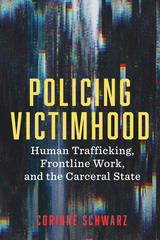 Policing Victimhood: Human Trafficking, Frontline Work, and the Carceral State
Corinne Schwarz
Rutgers University Press, 2023 Since the turn of the twentieth century, human trafficking has animated public discourses, policy debates, and moral panics in the United States. Though some nuances of these conversations have shifted, the role of the criminal legal system (police officers, investigators, lawyers, and connected service providers) in anti-trafficking interventions has remained firmly in place. Policing Victimhood explores how frontline workers in direct contact with vulnerable, exploited, and trafficked persons—however those groups are defined at personal, organizational, or legal levels—defer to the tools of the carceral state and ideologies of punishment when navigating their clients’ needs.
In Policing Victimhood, Corinne Schwarz interviewed with service providers in the Midwestern US, a region that, though colloquially understood as “flyover country,” regularly positions itself as a leader in state-level anti-trafficking policies and collaborative networks. These frontline workers’ perceptions and narratives are informed by their interpersonal, day-to-day encounters with exploited or trafficked persons. Their insights underscore how anti-trafficking policies are put into practice and influenced by specific ideologies and stereotypes. Extending the reach of street-level bureaucracy theory to anti-trafficking initiatives, Schwarz demonstrates how frontline workers are uniquely positioned to perpetuate or radically counter punitive anti-trafficking efforts.
Taking a cue from anti-carceral feminist critiques and critical trafficking studies, Schwarz argues that ongoing anti-trafficking efforts in the US expand the punitive arm of the state without addressing the role of systemic oppression in perpetuating violence. The violence inherent to the carceral state—and required for its continued expansion—is the same violence that perpetuates the exploitation of human trafficking. In order to solve the “problem” of human trafficking, advocates, activists, and scholars must divest from systems that center punishment and radically reinvest their efforts in dismantling the structural violence that perpetuates social exclusion and vulnerability, what she calls the “-isms” and “-phobias” that harm some at the expense of others’ empowerment. Policing Victimhood encourages readers to imagine a world without carceral violence in any of its forms.
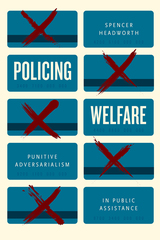 Policing Welfare: Punitive Adversarialism in Public Assistance
Spencer Headworth
University of Chicago Press, 2021 Means-tested government assistance in the United States requires recipients to meet certain criteria and continue to maintain their eligibility so that benefits are paid to the “truly needy.” Welfare is regarded with such suspicion in this country that considerable resources are spent policing the boundaries of eligibility, which are delineated by an often confusing and baroque set of rules and regulations. Even minor infractions of the many rules can cause people to be dropped from these programs, and possibly face criminal prosecution. In this book, Spencer Headworth offers the first study of the structure of fraud control in the welfare system by examining the relations between different levels of governmental agencies, from federal to local, and their enforcement practices. Policing Welfare shows how the enforcement regime of welfare has been constructed to further stigmatize those already living in poverty and deepens disparities of class, race, and gender in our society.
 Policing Women: The Sexual Politics of Law Enforcement and the LAPD
Janis Appier
Temple University Press, 1998 Many of us take the presence of policewomen on patrol and in investigative roles for granted. Realistic dramas and comedies in the movies and on television show women officers performing the same duties as men on the force. This visibility tells us nothing about the hostility and controversy that have beset policewomen since they were first hired by police departments in the 1910s. Author Janis Appier traces the origins of women in police work, explaining how pioneer policewomen's struggles to gain secure footholds in big city police departments ironically helped to make modern policework one of the most male dominated occupations in the United State.
With a new vision of non-coercive police work and crime prevention, Progressive reformers exerted political and social pressure to create positions for female officers dedicated to guiding and protecting juveniles and women. Women reformers pointed to changing sexual mores among working-class female youth to emphasize the need for a new approach to policing.
The policewomen who undertook the work of counseling sexually active teenage girls and their families saw themselves as helping young people achieve moral equilibrium during a period in which standards of context were in flux. In the Los Angeles Police Department, the first to hire women, this social work was primarily the responsibility of the City Mother's Bureau; in other major cities, policewomen's roles were similarly constructed as maternalistic. Scrutinizing case records, public statements, and departmental policies governing policewomen, Appier shows how female officers handled the complex gender politics of their work with the public and within their departments.
Appier reveals that many of these pioneering policewomen succeeded in expanding the scope of policework and carving out a rewarding professional niche, despite continued attempts to oust them or limit their sphere of action. But this advancement was short-lived; within a generation a masculinized model of crime fighting took hold, and policewomen's authority eroded.
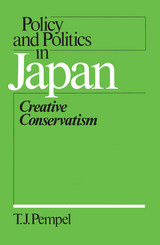 Policy & Politics Japan
T. Pempel
Temple University Press, 1982 "This is a masterful, well-written examination of Japanese politics."
--Choice
In a comparative framework, Pempel analyzes six major areas of domestic policy-making in Japan--administrative reform, economic policy, labor relations, social welfare, environmental policy, and higher education. Each case is accompanied by selected readings translated from official government documents and the writings of critics of official policy. The book offers an unusually strong point of view, one that is sure to invite debate.
Pemple attempts to unravel the intertwined issues of the autonomy of the Japanese bureaucracy and the strength of the conservative coalition. He describes the weaknesses of opposition politics and labor but goes on to suggest how protest movements can be effective and how change can occur in the face of a powerful conservative consensus. The "economic miracle" of Japan, like the other policy areas, is realistically assessed in the context of events in other industrialized countries.
Policy Analysis by Design
Davis Bobrow
University of Pittsburgh Press, 1987 Policy Analysis by Design examines the approaches to public policy taken by those who try to teach it, write about it, and influence it through major analysis. Bobrow and Dryzek systematically compare the five major contending analytical frames of reference: welfare economics, public choice, social structure, information processing, and political philosophy. The workings of each frame are illustrated by means of a common, if imaginary, policy case - air pollution in the hypothetical Smoke Valley.
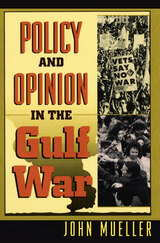 Policy and Opinion in the Gulf War
John Mueller
University of Chicago Press, 1994 The Persian Gulf crisis may well have been the most extensively polled episode in U.S. history as President Bush, his opponents, and even Saddam Hussein appealed to, and tried to influence, public opinion. As well documented as this phenomenon was, it remains largely unexplained. John Mueller provides an account of the complex relationship between American policy and public opinion during the Gulf crisis.
Mueller analyzes key issues: the actual shallowness of public support for war; the effect of public opinion on the media (rather than the other way around); the use and misuse of polls by policy makers; the American popular focus on Hussein's ouster as a central purpose of the War; and the War's short-lived impact on voting. Of particular interest is Mueller's conclusion that Bush succeeded in leading the country to war by increasingly convincing the public that it was inevitable, rather than right or wise.
Throughout, Mueller, author of War, Presidents, and Public Opinion, an analysis of public opinion during the Korean and Vietnam wars, places this analysis of the Gulf crisis in a broad political and military context, making comparisons to wars in Panama, Vietnam, Korea, and the Falklands, as well as to World War II and even the War of 1812. The book also collects nearly 300 tables charting public opinion through the Gulf crisis, making Policy and Opinion in the Gulf War an essential reference for anyone interested in recent American politics, foreign policy, public opinion, and survey research.
 The Policy Challenge of Ethnic Diversity: Immigrant Politics in France and Switzerland
Patrick Ireland
Harvard University Press, 1994 World War II was over, Western Europe was rebuilding, and laborers were in short supply. The masses of foreign workers recruited to fill the gap presented, or so it seemed to their host countries, a temporary solution—but then the guests opted to stay. How have these permanent visitors fitted into Western European societies, where xenophobia and liberalism coexist in an uneasy balance? Have such marginalized groups developed any recognizable forms of political participation?
This book, a rare account of political activity among these immigrants, reveals the extent of their impact on and interaction with the policies and politics of their adopted countries. Comparing France and Switzerland, and focusing on four cities, Patrick Ireland tests various existing explanations of how and why immigrant political participation has taken certain forms: homeland-oriented, geared toward the country of origin; institutional, conducted through regularly accorded channels in the host society; or confrontational, developed outside legal and favored channels.
Through extensive research and interviews, Ireland finds that national and local institutional frameworks, rather than the immigrants' ethnic origins or class status, determine the form their political mobilization takes. He shows how indigenous trade unions, political parties, and other institutions have acted as gatekeepers, controlling access to avenues of political participation, and describes the ways in which immigrants have availed themselves of the different opportunities in each institutional context. Documenting changes from one generation to the next, his account identifies distinctive forms of political activity that have evolved in recent years.
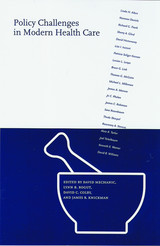 Policy Challenges in Modern Health Care
Edited by David Mechanic, Lynn B. Rogut, David Colby, and James R. Knickman
Rutgers University Press, 2005 Health care delivery in the United States is an enormously complex enterprise, and its $1.6 trillion annual expenditures involve a host of competing interests. While arguably the nation offers among the most technologically advanced medical care in the world, the American system consistently under performs relative to its resources. Gaps in financing and service delivery pose major barriers to improving health, reducing disparities, achieving universal insurance coverage, enhancing quality, controlling costs, and meeting the needs of patients and families.
Bringing together twenty-five of the nation’s leading experts in health care policy and public health, this book provides a much-needed perspective on how our health care system evolved, why we face the challenges that we do, and why reform is so difficult to achieve. The essays tackle tough issues including: socioeconomic disadvantage, tobacco, obesity, gun violence, insurance gaps, the rationing of services, the power of special interests, medical errors, and the nursing shortage.
Linking the nation’s health problems to larger political, cultural, and philosophical contexts, Policy Challenges in Modern Health Care offers a compelling look at where we stand and where we need to be headed.
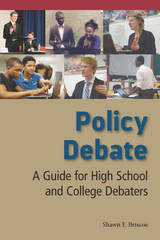 Policy Debate: A Guide for High School and College Debaters
Shawn F. Briscoe
Southern Illinois University Press, 2017 In Policy Debate: A Guide for High School and College Debaters, Shawn F. Briscoe introduces educators, coaches, and students at the high school and college levels to the concepts at the foundation of policy debate, also known as cross-examination debate, and uses conceptual analysis and real-world examples to help students engage in competitive debates and deploy winning strategies.
Briscoe addresses all aspects of policy debate, including stock issues, judging paradigms and effective engagement with judges, the responsibilities of both affirmative and negative teams, and the evaluation of policy proposals through the use of disadvantages, counterplans, and critical argumentation. In addition, Briscoe helps debaters better establish their credibility, improve their cross-examination skills, and understand the specialized notetaking method called flowing. The book models for readers how to effectively cross-examine an opposing team, features a transcript of a mock debate designed to help clarify the lessons taught in previous chapters, and includes a glossary of key terms. Briscoe also considers contemporary trends in the debate community, exploring the evolution of policy debate and the rise of performance-based approaches, while providing insight into how best to engage with performance teams.
Offering a unique approach presented by a seasoned debate coach, Policy Debate: A Guide for High School and College Debaters goes beyond the basics to explore how policy is an ever-evolving form of debate. This attention to the progression of policy styles will make readers better at adapting to opponents during a debate and will make them more adept at arguing against a wider range of cases.
Policy Debates as Dynamic Networks: German Pension Politics and Privatization Discourse
Philip Leifeld
Campus Verlag, 2016 How do policy debates work? How can interest groups and legislators influence political processes through the media? This book introduces discourse network analysis as a methodological toolbox for the study of policy debates. With this set of methods, political discourse is cast as a temporal network of actors and their statements in the media over time. In a case study, Philip Leifeld applies discourse network analysis to the policy debate on old-age security in Germany. Demonstrating that German pension politics was characterized by an increasing polarization of competing coalitions towards the end of the 1990s, Leifeld shows how structural breaks in the discourse network can explain major policy changes and a radical turn to privatization in 2001.
Policy Debates on Reprogenetics: The Problematisation of New Research in Great Britain and Germany
Svea Luise Herrmann
Campus Verlag, 2009
Policy Debates on Reprogenetics takes an in-depth look at recent public policy debates over stem cell research and therapeutic cloning in Great Britain and Germany in order to determine the effect of such debates on the progress of scientific knowledge. Svea Luise Herrmann argues that debates about government policy do not tend to lead to more societal and political control over scientific research; rather, the discussions, when framed as questions of ethics, allow societies to air anxieties without retarding or challenging scientific progress. As our understanding of genetics continues to grow, this volume will be a useful resource for scientists and policy makers alike.
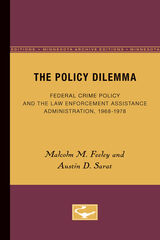 The Policy Dilemma: Federal Crime Policy and the Law Enforcement Assistance Administration, 1968-1978
Malcolm Feeley
University of Minnesota Press, 1981
The Policy Dilemma was first published in 1981.What can and should the federal government do to solve complex social problems? Malcolm M. Feeley and Austin D. Sarat address this question in the context of one important issue, the problem of crime. They examine a major federal program, the Law Enforcement Assistance Administration, and show how its operation is shaped and reflects what they call the “policy dilemma.” In response to the public’s demands, the government tries to do too much and promises more than it can deliver. While The Policy Dilemma is first of all a study of the federal government’s attempts to reform and improve criminal justice, it also examines broader issues of public policy making. The problems faced by the LEAA in crime control are shared by all governmental attempts to attack large, insufficiently defined social problems.The authors base their conclusions on extensive interviews with federal, state, and local officials responsible for implementing the Safe Streets Act, including members of ten state planning agencies. In conclusion, Feeley and Sarat summarize the problems of the Safe Streets Act and review congressional attempts at revision and reorganization. They argue that those attempts will only prolong the policy dilemma. The failure of the LEAA, they suggest, is not just a failure of administration but of concept and political theory.
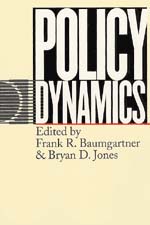 Policy Dynamics
Edited by Frank R. Baumgartner and Bryan D. Jones
University of Chicago Press, 2002 While governmental policies and institutions may remain more or less the same for years, they can also change suddenly and unpredictably in response to new political agendas and crises. What causes stability or change in the political system? What role do political institutions play in this process?
To investigate these questions, Policy Dynamics draws on the most extensive data set yet compiled for public policy issues in the United States. Spanning the past half-century, these data make it possible to trace policies and legislation, public and media attention to them, and governmental decisions over time and across institutions. Some chapters analyze particular policy areas, such as health care, national security, and immigration, while others focus on institutional questions such as congressional procedures and agendas and the differing responses by Congress and the Supreme Court to new issues.
Policy Dynamics presents a radical vision of how the federal government evolves in response to new challenges-and the research tools that others may use to critique or extend that vision.
 Policy Entrepreneurs and School Choice
Michael Mintrom
Georgetown University Press, 2000 Rapid and controversial, the spread of school choice initiatives across the United States has radically changed political debate about public education. In this book, Michael Mintrom explores the complex world of open-enrollment policies, charter schools and voucher plans to reveal how and why school choice has become a major issue, and he draws important conclusions about how innovative individuals can spur significant change in the policy arena. Policy entrepreneurs—individuals who take up a cause and make it part of the political agenda—have largely remained background figures without clear definition in the policymaking literature. This book is the first comprehensive and systematic treatment of the concept of policy entrepreneurship, providing an important foundation for explaining how policy proposals are initiated, considered, and adopted. Mintrom uses the emergence of school choice in state politics to examine how policy change originates. He shows how policy entrepreneurs have been instrumental in placing school choice onto state legislative agendas, despite the lack of compelling evidence about its merits, and how they use social networks, reframe policy issues, and attempt to shift the sites of policy debate. Blending innovative theory with both qualitative and quantitative investigation, Mintrom explains how energetic individuals made school choice a real choice. In doing so, he changes our broader understanding of how policy is formed.
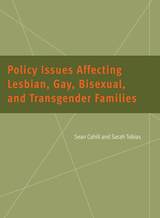 Policy Issues Affecting Lesbian, Gay, Bisexual, and Transgender Families
Sean Cahill and Sarah Tobias
University of Michigan Press, 2010 Lesbian, gay, bisexual, and transgender people face the same family issues as their heterosexual counterparts, but that is only the beginning of their struggle. The LGBT community also encounters legal barriers to government recognition of their same-sex relationships and relationships to their own children. Policy Issues Affecting Lesbian, Gay, Bisexual, and Transgender Families addresses partner recognition, parenting, issues affecting children of LGBT parents, health care, discrimination, senior care and elder rights, and equal access to social services. Sean Cahill and Sarah Tobias provide up-to-date, accurate analysis of the major policies affecting LGBT people, their same-sex partners, and their children. This valuable resource offers literature reviews of demographic research as well as original research based on the U.S. Census same-sex couple sample. It also provides a look at the 30-year history of right-wing anti-gay activism and the intra-community intellectual debates over the fight for marriage. "The sheer diversity of gay people and opinion shines through Cahill and Tobias's fact-packed depiction of same-sex couples and their kids, their needs and day-to-day challenges, and the movement for fairness and the freedom to marry. The disparate personal stories and struggles in this informative book underscore the importance of ending discrimination in marriage and ensuring that no family is left behind." —Evan Wolfson, Founder and Executive Director of the Freedom to Marry Project "A concise, comprehensive guide to gay-family issues that combines an impassioned progressive sensibility with a firm respect for facts."
—Jonathan Rauch, senior writer and columnist for National Journal,Atlantic Monthly correspondent, and author of Gay Marriage: Why It Is Good for Gays, Good for Straights, and Good for America "Cahill and Tobias offer readers a thorough and immensely readable guide to the legal problems faced by LGBT families."
—Ellen Andersen, Indiana University–Purdue University at Indianapolis "For an account of policy issues that frame lesbian, gay, bisexual, and transgender (LGBT) family lives here in the United States, one need look no further. Sean Cahill and Sarah Tobias supply accurate and up-to-date information about the legal and policy contexts of LGBT lives across the country. This book is sure to be a valuable resource for students and scholars, as well as for others seeking to understand and challenge discrimination based on sexual orientation or gender identity." —Charlotte J. Patterson, University of Virginia Sean Cahill is Director of the National Gay and Lesbian Task Force Policy Institute. Sarah Tobias is a feminist theorist and LGBT activist who earned her Ph.D. in Political Science from Columbia University. She has taught Political Theory at colleges in New York and New Jersey, and currently works as Senior Policy Analyst in the Democracy program at Demos, a New York City–based think tank.
 Policy Issues Affecting Lesbian, Gay, Bisexual, and Transgender Families
Sean Cahill and Sarah Tobias
University of Michigan Press, 2006 Lesbian, gay, bisexual, and transgender people face the same family issues as their heterosexual counterparts, but that is only the beginning of their struggle. The LGBT community also encounters legal barriers to government recognition of their same-sex relationships and relationships to their own children. Policy Issues Affecting Lesbian, Gay, Bisexual, and Transgender Families addresses partner recognition, parenting, issues affecting children of LGBT parents, health care, discrimination, senior care and elder rights, and equal access to social services. Sean Cahill and Sarah Tobias provide up-to-date, accurate analysis of the major policies affecting LGBT people, their same-sex partners, and their children. This valuable resource offers literature reviews of demographic research as well as original research based on the U.S. Census same-sex couple sample. It also provides a look at the 30-year history of right-wing anti-gay activism and the intra-community intellectual debates over the fight for marriage. "The sheer diversity of gay people and opinion shines through Cahill and Tobias's fact-packed depiction of same-sex couples and their kids, their needs and day-to-day challenges, and the movement for fairness and the freedom to marry. The disparate personal stories and struggles in this informative book underscore the importance of ending discrimination in marriage and ensuring that no family is left behind." —Evan Wolfson, Founder and Executive Director of the Freedom to Marry Project "A concise, comprehensive guide to gay-family issues that combines an impassioned progressive sensibility with a firm respect for facts."
—Jonathan Rauch, senior writer and columnist for National Journal,Atlantic Monthly correspondent, and author of Gay Marriage: Why It Is Good for Gays, Good for Straights, and Good for America "Cahill and Tobias offer readers a thorough and immensely readable guide to the legal problems faced by LGBT families."
—Ellen Andersen, Indiana University–Purdue University at Indianapolis "For an account of policy issues that frame lesbian, gay, bisexual, and transgender (LGBT) family lives here in the United States, one need look no further. Sean Cahill and Sarah Tobias supply accurate and up-to-date information about the legal and policy contexts of LGBT lives across the country. This book is sure to be a valuable resource for students and scholars, as well as for others seeking to understand and challenge discrimination based on sexual orientation or gender identity." —Charlotte J. Patterson, University of Virginia Sean Cahill is Director of the National Gay and Lesbian Task Force Policy Institute. Sarah Tobias is a feminist theorist and LGBT activist who earned her Ph.D. in Political Science from Columbia University. She has taught Political Theory at colleges in New York and New Jersey, and currently works as Senior Policy Analyst in the Democracy program at Demos, a New York City–based think tank.
Policy Making in Israel: Routines for Simple Problems and Coping with the Complex
Ira Sharkansky
University of Pittsburgh Press, 1997
All governments face problems and are judged by their ability to solve them and the policies they develop in doing so. Compared with other Western democracies, Israel has faced a devastating number of problems of unusual severity in a relatively short time: war, terrorism, heavy immigration, unsettled boundaries, economic stresses, internal disputes about ethnicity and religion, and the lingering scars of the Holocaust and other persecutions. Sharkansky’s analysis of the Israeli government’s routines and methods for coping with such an array of difficulties, from simple to complex to intractable, offers general insights into how governments make policy in a democracy.
Policy, People, and the New Professional: De-professionalisation and Re-professionalisation in Care and Welfare
Edited by Jan Willem Duyvendak, Trudie Knijn, and Monique Kremer
Amsterdam University Press, 2006
In recent decades, social and political pressures have forced a reevaluation of the roles of health and welfare professionals throughout Europe. Policy, People, and the New Professional examines those changes and their consequences.
The volume reveals how public dissatisfaction with caregivers, financial pressures from government agencies, and attempts to cope with Europe’s increasingly multicultural population have led to changes in responsibilities and oversight for a wide range of practitioners. Though more changes are certain to come as Europe’s population ages—Policy, People, and the New Professional provides an essential explanation of the road traveled so far.
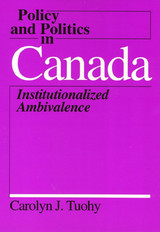 Policy Politics Canada
Carolyn J. Tuohy
Temple University Press, 1992 At a time when Canadian political institutions are being fundamentally questioned, this book provides a comparative perspective on the distinctive features of the Canadian policy process hich have enabled conflict to be resolved in the past. In comparison with other Western industrial nations, Canada's policies in some arenas appear as models of workable compromise; in others, they stand out as marked by continuing irresolution. In this first book-length treatment of Canadian public policy in comparative perspective, Carolyn Tuohy focuses on constitutional change, health care delivery, industrial relations and labor market policy, economic development and adjustment, oil and gas policy, and minority language rights. What distinguishes Canada's characteristic policy process is its quintessential ambivalence: ambivalence about the appropriate role of the state, about definitions of political community, and about individual and collective values and conceptions of rights. Embedded in the country's political institutions, it has deep roots in Canada's relationship to the United States, its history of English-French tensions, and its regional diversity. Examining in particular the delicate federal-provincial division of power and the legislative-judicial relationship, Tuohy discusses how the constitutional debates of the 1980s and 1990s are testing Canada's institutions to resolve conflict. In the series Policy and Politics in Industrial States, edited by Douglas E. Ashford, Peter J. Katzenstein, and T.J. Pempel.
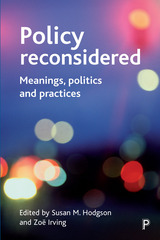 Policy Reconsidered: Meanings, Politics and Practices
Edited by Susan M. Hodgson and Zoe Irving
Bristol University Press, 2007 The idea of policy is ripe for critical reappraisal. Whilst the context for policy making changes constantly, multiple questions endure, such as how policy is conceived and why; what is taken for granted and what gets problematised; and how policy should be informed, analysed and understood.This book identifies key topics within the policy arena and subjects them to theoretical and practical analysis. It explores the meaning and framing of policy, and examines its practice from the micro- to the supra-national levels, using illustrative case studies to demonstrate how policy is contested, shaped and accounted for. Given the significance of policy as a means to organise and direct social, economic and political life, this book presents the case for a critical restatement of its origins, development and form - without which we risk being caught up in a cycle of change without understanding why or how.The book presents a productive encounter between the three themes of meanings, politics and practices, themes normally not brought together in a single text. It emphasizes the multiplicity of perspectives that can be directed towards understanding the policy world, opening up new ground as well as visiting anew some familiar terrain. Targeted at upper undergraduate and postgraduate students and their teachers, it will also be of interest to researchers and policy actors wanting insight to their project.
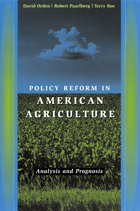 Policy Reform in American Agriculture: Analysis and Prognosis
David Orden, Robert Paarlberg, and Terry Roe
University of Chicago Press, 1999 Despite substantial transformations in American agriculture, farm program spending remains a closely guarded prerogative of United States agricultural policy. Policy Reform in American Agriculture examines both the history of farm subsidies and the contemporary relevance of traditional farm programs to today's agricultural industries.
This work analyzes the mixed performance of past agricultural support programs, reviews the current debate concerning farm policies, and critically assesses the often staunch political resistance to much-needed policy reforms. Casting a keen eye toward the most recent developments on both national and international fronts, the authors consider the ramifications of the 1996 Federal Agriculture Improvement and Reform (FAIR) Act as well as multilateral efforts to gain agricultural reform during the Uruguay Round of GATT. Their prognosis hinges upon both the continued growth and competitiveness of the world market and, perhaps more importantly, the ongoing commitment of congressional reform advocates.
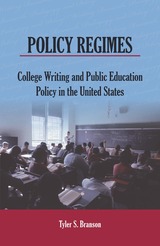 Policy Regimes: College Writing and Public Education Policy in the United States
Tyler S. Branson
Southern Illinois University Press, 2021 Engaging education policy from kindergarten to college
Author Tyler S. Branson argues that education reform initiatives in the twentieth century can be understood in terms of historical shifts in the ideas, interests, and governing arrangements that inform the teaching of writing. Today, policy regimes of “accountability” shape education reform programs such as Common Core in K-12 and Dual Enrollment in postsecondary institutions. This book reopens the conversation between policy makers and writing teachers, empirically describing the field’s institutional/historical relationship to policy and the ways teachers work on a daily basis to carry out policy. Federal and state accountability policy significantly shapes classrooms before teachers even enter them, but Branson argues the classroom is where teachers leverage disciplinary knowledge about writing to bridge, partner with, support, and sometimes resist education policies.
Branson deftly blends policy critique, archival analysis, and participant observation to offer the first scholarly treatment of the National Council of Teachers of English (NCTE) Washington Task Force as well as a rare empirical study of a dual enrollment course offered in a high school. This book’s macro-and-micro-level analysis of education policy reveals how writing teachers, researchers, and administrators can strengthen their commitments to successfully teaching their students across all levels of education, while deepening their understanding of the ways education policy helps—and hinders—those commitments.
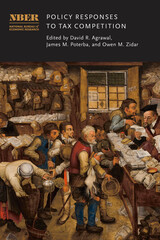 Policy Responses to Tax Competition
Edited by David R. Agrawal, James M. Poterba, and Owen M. Zidar
University of Chicago Press, 2025 A critical examination of the effects of tax competition. Policy Responses to Tax Competition provides an in-depth exploration of how jurisdictions design taxes on mobile economic factors. Tax competition between jurisdictions that seek to attract businesses and residents presents both opportunities and challenges. It can foster government efficiency and provide a counterweight to lobbying for increased spending, but it can also result in inefficiently low tax rates and revenue shortfalls as jurisdictions vie for tax bases. This volume examines the economic drivers and consequences of tax competition and presents empirical evidence on its effects. Divided into three parts, the book first reviews existing research on the determinants and consequences of tax competition and related policy initiatives such as development incentives. The second section focuses on specific policies, such as the Kansas-Missouri noncompete pact and international measures like the OECD’s Base Erosion and Profit Shifting initiative, that are designed to limit tax competition. It also considers the economic responses to these policies, the distributional impact of competition-reducing policies, and potential strategic reactions of other governments. The final section presents case studies of the effects of various policies, including inter-municipal cooperation in France and corporate tax equalization in Switzerland. Altogether, this volume provides new insights into the nature of inter-jurisdictional tax competition and the range of potential responses available to jurisdictions at various levels in federal systems.
Policy Responses to the Globalization of American Banking
Peter Dombrowski
University of Pittsburgh Press, 1996
Since the late 1950s the world's banks have expanded their global operations, with US institutions leading the way. As the recent global economic crisis shows, actions of private bankers can threaten capital markets, weaken national regulatory systems, and strain international cooperation-seriously endangering the world economy and the interests of nation states.
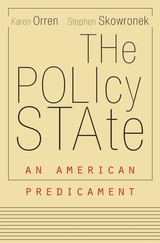 The Policy State: An American Predicament
Karen Orren and Stephen Skowronek
Harvard University Press, 2017 The steady accretion of public policies over the decades has fundamentally changed how America is governed. The formulation and delivery of policy have emerged as the government’s entire raison d’être, redefining rights and reconfiguring institutional structures. The Policy State looks closely at this massive unnoticed fact of modern politics and addresses the controversies swirling around it. Government has become more responsive and inclusive, but the shift has also polarized politics and sowed a deep distrust of institutions. These developments demand a thorough reconsideration of historical governance.
“A sterling example of political science at its best: analytically rigorous, historically informed, and targeted at questions of undeniable contemporary significance… Orren and Skowronek uncover a transformation that revolutionized American politics and now threatens to tear it apart.”
—Timothy Shenk, New Republic
“Wherever you start out in our politics, this book will turn your sense of things sideways and make you rethink deeply held assumptions. It’s a model of what political science could be, but so rarely is.”
—Yuval Levin, National Review
“A gripping narrative…opening up new avenues for reflection along methodological, conceptual, and normative lines.”
—Bernardo Zacka, Contemporary Political Theory
Polinka Saks and The Story of Aleksei
Aleksandr Druzhinin
Northwestern University Press, 1992 This volume offers two of Druzhinin's essential works in their first English translations. Polinka Saks, his most essential short novel, is an epistolary tale of a romantic triangle involving an older man, his young wife, and a dashing young prince. The husband attempts to introduce his wife to literature, art, and music, but his efforts run counter to the dominant trend of society, which "forces women to become little children." The wife falls victim to the prince and realizes too late the value of the education provided by her husband.
A far different tale, The Story of Aleksei Dmitrich is a complex social and psychological study of poverty, family disharmony, precocious children, and destructive self-sacrifice.
 Polio and Its Aftermath: The Paralysis of Culture
Marc Shell
Harvard University Press, 2005 It was not long ago that scientists proclaimed victory over polio, the dread disease of the 1950s. More recently polio resurfaced, not conquered at all, spreading across the countries of Africa. As we once again face the specter of this disease, along with other killers like AIDS and SARS, this powerful book reminds us of the personal cost, the cultural implications, and the historical significance of one of modern humanity's deadliest biological enemies. In Polio and Its Aftermath Marc Shell, himself a victim of polio, offers an inspired analysis of the disease. Part memoir, part cultural criticism and history, part meditation on the meaning of disease, Shell's work combines the understanding of a medical researcher with the sensitivity of a literary critic. He deftly draws a detailed yet broad picture of the lived experience of a crippling disease as it makes it way into every facet of human existence.
Polio and Its Aftermath conveys the widespread panic that struck as the disease swept the world in the mid-fifties. It captures an atmosphere in which polio vied with the Cold War as the greatest cause of unrest in North America--and in which a strange and often debilitating uncertainty was one of the disease's salient but least treatable symptoms. Polio particularly afflicted the young, and Shell explores what this meant to families and communities. And he reveals why, in spite of the worldwide relief that greeted Jonas Salk's vaccine as a miracle of modern science, we have much more to fear from polio now than we know.
Polish Americans and Their History: Community, Culture, and Politics
John J Bukowczyk
University of Pittsburgh Press, 1996 "These richly detailed, readable essays come at a propitious time. For despite all the talk in the academy of 'multiculturalism,' the Poles presence on the American scene is still too often neglected." --Anthony Bukoski, University of Wisconsin, Superior
This rich collection brings together the work of eight leading scholars to examine the history of Polish-American workers, women, families, and politics.
Contributors: Stanislaus A. Blejwas, Andrzej Brozek, William G. Falkowski, William J. Galush, Thaddeus C. Radzilowski, Daniel Stone, and Anna D. Jaroszynska-Kirchmann
John J. Bukowczyk is professor of history at Wayne State University and author of And My Children Did Not Know Me: A History of the Polish Americans.
Polish Cities of Migration: The Migration Transition in Kalisz, Pila and Plock
Anne White
University College London, 2024 An interpersonal look into Poland’s shift from an emigration country to an immigration country.
Polish Cities of Migration analyzes Poland’s transition to become a “country of immigration.” Incorporating in-depth interviews with thirty-seven Polish returned migrants, seventy Ukrainians, and seventeen foreigners living in Kalisz, Plock, and Pila, the book explores two interconnected puzzles: how Poland’s migration transition is influenced by its current status as an emigration country, and why migrants are spreading out beyond the metropolises. It argues that migrants’ feelings of comfort in such locations are explained by network and lifestyle considerations, as well as the social acceptance of migration by former migrant Poles.
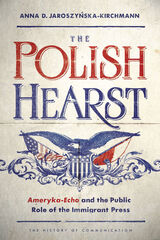 The Polish Hearst: Ameryka-Echo and the Public Role of the Immigrant Press
Anna D. Jaroszynska-Kirchmann
University of Illinois Press, 2015 Arriving in the U.S. in 1883, Antoni A. Paryski climbed from typesetter to newspaper publisher in Toledo, Ohio. His weekly Ameryka-Echo became a defining publication in the international Polish diaspora and its much-read letters section a public sphere for immigrants to come together as a community to discuss issues in their own language. Anna D. Jaroszyńska-Kirchmann mines seven decades' worth of thoughts expressed by Ameryka-Echo readers to chronicle the ethnic press's role in the immigrant experience. Open and unedited debate harkened back to homegrown journalistic traditions, and Jaroszyńska-Kirchmann opens up the nuances of an editorial philosophy that cultivated readers as content creators. As she shows, ethnic publications in the process forged immigrant social networks and pushed notions of education and self-improvement throughout Polonia. Paryski, meanwhile, built a publishing empire that earned him the nickname ""The Polish Hearst."" Detailed and incisive, The Polish Hearst opens the door on the long-overlooked world of ethnic publishing and the amazing life of one of its towering figures.
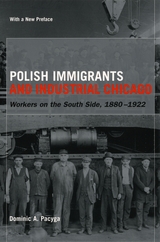 Polish Immigrants and Industrial Chicago: Workers on the South Side, 1880-1922
Dominic A. Pacyga
University of Chicago Press, 2003 How did working-class immigrants from Poland create new communities in Chicago during the industrial age? This book explores the lives of immigrants in two iconic South Side Polish neighborhoods—the Back of the Yards and South Chicago—and the stockyards and steel mills in which they made their living. Pacyga shows how Poles forged communities on the South Side in an attempt to preserve the customs of their homeland; how through the development of churches, the building of schools, the founding of street gangs, and the opening of saloons they tried to recreate the feel of an Eastern European village. Through such institutions, Poles also were able to preserve their folk beliefs and family customs. But in time, the economic hardships of industrialization forced Poles to reach out to their non-Polish neighbors. And this led, in large part, to the organization of labor unions in Chicago's steel and meatpacking industries.
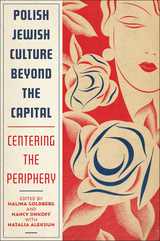 Polish Jewish Culture Beyond the Capital: Centering the Periphery
Halina Goldberg
Rutgers University Press, 2023 Shortlisted by the American Association of Teachers of Slavic and East European Languages (AATSEEL) for Best Edited Multi-Author Scholarly Volume
PIASA's 2024 Anna M. Cienciala Award for Best-Edited Multi-Authored Scholarly Volume Polish Jewish Culture beyond the Capital: Centering the Periphery is a path-breaking exploration of the diversity and vitality of urban Jewish identity and culture in Polish lands from the second half of the nineteenth century to the outbreak of the Second World War (1899–1939). In this multidisciplinary essay collection, a cohort of international scholars provides an integrated history of the arts and humanities in Poland by illuminating the complex roles Jews in urban centers other than Warsaw played in the creation of Polish and Polish Jewish culture. Each essay presents readers with the extraordinary production and consumption of culture by Polish Jews in literature, film, cabaret, theater, the visual arts, architecture, and music. They show how this process was defined by a reciprocal cultural exchange that flourished between cities at the periphery—from Lwów and Wilno to Kraków and Łódź—and international centers like Warsaw, thereby illuminating the place of Polish Jews within urban European cultures. Companion website (https://polishjewishmusic.iu.edu)
Polish Liberal Thought Before 1918
Maciej Janowski
Central European University Press, 2004 Based on solid research, this erudite study is a first attempt at presenting a comprehensive analysis of nineteenth-century Polish liberalism. Polish liberal tradition has generally been considered weak or even nonexistent. Janowski, on the other hand, argues that nineteenth-century Poland inherited a strong protoliberal tradition from the nobility-based democracy, and that in the mid-nineteenth century, liberalism was a dominant trend in Polish intellectual life, even if it rarely appeared in its pure form and did not create political movements separating liberal aims from patriotic ones.
 Polish Literature and the Holocaust: Eyewitness Testimonies, 1942–1947
Rachel Feldhay Brenner
Northwestern University Press, 2019 In this pathbreaking study of responses to the Holocaust in wartime and postwar Polish literature, Rachel Feldhay Brenner explores seven writers’ compulsive need to share their traumatic experience of witness with the world. The Holocaust put the ideological convictions of Kornel Filipowicz, Józef Mackiewicz, Tadeusz Borowski, Zofia Kossak-Szczucka, Leopold Buczkowski, Jerzy Andrzejewski, and Stefan Otwinowski to the ultimate test. Tragically, witnessing the horror of the Holocaust implied complicity with the perpetrator and produced an existential crisis that these writers, who were all exempted from the genocide thanks to their non-Jewish identities, struggled to resolve in literary form.
Polish Literature and the Holocaust: Eyewitness Testimonies,1942–1947 is a particularly timely book in view of the continuing debate about the attitudes of Poles toward the Jews during the war. The literary voices from the past that Brenner examines posit questions that are as pertinent now as they were then. And so, while this book speaks to readers who are interested in literary responses to the Holocaust, it also illuminates the universal issue of the responsibility of witnesses toward the victims of any atrocity.
 Polish Media Art in an Expanded Field
Aleksandra Kaminska
Intellect Books, 2016 From an Eastern nation on the global periphery to a European neoliberal democracy enmeshed in transnational networks, Poland has experienced a dramatic transformation in the last century. Polish Media Art in an Expanded Field uses the lens—and mirror—of media art to think through the politics of a postsocialist “New Europe,” where artists are negotiating the tension between global cosmopolitanism and national self-enfranchisement. Situating Polish media art practices in the context of Poland’s aesthetic traditions and political history, Aleksandra Kaminska provides an important contribution to site-specific histories of media art. Polish Media Art demonstrates how artists are using and reflecting upon technology as a way of entering into larger civic conversations around the politics of identity, place, citizenship, memory, and heritage. Building on close readings of artworks that serve as case studies, as well as interviews with leading artists, scholars, and curators, this is the first full-length study of Polish media art.
The Polish Peasant in Europe and America: A CLASSIC WORK IN IMMIGRATION HISTORY
William I. Thomas and Florian Znaniecki
University of Illinois Press, 1984 Focusing on the immigrant family, this new, abridged edition of the classic The Polish Peasant in Europe and America brings together documents and commentary that will be valuable in teaching United States history survey courses as well as immigration history and introductory sociology courses. It includes a new introduction and epilogue.
Polish Poetry of the Last Two Decades of Communist Rule: Spoiling Cannibals Fun
Stanislaw Baranczak and Clare Cavanagh
Northwestern University Press, 1991 The past thirty years have witnessed some of the most traumatic and inspiring moments in Polish history. This turbulent period has also been a time of unprecedented achievement in all forms of Polish poetry—lyric, religious, political, meditative. This comprehensive volume includes work from virtually every major Polish poet active during these critical decades, drawing from both "official" and underground/émigré sources.
 Polish Theatre Revisited: Theatre Fans in the Nineteenth Century
Agata Luksza
University of Iowa Press, 2023 2024 PIASA Waclaw Lednicki Humanities Award (Polish Institute of Arts and Sciences in America), winner
ASTR Barnard Hewitt Award, Finalist
Polish Theatre Revisited explores nineteenth-century Polish theatre through the lens of theatre audiences. Agata Łuksza places special emphasis on the most engaged spectators, known as “theatremaniacs”—from what they wore, to what they bought, to what they ate. Her source material is elusive ephemera from fans’ lives, such as notes scribbled on a weekly list of shows in the Warsaw theatres, collections of theatre postcards, and recipes for sweets named after famous actors.
The fannish behavior of theatremaniacs was usually deemed excessive or in poor taste by people in positions of power, as it clashed with the ongoing embourgeoisement of the theatre and the disciplining of audiences. Nevertheless, the theatre was one of the key areas where early fan cultures emerged, and theatremaniacs indulged in diverse fan practices in opposition to the forces reforming the theatre and its spectatorship.
 Polish-American Folklore
Deborah Anders Silverman
University of Illinois Press, 2000 Integrating vivid photographs, firsthand observations, and interviews against a rich backdrop of ethnic practices and traditions, Deborah Anders Silverman explores how Polish Americans are creatively adapting the rural peasant folklore of the old country to life in multicultural, urban America.
Silverman surveys rituals of courtship, marriage, coming of age, and funerals, also noting those customs that have been rediscovered after falling into disuse. She follows the trail of folk stories and delves into folk music and dance, particularly the polka, providing a detailed discussion of texts, contexts, and performance practices. She also describes birthing practices, home remedies, superstitions, folk blessings, and miracle cures. In addition, she offers a wealth of information on foodways and on the origins and celebration of holy days, from Christmas Eve vigils to the Dyngus Day festivals of the Easter season.
Polish-American Folklore reveals a community that preserves distinctive traditions even though geographically dispersed in a new homeland. Polish Americans retain ties to their ethnicity though ethnic media, social clubs, churches, group events, and the Internet. This "Polonia without walls" is united by a resilient, dynamic, family-oriented culture that attracts not only Polish immigrants and their descendants but also newcomers from other ethnic and racial groups.
By including first-person commentary from a wide range of Polish American individuals and families, from first-generation immigrants to non-Polish in-laws who embrace Polish foods, music, and traditions, Silverman brings to life a thriving ethnic subculture that values equally its Polish roots and its American harvest.
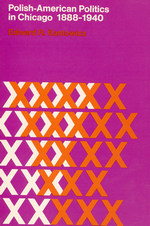 Polish-American Politics in Chicago, 1880-1940
Edward R. Kantowicz
University of Chicago Press, 1975 The "new immigrants" who came from southern and eastern Europe at the turn of the century have rarely been the subject of detailed scholarly examination. In particular, Poles and other Slavic groups have usually been written about in a filiopietist manner. Edward Kantowicz fills this gap with his incisive work on Poles in Chicago.
Kantowicz examines such questions as why Chicago, with the largest Polish population of any city outside of Poland, has never elected a Polish mayor. The author also examines the origins of the heavily Democratic allegiance of Polish voters. Kantowicz demonstrates that Chicago Poles were voting Democratic long before Al Smith, Franklin Roosevelt, or the New Deal.
Kantowicz has made extensive use of registration lists and voting records to construct a statistical picture of Polish-American voting behavior in Chicago. He draws on church records and census records to provide a detailed description of Chicago's many Polish neighborhoods. He also has studied the city's Polish-language press as well as the few manuscript collections left by Polish-American politicians. These collections, together with data gleaned from interviews with individuals who were acquainted with these figures, are used to sketch profiles of the political leaders of Polonia's capital.
Kantowicz focuses on the goals which the Polish-American community pursued in politics, the issues they deemed important, and the functions which politics served for them. He links this analysis to observations on the homeland and the reasons for which the Poles emigrated. In this context he is able to draw conclusions about the nature of the ethnic politics in general. His work will appeal to a variety of readers: urban and twentieth-century historians, political scientists, and sociologists.
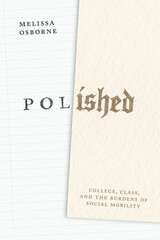 Polished: College, Class, and the Burdens of Social Mobility
Melissa Osborne
University of Chicago Press, 2024 An illuminating look at the emotional costs of mobility faced by first-generation and low-income college students.
While college initiates a major transition in all students’ lives, low-income and first-generation students attending elite schools are often entering entirely new worlds. Amid the financial and academic challenges of adapting to college, their emotional lives, too, undergo a transformation. Surrounded by peers from different classes and cultural backgrounds, they are faced with an impossible choice: turn away from their former lives to blend in or stay true to themselves and remain on the outside.
An ethnography that draws on in-depth interviews with one hundred and fifty first-generation and low-income students across eighteen elite institutions, Polished uncovers the hidden consequences of the promise of social mobility in today’s educational landscape. Sociologist Melissa Osborne reveals how the very support designed to propel first-generation students forward can unexpectedly reshape their identities, often putting them at odds with their peers and families. Without direct institutional support, this emotional journey can lead to alienation, mental health challenges, poor academic outcomes, and difficult choices between upward mobility or maintaining authenticity and community. Whether you're an educator, advocate, or student, Polished provides a powerful perspective on the uncharted challenges of social mobility and personal identity during college.
 Polished: College, Class, and the Burdens of Social Mobility
Melissa Osborne
University of Chicago Press, 2024 This is an auto-narrated audiobook version of this book.
An illuminating look at the emotional costs of mobility faced by first-generation and low-income college students.
While college initiates a major transition in all students’ lives, low-income and first-generation students attending elite schools are often entering entirely new worlds. Amid the financial and academic challenges of adapting to college, their emotional lives, too, undergo a transformation. Surrounded by peers from different classes and cultural backgrounds, they are faced with an impossible choice: turn away from their former lives to blend in or stay true to themselves and remain on the outside.
An ethnography that draws on in-depth interviews with one hundred and fifty first-generation and low-income students across eighteen elite institutions, Polished uncovers the hidden consequences of the promise of social mobility in today’s educational landscape. Sociologist Melissa Osborne reveals how the very support designed to propel first-generation students forward can unexpectedly reshape their identities, often putting them at odds with their peers and families. Without direct institutional support, this emotional journey can lead to alienation, mental health challenges, poor academic outcomes, and difficult choices between upward mobility or maintaining authenticity and community. Whether you're an educator, advocate, or student, Polished provides a powerful perspective on the uncharted challenges of social mobility and personal identity during college.
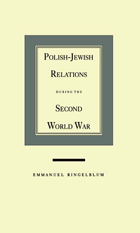 Polish-Jewish Relations During the Second World War
Emmanuel Ringelblum
Northwestern University Press, 1992 A man of towering intellectual accomplishment and extraordinary tenacity, Emmanuel Ringelblum devoted his life to recording the fate of his people at the hands of the Germans. Convinced that he must remain in the Warsaw Ghetto to complete his work, and rejecting an invitation to flee to refuge on the Aryan side, Ringelbaum, his wife, and their son were eventually betrayed to the Germans and killed.
This book represents Ringelbaum's attempt to answer the questions he knew history would ask about the Polish people: what did the Poles do while millions of Jews were being led to the stake? What did the Polish underground do? What did the Government-in-Exile do? Was it inevitable that the Jews, looking their last on this world, should have to see indifference or even gladness on the faces of their neighbors? These questions have haunted Polish-Jewish relations for the last fifty years. Behind them are forces that have haunted Polish-Jewish relations for a thousand years.
Politic Parties in the American Mold
Leon D. Epstein
University of Wisconsin Press, 1989 “The most comprehensive textbook I have read on American political parties. Written before the current partisan impasse, the book does much to clarify the extremely fluid and often fragile structure of our two major parties—parties that, in comparison with their European counterparts, have relatively weak ties to social classes and religious groups.”—New York Review of Books
 Political Action: Key To Understanding Politics
Dick Simpson
Ohio University Press, 1984 Politics and the study of politics are at a watershed. They are deficient because they fail to respond to fundamental crises in our society, fail to incorporate new knowledge from other fields of study, and fail to allow citizens to function as mature human beings shaping their own destiny. Political Action demonstrates the need for a new political science which, in turn, may lead to a new politics more adequate to the problems of this era. Modern political science, as currently studied and practiced, is irrelevant for both public officials and citizens because it fails to focus on political action. Simpson and Beam provide a methodology for the study of political action and demonstrate how the study of political action using these methods provides a better understanding of politics and how these methods aid in identifying effective strategies for building a better America. Without a new focus on political action, political science will remain sterile and without a more humane politics, citizens will remain misinformed, apathetic, and helpless. Political Action is controversial because it challenges the profession of political science. It provides a “paradigm shift” in the field which is important for allied social science disciplines as well. For political strategists, it provides the methodological tool of political action propositions which allow a careful calculation of the effects of alternative strategies.
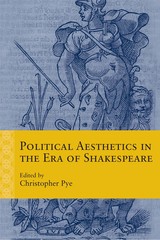 Political Aesthetics in the Era of Shakespeare
Edited by Christopher Pye
Northwestern University Press, 2020 The turn to political concerns in Renaissance studies, beginning in the 1980s, was dictated by forms of cultural materialism that staked their claims against the aesthetic dimension of the work. Recently, however, the more robustly political conception of the aesthetic formulated by theorists such as Theodor Adorno and Jacques Rancière has revitalized literary analysis generally and early modern studies in particular. For these theorists, aesthetics forms the crucial link between politics and the most fundamental phenomenological organization of the world, what Rancière terms the “distribution of the sensible.”
Taking up this expansive conception of aesthetics, Political Aesthetics in the Era of Shakespeare suggests that the political stakes of the literary work—and Shakespeare’s work in particular—extend from the most intimate dimensions of affective response to the problem of the grounds of political society. The approaches to aesthetic thought included in this volume explore the intersections between the literary work and the full range of concerns animating the field today: political philosophy, affect theory, and ecocritical analysis of environs and habitus.
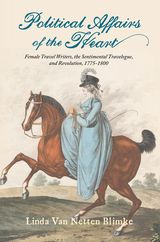 Political Affairs of the Heart: Female Travel Writers, the Sentimental Travelogue, and Revolution, 1775-1800
Linda Van Netten Blimke
Bucknell University Press, 2022 Richly researched and engagingly written, Political Affairs of the Heart traces the emergence of female sentimental travel writing in late eighteenth-century Britain, and posits its centrality to women’s engagement with national and gender politics. This study examines four travel narratives written by women between 1774 and 1795, convincingly arguing that they effectively deploy the discourse of sensibility to engage with debates around Britain’s national identity during the French and American Revolutions. Van Netten Blimke contends that Laurence Sterne’s A Sentimental Journey (1768)—which first introduced sentimental discourse to the travelogue—facilitated women’s gradual inclusion into this previously male-dominated genre, effectively paving the way for women to influence the country’s sociopolitical transformation. These four previously understudied works successfully combine eyewitness authority with the language of sensibility to mount impassioned interventions in their nation’s perception and practice of revolutionary politics, at a time when its national identity was most in flux.
 Political Affect: Connecting the Social and the Somatic
John Protevi
University of Minnesota Press, 2010 For many philosophers, the rational cognitive (Cartesian) subject defines the human, or at least defines what humans should be. Yet some recent cognitive science, as well as the philosophy of Deleuze and Guattari, has called into question such individuality and rationality and emphasized social and emotional subjectivity. Understanding such embodied and embedded subjectivity, John Protevi argues, demands the notion of bodies politic. In Political Affect, Protevi investigates the relationship between the social and the somatic: how our bodies, minds, and social settings are intricately and intimately linked. Bringing together concepts from science, philosophy, and politics, he develops a perspective he calls political physiology to indicate that subjectivity is socially conditioned and sometimes bypassed in favor of a direct connection of the social and the somatic, as with the politically triggered basic emotions of rage and panic. Protevi's treatment of affective cognition in social context breaks new theoretical ground, insisting that subjectivity be studied both in its embodied expression and in terms of the distribution of affective cognitive responses in a population. Moving beyond the theoretical, Protevi applies his concept of political affect to show how unconscious emotional valuing shaped three recent, emotionally charged events: the cold rage of the Columbine High School slayings, the racialized panic that delayed rescue efforts in Hurricane Katrina, and the twists and turns of empathy occasioned by the Terry Schiavo case. These powerful individual and collective political events require new philosophical understanding.
The Political and Economic Transition in East Asia: Strong Market, Weakening State
Xiaoming Huang, Editor
Georgetown University Press, 2001 Since the 1960s, the Asian Tigers have combined economic success and autocratic politics. Now in the wake of a daunting financial crisis, these nations are moving toward political change as well as renewed growth. What direction will these changes take? Will the traditional Asian "development state" give way to the American model of market liberalism? This book explores the complex transitions under way in China, Japan, South Korea, and Taiwan, as the leaderships shift their economic and political relationships in order to survive in the global economy. Written by a team of international scholars in political science, economics, international relations, and Asian studies, this book illuminates the significant changes in the political economies of the major Asian states.
The Political and Social Theory of Max Weber: Collected Essays
Wolfgang J. Mommsen
University of Chicago Press, 1989 Concentrating on Weber's engagement with political issues and their influence over his more theoretical concepts, Mommsen offers a critical analysis of Weber's notion of democracy, distinguishing its liberal and elitist features.
 Political and Social Writings: Volume 1, 1946-1955
Cornelius CastoriadisDavid Ames Curtis, EditorTranslated by David Ames Curtis
University of Minnesota Press, 1988 Political and Social Writings: Volume 1, 1946–1955 was first published in 1988. Minnesota Archive Editions uses digital technology to make long-unavailable books once again accessible, and are published unaltered from the original University of Minnesota Press editions. A series of writings by the man who inspired the students of the Workers' Rebellion in May of 1968. "Given the rapid pace of change in the Soviet Union and Eastern Europe, and the radical nature of these transformations, the work of Cornelius Castoriadis, a consistent and radical critic of Soviet Marxism, gains renewed significance. . . . these volumes are instructive because they enable us to trace his rigorous engagement with the project of socialist construction from his break with Trotskyism to his final breach with Marxism . . . and would be read with profit by all those seeking to comprehend the historical originality of events in the USSR and Eastern Europe." –Contemporary Sociology
 Political and Social Writings: Volume 2, 1955-1960
Cornelius CastoriadisDavid Ames Curtis, EditorTranslated by David Ames Curtis
University of Minnesota Press, 1988 Political and Social Writings:Volume 2, 1955–1960 was first published in 1988. Minnesota Archive Editions uses digital technology to make long-unavailable books once again accessible, and are published unaltered from the original University of Minnesota Press editions. A series of writings by the man who inspired the students of the Workers' Rebellion in May of 1968. "Given the rapid pace of change in the Soviet Union and Eastern Europe, and the radical nature of these transformations, the work of Cornelius Castoriadis, a consistent and radical critic of Soviet Marxism, gains renewed significance....these volumes are instructive because they enable us to trace his rigorous engagement with the project of socialist construction from his break with Trotskyism to his final breach with Marxism. . . and would be read with profit by all those seeking to comprehend the historical originality of events in the USSR and Eastern Europe." –Contemporary Sociology
 Political and Social Writings: Volume 3, 1961-1979
Cornelius CastoriadisDavid Ames Curtis, EditorTranslated by David Ames Curtis
University of Minnesota Press, 1992 Political and Social Writings: Volume 3, 1961–1979 was first published in 1992. Minnesota Archive Editions uses digital technology to make long-unavailable books once again accessible, and are published unaltered from the original University of Minnesota Press editions. This work offers an extraordinary wealth and variety of writings from the crucial years that followed the publication of Castoriadis's landmark text, Modern Capitalism and Revolution. The "new orientation" he proposed for the Socialisme ou Barbarie group centered on the emerging roles of women, youth, and minorities in the growing challenge to established society in the early sixties. Resistance within the group to this new orientation led Castoriadis to criticize the "neopaleo- Marxism" of Jean-François Lyotard and others who ultimately left Socialisme ou Barbarie. A heightened concern for ethnological issues culminated in what might be called, to the embarrassment of today's "poststructuralists," Castoriadis's "premature antistructuralism." Additional texts examine the dissolution of the group itself and analyze the May 1968 rebellion of workers and students - who, according to their own testimony, were inspired by ideas developed in the group's journal. Also included were many of Castoriadis's still-relevant political writings from the seventies, which were developed in tandem with the more explicitly philosophical work now found in The Imaginary Institution of Society and Crossroads in the Labyrinth. Political and Social Writings: Volume 3 provides key elements for a radical renewal of emancipatory thought and action while offering an irreplaceable and hitherto missing perspective on postwar French thought.
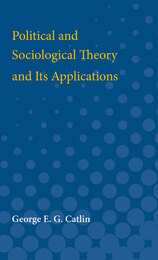 Political and Sociological Theory and Its Applications
George E.G. Catlin
University of Michigan Press, 1964 Today, George E. Gordon Catlin is an outstanding figure in international politics, working at close range with the most important problems of our time. He is one of the architects of the modern British Labour Party, a champion of Indian independence, a leader in the field of peace research, a staunch supporter of closer Anglo-American relations, and a founder of contemporary quantitative political science. His perceptive, often controversial writings are enhanced not only by years of practical political experience but by a refreshing wit and candor.In this hard-headed book Catlin charts a course that will enable nations to wage peace as vigorously as they formerly waged war. He examines the basic structure of modern politics and presents a systematic, scientific analysis of the causes of war. Catlin questions whether or not the national state has become obsolete and traces its development from the 17th century to the present. He emphasizes the limitations of the contemporary national state as an effective tool for solving political and social problems in the Nuclear Age.In simple, straightforward language, Catlin also discusses such subjects as coexistence, the Western Alliance, modern democratic education, the relations of church and state, and the possibility of creating a true world authority, competent to preserve peace. He presents an objective and almost Hobbesian view of the problems confronting modern man, and points the way toward future world peace and social justice.
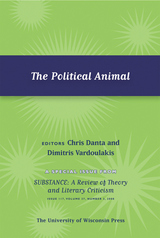 The Political Animal: Special Issue of SubStance, Issue 117, 37:3 (2008)
Chris Danta
University of Wisconsin Press, 2008 In the variegated history of the philosophical definitions of man, one has survived since it has been given the status of the self-evident. The definition in question comes from Aristotle’s Politics: “the human is a political animal” (1253a3). There is something indisputable about this characterization: humans are, indeed, the most social of animals – they are denizens of the polis with its institutions and laws, its rulers, judges and generals. It would be difficult to contend that any other animal has recourse to the political as much as the human.
Aristotle’s Politics need not be surrendered to the strictures of humanism. It remains amenable to the new schema for the political animal that we are sketching here. Each article collected in this issue responds – in its own way and by establishing its own protocols – to the exigency of the animal as it was formulated in Aristotle’s Politics. Each article is an act of response, a moment of interruption.
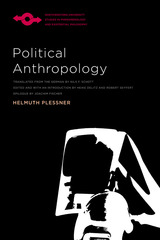 Political Anthropology
Helmuth Plessner, Translated from the German by Nils F. Schott, Edited and with an introduction by Heike Delitz and Robert Seyfert and an epilogue by Joachim Fischer
Northwestern University Press, 2018 In Political Anthropology (originally published in 1931 as Macht und menschliche Natur), Helmuth Plessner considers whether politics—conceived as the struggle for power between groups, nations, and states—belongs to the essence of the human. Building on and complementing ideas from his Levels of the Organic and the Human (1928), Plessner proposes a genealogy of political life and outlines an anthropological foundation of the political. In critical dialogue with thinkers such as Carl Schmitt, Eric Voegelin, and Martin Heidegger, Plessner argues that the political relationships cultures entertain with one other, their struggle for acknowledgement and assertion, are expressions of certain possibilities of the openness and unfathomability of the human. Translated into English for the first time, and accompanied by an introduction and an epilogue that situate Plessner's thinking both within the context of Weimar-era German political and social thought and within current debates, this succinct book should be of great interest to philosophers, political theorists, and sociologists interested in questions of power and the foundations of the political.
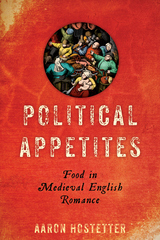 Political Appetites: Food in Medieval English Romance
Aaron Hostetter
Ohio State University Press, 2017 Political Appetites: Food in Medieval English Romance is the first book-length examination of the cultural and theoretical resonances of food and cooking in medieval English literature, offering a new assessment of the vexed and critically underappreciated genre of romance. Aaron Hostetter moves beyond the critical assumptions of the food practices of medieval English culture as only reflecting Eucharistic preoccupations. Focusing on the romance literature of England, from tenth-century hagiographic verse to fifteenth-century courtly adventures, he also engages the politics of secular eating. Focus on the edible allows Political Appetites to apply fresh insights from cultural studies and critical theory to these narratives—to adumbrate their unique political perspectives. The analysis of food reveals these stories to be sophisticated responses to the material and political conditions of their day.
If humanity has attempted through its brief history to render the material world edible, then food and food practice not only influence our aspirations but also shift focus to the limits of human existence on this planet. In studying the foodways of the past as a fundamental economic activity, Political Appetites questions contemporary attitudes towards consumption as their proliferation and abuses create social inequities, menace ecosystems, and threaten to bring about the end of the Anthropocene Era.
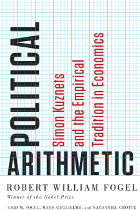 Political Arithmetic: Simon Kuznets and the Empirical Tradition in Economics
Robert William Fogel, Enid M. Fogel, Mark Guglielmo, and Nathaniel Grotte
University of Chicago Press, 2013 We take for granted today that the assessments, measurements, and forecasts of economists are crucial to the decision-making of governments and businesses alike. But less than a century ago that wasn’t the case—economists simply didn’t have the necessary information or statistical tools to understand the ever more complicated modern economy.
With Political Arithmetic, Nobel Prize–winning economist Robert Fogel and his collaborators tell the story of economist Simon Kuznets, the founding of the National Bureau of Economic Research, and the creation of the concept of GNP, which for the first time enabled us to measure the performance of entire economies. The book weaves together the many strands of political and economic thought and historical pressures that together created the demand for more detailed economic thinking—Progressive-era hopes for activist government, the production demands of World War I, Herbert Hoover’s interest in business cycles as President Harding’s commerce secretary, and the catastrophic economic failures of the Great Depression—and shows how, through trial and error, measurement and analysis, economists such as Kuznets rose to the occasion and in the process built a discipline whose knowledge could be put to practical use in everyday decision-making.
The product of a lifetime of studying the workings of economies and skillfully employing the tools of economics, Political Arithmetic is simultaneously a history of a key period of economic thought and a testament to the power of applied ideas.
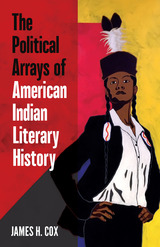 The Political Arrays of American Indian Literary History
James H. Cox
University of Minnesota Press, 2019 Bringing fresh insight to a century of writing by Native Americans
The Political Arrays of American Indian Literary History challenges conventional views of the past one hundred years of Native American writing, bringing Native American Renaissance and post-Renaissance writers into conversation with their predecessors. Addressing the political positions such writers have adopted, explored, and debated in their work, James H. Cox counters what he considers a “flattening” of the politics of American Indian literary expression and sets forth a new method of reading Native literature in a vexingly politicized context.
Examining both canonical and lesser-known writers, Cox proposes that scholars approach these texts as “political arrays”: confounding but also generative collisions of conservative, moderate, and progressive ideas that together constitute the rich political landscape of American Indian literary history. Reviewing a broad range of genres including journalism, short fiction, drama, screenplays, personal letters, and detective fiction—by Lynn Riggs, Will Rogers, Sherman Alexie, Thomas King, Leslie Marmon Silko, Louise Erdrich, Winona LaDuke, Carole laFavor, and N. Scott Momaday—he demonstrates that Native texts resist efforts to be read as advocating a particular set of politics Meticulously researched, The Political Arrays of American Indian Literary History represents a compelling case for reconceptualizing the Native American Renaissance as a literary–historical constellation. By focusing on post-1968 Native writers and texts, argues Cox, critics have often missed how earlier writers were similarly entangled, hopeful, frustrated, contradictory, and unpredictable in their political engagements.
Political Aspects of Social Indicators: Implications for Research
Peter J. Henriot
Russell Sage Foundation, 1972 Complementing the focus on the structural and social-psychological aspects of measuring social change, this report establishes a research approach relating social measurement to antecedent and consequent political considerations: political values, policy impact, power consequences, administrative influences, institutionalization, and so forth. This study is directed to any social scientist interested in political phenomena and in the issue of the relationship between social science and public policy.
Political Attitudes in Venezuela: Societal Cleavages and Political Opinion
By Enrique A. Baloyra and John D. Martz
University of Texas Press, 1979 Here is a benchmark study of voter attitudes in a Latin American country. This volume is based on extensive survey research conducted during the Venezuelan elections of 1973. The methods employed by Baloyra and Martz to poll an "unpollable" society successfully challenge previously established paradigms. The authors interviewed a representative sample of over 1,500 voters to determine relationships between class, status, community, context, religion, ideology, and partisanship on the one hand and political attitudes and preferences on the other. They found that the Venezuelan electorate is defined by a series of contradictory tendencies, and they place their conclusions in the context of contemporary political science literature regarding class and party, ideology and party, and inequality and participation.
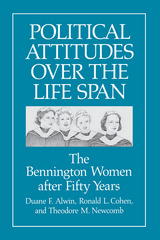 Political Attitudes over the Life Span: The Bennington Women after Fifty Years
Duane F. Alwin
University of Wisconsin Press, 1992 The culmination of one of the most famous long-term studies in American sociology, this examination of political attitudes among women who attended Bennington College in the 1930s and 1940s now spans five decades, from late adolescence to old age. Theodore Newcomb’s 1930s interviews at Bennington, where the faculty held progressive views that contrasted with those of the conservative families of the students, showed that political orientations are still quite malleable in early adulthood. The studies in 1959-60 and 1984 show the persistence of political attitudes over the adult life span: the Bennington women, raised in conservative homes, were liberalized in their college years and have remained politically involved and liberal in their views, even in their sixties and seventies.
Here the authors analyze the earlier studies and then introduce the 1984 data. Using data from National Election Studies for comparison, they show that the Bennington group is more liberal and hold its opinions more intensely than both older and younger Americans, with the exception of the generation that achieved political maturity in the 1960s. The authors point out that the majority of the Bennington women’s children are of this 1945–54 generation and suggest that this factor played an important role in the stability of the women’s political views. Within their own generation, the Bennington women also appear to hold stronger political views than other college-educated women.
Innovative in its methodology and extremely rich in its data, this work will contribute to developmental and social psychology, sociology, political science, women’s studies, and gerontology.
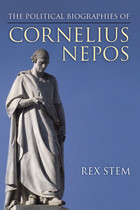 The Political Biographies of Cornelius Nepos
Rex Stem
University of Michigan Press, 2012 The Roman writer Cornelius Nepos was a friend of Cicero and Catullus and other first-century BCE authors, and portions of his encyclopedic work On Famous Men are the earliest surviving biographies written in Latin. In The Political Biographies of Cornelius Nepos, Rex Stem presents Nepos as a valuable witness to the late Republican era, whose biographies share the exemplary republican political perspective of his contemporaries Cicero and Livy. Stem argues that Nepos created the genre of grouped political biographies in order to characterize renowned Mediterranean figures as role models for Roman leaders, and he shows how Nepos invested his biographies with moral and political arguments against tyranny. This book, the first to regard Nepos as a serious thinker in his own right, also functions as a general introduction to Nepos, placing him in his cultural context. Stem examines Nepos' contributions to the growth of biography, and he defends Nepos from his critics at the same time that he lays out the political significance and literary innovation of Nepos' writings. Accessible to advanced undergraduates, this volume is addressed to a general audience of classicists and ancient historians, as well as those broadly interested in biography, historiography, and political thought.
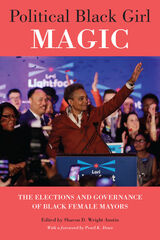 Political Black Girl Magic: The Elections and Governance of Black Female Mayors
Edited by Sharon D. Wright Austin
Temple University Press, 2023 Political Black Girl Magic explores black women’s experiences as mayors in American cities. The editor and contributors to this comprehensive volume examine black female mayoral campaigns and elections where race and gender are a factor—and where deracialized campaigns have garnered candidate support from white as well as Hispanic and Asian American voters. Chapters also consider how Black female mayors govern, from discussions of their pursuit of economic growth and how they use their power to enact positive reforms to the challenges they face that inhibit their abilities to cater to neglected communities.
Case studies in this interdisciplinary volume include female mayors in Atlanta, Baltimore, Charlotte, Chicago, Compton, and Washington, DC, among other cities, along with discussion of each official’s political context. Covering mayors from the 1960s to the present, Political Black Girl Magic identifies the most significant obstacles black women have faced as mayors and mayoral candidates, and seeks to understand how race, gender, or the combination of both affected them.
Contributors: Andrea Benjamin, Nadia E. Brown, Pearl K. Dowe, Christina Greer, Precious Hall, Valerie C. Johnson, Yolanda Jones, Lauren King, Angela K. Lewis-Maddox, Minion K.C. Morrison, Marcella Mulholland, Stephanie A. Pink-Harper, Kelly Briana Richardson, Emmitt Y. Riley, III, Ashley Robertson Preston, Taisha Saintil, Jamil Scott, Fatemeh Shafiei, James Lance Taylor, LaRaven Temoney, Linda Trautman, and the editor
 The Political Brain: The Emergence of Neuropolitics
Matt Qvortrup
Central European University Press, 2024 We have politics on our mind—or, rather, we have politics in different parts of our brains. In this path-breaking study, Matt Qvortrup takes the reader on a whistle stop tour through the fascinating, and sometimes frightening, world of neuropolitics; the discipline that combines neuroscience and politics, and is even being used to win elections. Putting the 'science' back into political science, The Political Brain shows how fMRI-scans can identify differences between Liberals and Conservatives, can predict our behaviour with sometimes greater accuracy than surveys, and can explain the biology of uprisings, revolutions, and wars. Not merely a study of empirical evidence, the book shows how the philosophical theories of, among others, Plato, Aristotle, and Spinoza can be supported by brain scans. Along the way, it also provides an overview of the state-of-the-art knowledge of the organ that shapes our politics. The book shows that if we rely on evolutionary primitive parts of the midbrain—those engaged when we succumb to polarised politics—we stand in danger of squandering the gains we made through the last eight million years.
Political Business Cycles: The Political Economy of Money, Inflation, and Unemployment
Thomas D. Willett, ed.
Duke University Press, 1988 The "political business cycle", according to economist William Nordhaus, creates a situation in which political and bureaucratic incentives create artificial economic booms just before elections, with consequent and deleterious side effects after the ballots are counted. This work examines the issue of whether federal governmental structure inevitably leaves the U.S. economy exposed to unhealthy political influences.
 Political Careers, Corruption, and Impunity: Panama's Assembly, 1984-2009
Carlos Guevara Mann
University of Notre Dame Press, 2011
In Political Careers, Corruption, and Impunity: Panama's Assembly, 1984-2009, Carlos Guevara Mann systematically examines the behavior of the members of Panama’s Legislative Assembly between 1984 and 2009, an arena previously unexplored in studies of Panamanian politics. He challenges fundamental aspects of scholarly literature on democratic legislatures, with important consequences for understanding democratic politics in Latin America and other parts of the world. The current literature on legislatures assumes that legislators single-mindedly seek reelection or the advancement of their political careers, and that they pursue these goals through acceptable democratic means. Guevara Mann shows, however, that in Panama many legislators also pursue less laudable goals such as personal enrichment and freedom from prosecution, often reaching their goals through means—widespread clientelism, party switching, and electoral manipulation—that undermine the quality of democracy.
On one level, Political Careers, Corruption, and Impunity contrasts the political behavior of individual legislators; on another, it compares the actions of legislators under various regimes—military and constitutional. Lastly, it engages in cross-national comparisons that contrast the behavior of Panamanian legislators with actions of representatives elsewhere. Guevara Mann's sophisticated analysis of the military period and the transition to democracy, with an emphasis on the history and functioning of legislative bodies, contains a wealth of new information about a neglected but intrinsically fascinating case.
“Carlos Guevara Mann’s Political Careers, Corruption, and Impunity: Panama’s Assembly, 1984-2009 is a significant contribution both substantively and theoretically. Beyond the importance of now having a study of Panamanian legislators and legislature, Guevara Mann’s book also contributes to theories of legislator behavior by underscoring other goals that legislators have and exploring how the tools often used by legislators in other societies are differently used in the Panamanian context. Well-structured and extraordinarily well-written, with an impressive research scope, his book provides a preliminary step in theory building that will be very useful to other scholars.” —Peter M. Siavelis, Wake Forest University
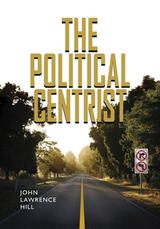 The Political Centrist
John Lawrence Hill
Vanderbilt University Press, 2009 Today almost half of all Americans decline to define themselves as either "liberal" or "conservative." In fact, modern liberalism and conservatism seem hopelessly fragmented ideologies. Liberals claim to believe in individual freedom yet advocate a more collectivistic approach to government and an increasingly paternalistic role for the state. Conservatives are hopelessly divided between two incompatible ideals--the highly individualistic, limited-state philosophy of classical liberalism and an older, more collectivistic tradition of cultural conservatism that holds government responsible for shaping social morality. As a result, modern liberals are economic collectivists and moral individualists, while conservatives are economic individualists and moral collectivists.
Centrists reject each of these fragmented and polarized approaches to politics. We believe that government has a role to play in structuring social and economic opportunities and in reinforcing basic moral norms, yet we are deeply troubled by ever-expanding government. We reject libertarianism, left-liberalism, and the various schools of conservatism as a model for government.
Part I of The Political Centrist briefly traces the trajectory of the liberal and conservative traditions. It argues that modern liberalism is an unprincipled fusion of classical liberal and socialist ideals while modern conservatism is an untenable hybrid of economic liberalism and social conservatism. Part II offers a centrist approach to many of the most contentious contemporary political and social issues. Those include:
-- abortion
-- affirmative action
-- the death penalty
-- gay marriage
-- illegal immigration
-- judicial activism
-- the relationship of religion and politics
-- the role of government in the economy
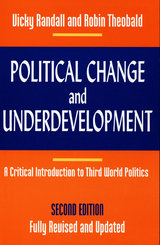 Political Change and Underdevelopment: A Critical Introduction to Third World Politics
Vicky Randall and Robin Theobald
Duke University Press, 1998 In this completely revised second edition, Vicky Randall and Robin Theobald review the principal theoretical approaches to the postwar study of Third World politics. Instead of undergoing Western-model modernization as predicted, developing countries have seen the proliferation of one-party states, military coups, communal violence, corruption, and economic dependence. Randall and Theobald survey and analyze the varied theories born of these developments, with examples from such nations as Chile, Indonesia, Pakistan, Syria, Ghana, Nigeria, and Tanzania. This second edition has been expanded to include discussions of the international debt crisis, the impact of globalization on the postcolonial world, the rise of newly industrialized countries, and the upsurge in religion-based conflict in the post–Cold War era. Describing the strengths and weaknesses of the existing interpretive approaches to these issues, the authors explore the often difficult relationship between political change and economic development. At the same time they provide a comprehensive view into the turbulent politics of the Third World and suggest how future analysis can build on present approaches to reflect political reality more fully.
An essential text for students of political science and Third World societies, this volume will also interest anyone seeking a clearer understanding of the current issues underlying the politics of these countries.
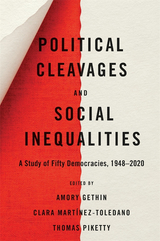 Political Cleavages and Social Inequalities: A Study of Fifty Democracies, 1948–2020
Amory Gethin
Harvard University Press, 2021 The empirical starting point for anyone who wants to understand political cleavages in the democratic world, based on a unique dataset covering fifty countries since World War II.
Who votes for whom and why? Why has growing inequality in many parts of the world not led to renewed class-based conflicts, seeming instead to have come with the emergence of new divides over identity and integration? News analysts, scholars, and citizens interested in exploring those questions inevitably lack relevant data, in particular the kinds of data that establish historical and international context. Political Cleavages and Social Inequalities provides the missing empirical background, collecting and examining a treasure trove of information on the dynamics of polarization in modern democracies.
The chapters draw on a unique set of surveys conducted between 1948 and 2020 in fifty countries on five continents, analyzing the links between voters’ political preferences and socioeconomic characteristics, such as income, education, wealth, occupation, religion, ethnicity, age, and gender. This analysis sheds new light on how political movements succeed in coalescing multiple interests and identities in contemporary democracies. It also helps us understand the conditions under which conflicts over inequality become politically salient, as well as the similarities and constraints of voters supporting ethnonationalist politicians like Narendra Modi, Jair Bolsonaro, Marine Le Pen, and Donald Trump.
Bringing together cutting-edge data and historical analysis, editors Amory Gethin, Clara Martínez-Toledano, and Thomas Piketty offer a vital resource for understanding the voting patterns of the present and the likely sources of future political conflict.
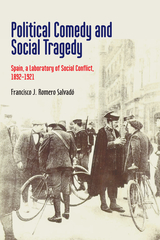 Political Comedy and Social Tragedy: Spain, a Laboratory of Social Conflict, 1892–1921
Franciso Romero Salvadó
Sussex Academic Press, 2022 This book analyses the troubled and often violent path of Spain to modernity. During the nearly 30 years of history explored (18921921), the country appeared to be caught in a kind of Groundhog Day. It was rocked in the 1890s by an ill-fated colonial adventure and a spiral of anarchist terrorism and praetorian-led repression, mostly in Barcelona, which culminated with the murder of the Conservative prime minister Antonio Cnovas in August 1897. Twenty-four years later, Spain was undergoing a similar set of circumstances: a military quagmire in Morocco and vicious social warfare, with its epicentre in the Catalan capital, which resulted in the killing of then Conservative prime minister Eduardo Dato in March 1921. The chronological framework highlights the gradual crisis, but also resilience of the ruling Restoration Monarchy. Francisco Romero Salvad pursues the thesis that this crisis could be largely explained by focusing on the correlation between two apparently contradictory conceptual terms, but which in fact proved to be supplementary: the extent to which the persistence of the political comedy embodied by an unreformed liberal but oligarchic order perpetuated a social tragedy. Notwithstanding the peculiarity of the author's approach, this study rejects any notion of determinism or exceptionalism. On the contrary, Spain was not an extraordinary case within the European context, but constituted a laboratory par excellence of the turmoil which marked this age.
Political Communication in Chinese and European History, 800-1600
Hilde De Weerdt
Amsterdam University Press, 2021 Based on a collaboration between historians of Chinese and European politics, Political Communication in Chinese and European History, 800-1600 offers a first comprehensive overview of current research on political communication in middle-period European and Chinese history. The chapters present new work on the sources and processes of political communication in European and Chinese history partly through juxtaposing and combining formerly separate historiographies and partly through direct comparison. Contrary to earlier comparative work on empires and state formation, which aimed to explain similarities and differences with encompassing models and new theories of divergence, the goal is to further conversations between historians by engaging regional historiographies from the bottom up.
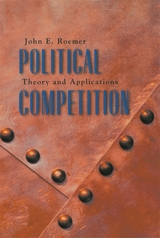 Political Competition: Theory and Applications
John E. Roemer
Harvard University Press, 2001 In this book, John Roemer presents a unified and rigorous theory of political competition between parties. He models the theory under many specifications, including whether parties are policy oriented or oriented toward winning, whether they are certain or uncertain about voter preferences, and whether the policy space is uni- or multidimensional. He examines all eight possible combinations of these choice assumptions, and characterizes their equilibria.
He fleshes out a model in which each party is composed of three different factions concerned with winning, with policy, and with publicity. Parties compete with one another. When internal bargaining is combined with external competition, a natural equilibrium emerges, which Roemer calls party-unanimity Nash equilibrium.
Assuming only the distribution of voter preferences and the endowments of the population, he deduces the nature of the parties that will form. He then applies the theory to several empirical puzzles, including income distribution, patterns of electoral success, and why there is no labor party in the United States.
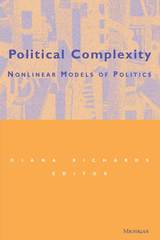 Political Complexity: Nonlinear Models of Politics
Diana Richards, Editor
University of Michigan Press, 2000 This collection illustrates how nonlinear methods can provide new insight into existing political questions. Politics is often characterized by unexpected consequences, sensitivity to small changes, non-equilibrium dynamics, the emergence of patterns, and sudden changes in outcomes. These are all attributes of nonlinear processes. Bringing together a variety of recent nonlinear modeling approaches, Political Complexity explores what happens when political actors operate in a dynamic and complex social environment.
The contributions to this collection are organized in terms of three branches within non-linear theory: spatial nonlinearity, temporal nonlinearity, and functional nonlinearity. The chapters advance beyond analogy towards developing rigorous nonlinear models capable of empirical verification.
Contributions to this volume cover the areas of landscape theory, computational modeling, time series analysis, cross-sectional analysis, dynamic game theory, duration models, neural networks, and hidden Markov models. They address such questions as: Is international cooperation necessary for effective economic sanctions? Is it possible to predict alliance configurations in the international system? Is a bureaucratic agency harder to remove as time goes on? Is it possible to predict which international crises will result in war and which will avoid conflict? Is decentralization in a federal system always beneficial?
The contributors are David Bearce, Scott Bennett, Chris Brooks, Daniel Carpenter, Melvin Hinich, Ken Kollman, Susanne Lohmann, Walter Mebane, John Miller, Robert E. Molyneaux, Scott Page, Philip Schrodt, and Langche Zeng.
This book will be of interest to a broad group of political scientists, ranging from those who employ nonlinear methods to those curious to see what it is about. Scholars in other social science disciplines will find the new methodologies insightful for their own substantive work.
Diana Richards is Associate Professor of Political Science, University of Minnesota.
Political Conduct
Mark Philp
Harvard University Press, 2007 This book explores how the processes and practices of politics shape political values, such as liberty, justice, equality, and democracy. Mining the history of political episodes and political thinkers, including Caesar and Machiavelli, Mark Philp argues that it is through political activity that "values are articulated and embraced, and they become powerful motivating forces."
Political Conduct is thus an attempt to inform and enrich political theory--to show that its principles would be more relevant to actual politics if they were immersed in history and practice. Philp argues for a separation between moral and political philosophy and proposes that a less abstract and ideal approach to political philosophy than that provided by Rawls, Dworkin, Nagel, and Cohen would be more useful in illuminating the conduct of politicians and the limitations on what they can achieve.
 Political Consequences of Crony Capitalism inside Russia
Gulnaz Sharafutdinova
University of Notre Dame Press, 2011
This book examines the coexistence of crony capitalism and traditionally democratic institutions such as political competition and elections in Russia after the collapse of communism. The combination, Gulnaz Sharafutdinova argues, has produced a distinct pattern of political evolution in contemporary Russia. Elections are meant to ensure government accountability and allow voters to elect a government responsive to their needs, but in postcommunist Russia the institutional forms of democracy did not result in the expected outcomes. Instead, democratic institutions in the context of crony capitalism--in which informal elite groups dominate policy making, and preferential treatment from the state, not market forces, is crucial to amassing and holding wealth--were widely devalued and discredited.
As Sharafutdinova demonstrates, especially through her close scrutiny of elections in two regions of Russia, Nizhnii Novgorod and the Republic of Tatarstan, crony capitalism made elections especially intense struggles among the elites. Massive amounts of money flowed into campaigns to promote candidates by discrediting their rivals, money purchased candidates and power, and elites thereby solidified their control. As a result, the majority of citizens perceived elections as the means for the elite to access power and wealth rather than as expressions of public will. Through her detailed case studies and her analyses of contemporary Russia in general, Sharafutdinova argues persuasively that the turn toward authoritarianism associated with Vladimir Putin and supported by a majority of Russian citizens was a negative political response to the interaction of electoral processes and crony capitalism.
"This is one of the most interesting and well-argued books I have read recently on the question of democracy in Russia, and its bold thesis is likely to appeal well beyond students of Russia to the much larger number of readers (and students) interested in general questions of democratization and problems of corruption." --Henry Hale, George Washington University
"Gulnaz Sharafutdinova explores the development of crony capitalism in Russia, based on the contrasting cases of Tatarstan and Nizhnii Novgorod. She argues that the corruption which accompanied the market transition seeped over into electoral politics, and was a major factor in undermining popular support for democratic institutions. This finding is a challenge to transition theory, which posits that democracy and capitalism work hand in hand. Few scholars have tackled the question of exactly how and why Russian democracy eroded as quickly as it sprang up. Sharafutdinova's book is an important contribution to that debate." --Peter Rutland, Wesleyan University
"This well-argued and convincingly documented book will be of interest to scholars of Russian politics, and corruption more broadly, as well as to policymakers interested in getting an overview of the logic of the Yeltsin years and the Putin response." --Anna Grzymala-Busse, University of Michigan
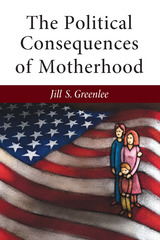 The Political Consequences of Motherhood
Jill S. Greenlee
University of Michigan Press, 2015 From civically and politically engaged women linking their identity as “mothers” to their fight for prohibition, public sanitation, and protective labor laws to the general call to arms of “mama grizzlies” issued by Sarah Palin in 2010, American political activists and candidates have used motherhood to rally women’s interest, support, and participation throughout American history. Politicized motherhood persists, and motherhood continues to inspire women’s participation and direct their concerns. In The Political Consequences of Motherhood, Jill S. Greenlee investigates the complex relationship between motherhood and women’s political attitudes. Combining a historical overview of the ways motherhood has been used for political purposes with recent political opinion surveys and individual-level analysis, she explains how and when motherhood shapes women’s thoughts and preferences. Greenlee argues that two mechanisms account for the durability of motherhood politics. First, women experience attitudinal shifts when they become mothers. Second, “mother” is a broad-based identity, widely shared and ideologically unconstrained, that lends itself to appeals across the political spectrum to build support for candidates and policy issues.
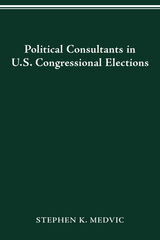 POLITICAL CONSULTANTS IN US CONGRESS ELECTIONS
STEPHEN K. MEDVIC
Ohio State University Press, 2001 Campaign consultants are arguably now as famous in the United States as the politicians themselves. During the past decade, those who know the names Bill Clinton, George Bush, Newt Gingrich, and Christine Todd Whitman also recognize the names James Carville, Mary Matalin, Frank Luntz, and Ed Rollins. Professional consultants, once part of the privileged inner circle of presidential and gubernatorial candidates, are increasingly found at all levels of politics. Indeed, more than half of congressional candidates hire campaign consultants. These professional have become as important to a candidate's success as money. In this innovative study, Stephen K. Medvic explores all aspects of political consultancy and develops an empirically based theory that ensures the impact consultants have on elections.
Political Consultants in U.S. Congressional Elections answers two simple questions: What do professional political consultants do? and How successful are they? Medvic analyzes the way consultants shape political dialogue and uses empirical data to show the benefits—and limits—of a consultant's involvement in a campaign. He focuses on issues as diverse as vote shares, outcomes, and fundraising. Finally, the author demonstrates how the adversarial nature of campaigns fosters the kind of electioneering advocated by most political consultants and argues that this process may not be as harmful for the country as is often suggested.
Political Corruption in Transition: A Sceptic's Handbook
András Sajó
Central European University Press, 2002 Based on two international conferences at Princeton University and the Central European University, this is a handy guide to the problem of corruption in transition countries, with an important comparative content. Political Corruption in Transition is distinguished from similar publications by at least two features: by the quality of the carefully selected and edited essays ans by its original treatment. Instead of the usual preaching and excommunications, this Skeptic`s Handbook represents down-to-earth realism. Combines general issues with case studies and original research. The geographic coverage is wide, though it is ideas rather than a geography that drive the volume`s organization.
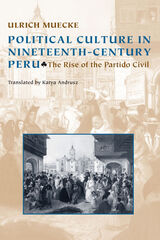 Political Culture in Nineteenth-Century Peru: The Rise of the Partido Civil
Ulrich Muecke
University of Pittsburgh Press, 2004
In the mid-nineteenth century, Peru underwent a profound transformation. As the world economy became increasingly integrated, a new trade-based ruling class emerged. Elections led to political mobilization, and those in positions of national authority found themselves forced to negotiate with regional power brokers and lower social classes.
Central to this transformation was the creation of the Partido Civil, the country’s first modern political party. Tracing its development, Ulrich Muecke revisits virtually every aspect of nineteenth-century Peruvian society.
By exploring the different forms of political action and their symbolic meanings, Muecke offers a new interpretation of the legitimization and construction of political power in Latin America of the 1800s. Using sophisticated theory and based on a wealth of primary research, the book provides insights into elections, the voting process, and power relations throughout the region.
The Political Culture of the American Whigs
Daniel Walker Howe
University of Chicago Press, 1984 Howe studies the American Whigs with the thoroughness so often devoted their party rivals, the Jacksonian Democrats. He shows that the Whigs were not just a temporary coalition of politicians but spokesmen for a heritage of political culture received from Anglo-American tradition and passed on, with adaptations, to the Whigs' Republican successors. He relates this culture to both the country's economic conditions and its ethnoreligious composition.
The Political Culture of the Sister Republics, 1794-1806: France, the Netherlands, Switzerland, and Italy
Edited by Joris Oddens, Mart Rutjes, and Erik Jacobs
Amsterdam University Press, 2015 Leading historians of the French, Batavian, Helvetic, Cisalpine and Neapolitan revolutions bridge the gap between the historiographies of the so-called 'Sister' Republics. They explore political culture as a set of discourses or political practices. Parliamentary practices, the comparability of 'universal' political concepts, late-eighteenth century Republicanism, the relationship between press and politics, and the interaction between the Sister Republics and France are studied from a comparative, transnational perspective.
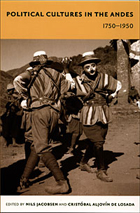 Political Cultures in the Andes, 1750-1950
Nils Jacobsen and Cristóbal Aljovín de Losada, eds.
Duke University Press, 2005 A major contribution to debates about Latin American state formation, Political Cultures in the Andes brings together comparative historical studies focused on Colombia, Ecuador, Bolivia, and Peru from the mid-eighteenth century to the mid-twentieth. While highlighting patterns of political discourse and practice common to the entire region, these state-of-the-art histories show how national and local political cultures depended on specific constellations of power, gender and racial orders, processes of identity formation, and socioeconomic and institutional structures. The contributors foreground the struggles over democracy and citizens’ rights as well as notions of race, ethnicity, gender, and class that have been at the forefront of political debates and social movements in the Andes since the waning days of the colonial regime some two hundred years ago. Among the many topics they consider are the significance of the Bourbon reform era to subsequent state-formation projects, the role of race and nation in the work of early-twentieth-century Bolivian intellectuals, the fiscal decentralization campaign in Peru following the devastating War of the Pacific in the late nineteenth century, and the negotiation of the rights of “free men of all colors” in Colombia’s Atlantic coast region during the late colonial period. Political Cultures in the Andes includes an essay by the noted Mexicanist Alan Knight in which he considers the value and limits of the concept of political culture and a response to Knight’s essay by the volume’s editors, Nils Jacobsen and Cristóbal Aljovín de Losada. This important collection exemplifies the rich potential of a pragmatic political culture approach to deciphering the processes involved in the formation of historical polities. Contributors. Cristóbal Aljovín de Losada, Carlos Contreras, Margarita Garrido, Laura Gotkowitz, Aline Helg, Nils Jacobsen, Alan Knight, Brooke Larson, Mary Roldan, Sergio Serulnikov, Charles F. Walker, Derek Williams
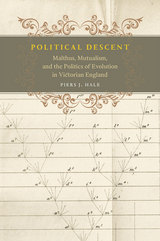 Political Descent: Malthus, Mutualism, and the Politics of Evolution in Victorian England
Piers J. Hale
University of Chicago Press, 2014 Historians of science have long noted the influence of the nineteenth-century political economist Thomas Robert Malthus on Charles Darwin. In a bold move, Piers J. Hale contends that this focus on Malthus and his effect on Darwin’s evolutionary thought neglects a strong anti-Malthusian tradition in English intellectual life, one that not only predated the 1859 publication of the Origin of Species but also persisted throughout the Victorian period until World War I. Political Descent reveals that two evolutionary and political traditions developed in England in the wake of the 1832 Reform Act: one Malthusian, the other decidedly anti-Malthusian and owing much to the ideas of the French naturalist Jean Baptiste Lamarck.
These two traditions, Hale shows, developed in a context of mutual hostility, debate, and refutation. Participants disagreed not only about evolutionary processes but also on broader questions regarding the kind of creature our evolution had made us and in what kind of society we ought therefore to live. Significantly, and in spite of Darwin’s acknowledgement that natural selection was “the doctrine of Malthus, applied to the whole animal and vegetable kingdoms,” both sides of the debate claimed to be the more correctly “Darwinian.” By exploring the full spectrum of scientific and political issues at stake, Political Descent offers a novel approach to the relationship between evolution and political thought in the Victorian and Edwardian eras.
The Political Development of American Debt Relief
Emily Zackin and Chloe N. Thurston
University of Chicago Press, 2024 A political history of the rise and fall of American debt relief. Americans have a long history with debt. They also have a long history of mobilizing for debt relief. Throughout the nineteenth century, indebted citizens demanded government protection from their financial burdens, challenging readings of the Constitution that exalted property rights at the expense of the vulnerable. Their appeals shaped the country’s periodic experiments with state debt relief and federal bankruptcy law, constituting a pre-industrial safety net. Yet, the twentieth century saw the erosion of debtor politics and the eventual retrenchment of bankruptcy protections. The Political Development of American Debt Relief traces how geographic, sectoral, and racial politics shaped debtor activism over time, enhancing our understanding of state-building, constitutionalism, and social policy.
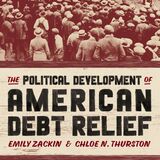 The Political Development of American Debt Relief
Emily Zackin and Chloe N. Thurston
University of Chicago Press, 2024 This is an auto-narrated audiobook version of this book.
A political history of the rise and fall of American debt relief. Americans have a long history with debt. They also have a long history of mobilizing for debt relief. Throughout the nineteenth century, indebted citizens demanded government protection from their financial burdens, challenging readings of the Constitution that exalted property rights at the expense of the vulnerable. Their appeals shaped the country’s periodic experiments with state debt relief and federal bankruptcy law, constituting a pre-industrial safety net. Yet, the twentieth century saw the erosion of debtor politics and the eventual retrenchment of bankruptcy protections. The Political Development of American Debt Relief traces how geographic, sectoral, and racial politics shaped debtor activism over time, enhancing our understanding of state-building, constitutionalism, and social policy.
 Political Disappointment: A Cultural History from Reconstruction to the AIDS Crisis
Sara Marcus
Harvard University Press, 2023 “Marcus shows the ways in which Black activists and writers, in particular, have continued to express their political desires. In doing so, she draws our attention to the centrality of disappointment in American political life.”
—Keeanga-Yamahtta Taylor, New Yorker
“Political Disappointment is an abundant text, overflowing with Sara Marcus’s considerable gifts. She is adept at presenting history and narrative with equal clarity; her writing is urgent but also optimistic. This is a book that is sometimes painful but never sacrifices hope or beauty.”
—Hanif Abdurraqib
Moving from the aftermath of Reconstruction through the AIDS crisis, a new cultural history of the United States shows how artists, intellectuals, and activists turned political disappointment—the unfulfilled desire for change—into a basis for solidarity.
Sara Marcus argues that the defining texts in twentieth-century American cultural history are records of political disappointment. Through insightful and often surprising readings of literature and sound, Marcus offers a new cultural history of the last century, in which creative minds observed the passing of moments of possibility, took stock of the losses sustained, and fostered intellectual revolutions and unexpected solidarities.
Political Disappointment shows how, by confronting disappointment directly, writers and artists helped to produce new political meanings and possibilities. Marcus first analyzes works by W. E. B. Du Bois, Charles Chesnutt, Pauline Hopkins, and the Fisk Jubilee Singers that expressed the anguish of the early Jim Crow era, during which white supremacy thwarted the rebuilding of the country as a multiracial democracy. In the ensuing decades, the Popular Front work songs and stories of Lead Belly and Tillie Olsen, the soundscapes of the civil rights and Black Power movements, the feminist poetry of Audre Lorde and Adrienne Rich, and the queer art of Marlon Riggs and David Wojnarowicz continued building the century-long archive of disappointment. Marcus shows how defeat time and again gave rise to novel modes of protest and new forms of collective practice, keeping alive the dream of a better world.
Disappointment has proved to be a durable, perhaps even inevitable, feature of the democratic project, yet so too has the resistance it precipitates. Marcus’s unique history of the twentieth century reclaims the unrealized desire for liberation as a productive force in American literature and life.
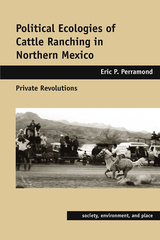 Political Ecologies of Cattle Ranching in Northern Mexico: Private Revolutions
Eric P. Perramond
University of Arizona Press, 2010 Private ranchers survived the Mexican Revolution and the era of agrarian reforms, and they continue to play key roles in the ecology and economy of northern Mexico.
In this study of the Río Sonora region of northern Mexico, where ranchers own anywhere from several hundred to tens of thousands of acres, Eric Perramond evaluates management techniques, labor expenditures, gender roles, and decision-making on private ranches of varying size. By examining the economic and ecological dimensions of daily decisions made on and off the ranch he shows that, contrary to prevailing notions, ranchers rarely collude as a class unless land titles are at issue, and that their decision-making is as varied as the landscapes they oversee.
Through first-hand observation, field measurements, and intimate ethnographies, Perramond sheds light on a complex set of decisions made, avoided, and confronted by these land managers and their families. He particularly shows that ranching has endured because of its extended kinship network, its reliance on all household members, and its close ties to local politics.
Perramond follows ranchers caught between debt, drought, and declining returns to demonstrate the novel approaches they have developed to adapt to changing economies and ecologies alike—such as strategically marketing the ranches for wild-game hunting or establishing small businesses that subsidize their lifestyles and livelihoods. Even more importantly, he reveals the false dichotomy between private and communal ranching. Political Ecologies of Cattle Ranching in Northern Mexico is essential reading for anyone interested in the future of ranching in western North America.
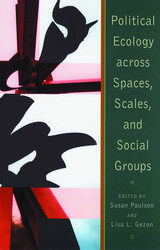 Political Ecology Across Spaces, Scales, and Social Groups
Paulson, Susan
Rutgers University Press, 2004 Environmental issues have become increasingly prominent in local struggles, national debates, and international policies. In response, scholars are paying more attention to conventional politics and to more broadly defined relations of power and difference in the interactions between human groups and their biophysical environments. Such issues are at the heart of the relatively new interdisciplinary field of political ecology, forged at the intersection of political economy and cultural ecology.
This volume provides a toolkit of vital concepts and a set of research models and analytic frameworks for researchers at all levels. The two opening chapters trace rich traditions of thought and practice that inform current approaches to political ecology. They point to the entangled relationship between humans, politics, economies, and environments at the dawn of the twenty-first century and address challenges that scholars face in navigating the blurring boundaries among relevant fields of enquiry. The twelve case studies that follow demonstrate ways that culture and politics serve to mediate human-environmental relationships in specific ecological and geographical contexts. Taken together, they describe uses of and conflicts over resources including land, water, soil, trees, biodiversity, money, knowledge, and information; they exemplify wide-ranging ecological settings including deserts, coasts, rainforests, high mountains, and modern cities; and they explore sites located around the world, from Canada to Tonga and cyberspace.
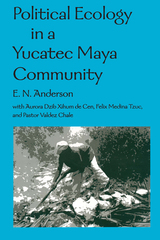 Political Ecology in a Yucatec Maya Community
E. N. Anderson with Aurora Dzib Xihum de Cen, Felix Medina Tzuc, and Pastor Valdez Chale
University of Arizona Press, 2005 In Chunhuhub, the Conquest is not a done deal.
Unlike many small tropical towns, Chunhuhub in rural Quintana Roo, Mexico, has not been a helpless victim of international forces. Its people are descendants of heroic Mayans who stood off the Spanish invaders. People in Chunhuhub continue to live largely through subsistence farming of maize and vegetables, supplemented by commercial orchard, livestock, and field crop cultivation. They are, however, also self-consciously “modernizing” by seeking better educational and economic opportunities.
Political Ecology in a Yucatec Maya Community tells the story of Chunhuhub at the beginning of the twenty-first century, focusing on the resource management of plants and animals. E. N. Anderson and his Maya co-authors provide a detailed overview of Maya knowledge of and relationships with the environment, describing how these relationships have been maintained over the centuries and are being transformed by modernization. They show that the Quintana Roo Mayas have been working to find ways to continue ancient and sustainable methods of making a living while also introducing modern techniques that can improve that living. For instance, traditional subsistence agriculture is broadly sustainable at current population densities, but hunting is not, and modern mechanized agriculture has an uncertain future.
Bringing the voice of contemporary Mayas to every page, the authors offer an encyclopedic overview of the region: history, environment, agriculture, medicine, social relations, and economy. Whether discussing the fine points of beekeeping or addressing the problem of deforestation, they provide a remarkably detailed account that immerses readers in the landscape.
Maya of the Yucatán Peninsula have had more than their share of successes—and some failures as well—and as a study in political and cultural ecology, Political Ecology in a Yucatec Maya Community has much to tell us about tropical development and about the human condition. Their experience tells us that if we wish to have not only farms but also mahogany, wildlife, and ecotourism, then further efforts are needed.
As Anderson observes, traditional Maya management, with its immense knowledge base, remains the best—indeed, the only—effective system for making a living from the Yucatán’s harsh landscape. Political Ecology in a Yucatec Maya Community is a compelling testament to the daily life practices of modern peasant farmers that can provide us with clues about more efficient management techniques for the conservation of biodiversity worldwide.
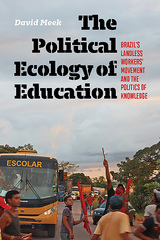 The Political Ecology of Education: Brazil's Landless Workers' Movement and the Politics of Knowledge
David Meek
West Virginia University Press, 2020 Agrarian social movements are at a crossroads. Although these movements have made significant strides in advancing the concept of food sovereignty, the reality is that many of their members remain engaged in environmentally degrading forms of agriculture, and the lands they farm are increasingly unproductive. Whether movement farmers will be able to remain living on the land, and dedicated to alternative agricultural practices, is a pressing question.
The Political Ecology of Education examines the opportunities for and constraints on advancing food sovereignty in the 17 de Abril settlement, a community born out of a massacre of landless Brazilian workers in 1996. Based on immersive fieldwork over the course of seven years, David Meek makes the provocative argument that critical forms of food systems education are integral to agrarian social movements’ survival. While the need for critical approaches is especially immediate in the Amazon, Meek’s study speaks to the burgeoning attention to food systems education at various educational levels worldwide, from primary to postgraduate programs. His book calls us to rethink the politics of the possible within these pedagogies.
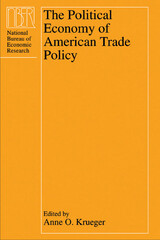 The Political Economy of American Trade Policy
Edited by Anne O. Krueger
University of Chicago Press, 1995 Exploring the political and economic determinants of trade protection, this study provides a wealth of information on key American industries and documents the process of seeking and conferring protection.
Eight analytical histories of the automobile, steel, semiconductor, lumber, wheat, and textile and apparel industries demonstrate that trade barriers rarely have unequivocal benefits and may be counterproductive. They show that criteria for awarding protection do not take into account the interests of consumers or other industries and that political influence and an organized lobby are major sources of protection.
Based on these findings, a final essay suggests that current policy fails to consider adequately economic efficiency, the public good, and indirect negative effects. This volume will interest scholars in economics, business, and public policy who deal with trade issues.
 The Political Economy of Artificial Intelligence
Edited by Ajay Agrawal, Joshua Gans, Avi Goldfarb, and Catherine E. Tucker
University of Chicago Press An authoritative look at how artificial intelligence both shapes and is shaped by the political and economic forces of the modern world. As the effects of artificial intelligence are felt across economies and societies, many of its ramifications are still emerging. This volume brings together economists and political scientists to examine how AI intersects with regulation, military power, and political identity—offering analytical frameworks and identifying key open questions for future research. The contributions address topics such as the allocation of property rights for AI inputs, trade-offs among alternative regulatory regimes, and the role of interest groups in shaping the technology’s trajectory. They explore how AI-related capabilities influence military effectiveness, resource allocation, and bargaining power among nations, and consider AI’s effects on political preferences, from the influence of AI-curated information on polarization to the implications of targeted political advertising and personalized education for national identity formation. The volume highlights key trade-offs that arise in AI’s political economy, and points toward empirical strategies and theoretical models that can advance understanding in this emerging field. Drawing on diverse disciplinary perspectives, the collection provides a foundation for rigorous inquiry into how AI both shapes and is shaped by political and economic forces.
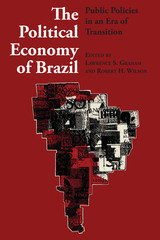 The Political Economy of Brazil: Public Policies in an Era of Transition
Edited by Lawrence S. Graham and Robert H. Wilson
University of Texas Press, 1992 The transition from authoritarian to democratic government in Brazil unleashed profound changes in government and society that cannot be adequately understood from any single theoretical perspective. The great need, say Graham and Wilson, is a holistic vision of what occurred in Brazil, one that opens political and economic analysis to new vistas. This need is answered in The Political Economy of Brazil, a groundbreaking study of late twentieth-century Brazilian issues from a policy perspective. The book was an outgrowth of a year-long policy research project undertaken jointly by the Lyndon B. Johnson School of Public Affairs and the Teresa Lozano Long Institute of Latin American Studies, both at the University of Texas at Austin. In this book, several noted scholars focus on specific issues central to an understanding of the political and economic choices that were under debate in Brazil. Their findings reveal that for Brazil the break with the past—the authoritarian regime—could not be complete due to economic choices made in the 1960s and 1970s, and also the way in which economic resources committed at that time locked the government into a relatively limited number of options in balancing external and internal pressures. These conclusions will be important for everyone working in Latin American and Third World development.
 The Political Economy of Development: The World Bank, Neoliberalism and Development Research
Edited by Kate Bayliss, Ben Fine, and Elisa Van Waeyenberge
Pluto Press, 2011 Any student, academic or practitioner wanting to succeed in development studies, radical or mainstream, must understand the World Bank's role and the evolution of its thinking and activities. The Political Economy of Development provides tools for gaining this understanding and applies them across a range of topics.
The research, practice and scholarship of development are always set against the backdrop of the World Bank, whose formidable presence shapes both development practice and thinking. This book brings together academics that specialise in different subject areas of development and reviews their findings in the context of the World Bank as knowledge bank, policy-maker and financial institution. The volume offers a compelling contribution to our understanding of development studies and of development itself.
The Political Economy of Development is an invaluable critical resource for students, policy-makers and activists in development studies.
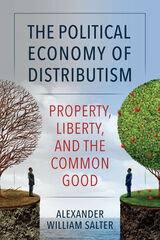 The Political Economy of Distributism: Property, Liberty, and the Common Good
Alexander William Salter
Catholic University of America Press, 2023 In recent years, prominent scholars, public intellectuals, and politicians have advocated reforming America’s economic model to embrace “common-good capitalism.” Catholic social teaching is a major influence on this movement. Is common-good capitalism compatible with the historical American commitments to private property rights and ordered liberty? What resources from Catholic social teaching can help orient free enterprise towards the common good? This book is the first scholarly inquiry into these exciting new questions.
We can better understand common-good capitalism by exploring the political economy of distributism. Formulated in the early 20th century by prominent Catholic intellectuals such as Hilaire Belloc and G.K. Chesterton, distributism emphasizes the importance of widely dispersed property ownership for human flourishing. Distributist thinkers, opposed both to capitalism and socialism, sought a humane approach to politics and economics that reflected the truths of Catholic social teaching.
Some of the distributists’ claims about markets and government must be revised in light of contemporary social science. Nevertheless, their political-economic vision contains profound truths about the human condition, which social scientists would be unwise to ignore. Distributism’s insights about the nature of liberty and the social foundations of human dignity can improve ongoing conversations among economists, political scientists, and philosophers.
The Political Economy of Distributism explores distributism both as a research program and a blueprint for political-economic reform. As many are reconsidering the relationship between markets and government, this timely book demonstrates the perennial relevance of the Catholic intellectual tradition to public affairs. Academics, public servants, policy experts, and concerned citizens can all benefit from this timely study of common-good capitalism’s prospects.
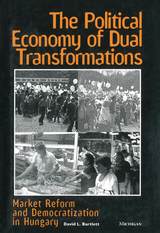 The Political Economy of Dual Transformations: Market Reform and Democratization in Hungary
David L. Bartlett
University of Michigan Press, 1997 In the early 1990s, scholars voiced skepticism about the capacity of Eastern Europe's new democracies to manage simultaneous political and economic reform. They argued that the surge of popular participation following democratization would thwart efforts by successor governments to enact market reforms that imposed high costs on major elements of post-Communist society. David Bartlett challenges the conventional wisdom regarding the hazards of "dual transformations": far from hindering marketization, democratization facilitated it. Bartlett argues that the transition to democracy in East Central Europe lowered the political barriers to market reforms by weakening the ability of actors most vulnerable to marketization to manipulate the existing institutional structure to stop or slow down the process.
Although the analysis focuses on Hungary, whose long history of market reforms makes it an ideal vehicle for assessing the impact of institutional change on reform policy, the author shows how his findings call into question the use of "shock therapy" and arguments, based on the experience in East Asia, that economic development and democratization are incompatible.
This book will appeal to economists, political scientists, and others interested in transition problems in formerly communist countries, democratic transitions, and the politics of stabilization and adjustment.
David L. Bartlett is Assistant Professor of Political Science, Vanderbilt University.
The Political Economy of Expertise: Information and Efficiency in American National Politics
Kevin M. Esterling
University of Michigan Press, 2004 The Political Economy of Expertise is a carefully argued examination of how legislatures use expert research and testimony. Kevin Esterling demonstrates that interest groups can actually help the legislative process by encouraging Congress to assess research and implement well-informed policies.
More than mere touts for the interests of Washington insiders, these groups encourage Congress to enact policies that are likely to succeed while avoiding those that have too great of a risk of failure. The surprising result is greater legislative efficiency. The Political Economy of Expertise illustrates that this system actually favors effective and informed decision making, thereby increasing the likelihood that new policies will benefit the American public.
Kevin M. Esterling is Assistant Professor at the University of California, Riverside.
 The Political Economy of Global Communication: An Introduction
Peter Wilkin
Pluto Press, 2001 Recent debates surrounding human security have focused on the satisfaction of human needs as the vital goal for global development. Peter Wilkin highlights the limitations of this view and argues that unless we incorporate an account of human autonomy into human security then the concept is flawed. He reveals how human security is a concern with social relations that connect people in local, national and global networks of power, structured through capitalism and hierarchical inter-state systems. Autonomy, as an aspect of human security, depends upon the ability of citizens to gain information about the processes that shape their lives. In this respect autonomy and communication are inherently linked and are prerequisites for the establishment of meaningful democratic systems.
To what extent do developments in global communication enhance or undermine autonomy? As the world's media companies continue to merge, we are moving towards an ever more commercially driven system of global information. Wilkin argues that private ownership provides an increasingly powerful obstacle to human autonomy, and that the neo-liberal institutional and policy framework – now a global tendency – raises major problems for the attainment of human security. At the same time it has provided the ideological justification for the extension of private power into ever wider areas of public life. Changes in global communication reflect wider tendencies to enhance the power of global elites at the expense of working people and the author illustrates how and why these changes have taken place and the forms of opposition that have arisen in response to them.
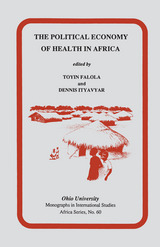 The Political Economy of Health in Africa: Mis Af#60
Toyin Falola
Ohio University Press, 1992 This book examines the major phases in the history of health services in Africa and treats health as an integral aspect of the deepening crisis in Africa’s underdevelopment. One important thesis is that Western delivery systems have made health care less accessible for most people. Contributors direct attention to problems engendered by food shortages, acute cases of infection, the market in fake drugs as well as the inequality of access to facilities, the violation of human rights, and the recent danger of the dumping of toxic wastes in several African countries. One major implication of this volume is that there can be no solution to the health crisis in Africa until the linkage between health and poverty is recognized. The authors consider questions that add to the contemporary discussion of the place that traditional African medicine and philosophy should take alongside modern Western medicine in Africa today.
 The Political Economy of Israel's Occupation: Repression Beyond Exploitation
Shir Hever
Pluto Press, 2010 The Israeli occupation of the Palestinian territories since 1967 has many important economic aspects that are often overlooked. In this highly original book, Shir Hever shows that understanding the economic dimensions of the occupation is crucial to unravelling the Israeli-Palestinian conflict.
Hever rejects the premise that Israel keeps control over Palestinian territories for material gain, and also the premise that Israel is merely defending itself from Palestinian aggression. Instead, he argues that the occupation has reached an impasse, with the Palestinian resistance making exploitation of the Palestinians by Israeli business interests difficult, but the Israeli authorities reluctant to give up control.
With traditional economic analysis failing to explain this turn of events, this book will be invaluable for students, activists and journalists struggling to make sense of the complex issues surrounding Israel's occupation.
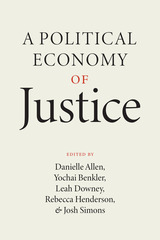 A Political Economy of Justice
Edited by Danielle Allen, Yochai Benkler, Leah Downey, Rebecca Henderson, and Josh Simons
University of Chicago Press, 2022 Defining a just economy in a tenuous social-political time.
If we can agree that our current social-political moment is tenuous and unsustainable—and indeed, that may be the only thing we can agree on right now—then how do markets, governments, and people interact in this next era of the world? A Political Economy of Justice considers the strained state of our political economy in terms of where it can go from here. The contributors to this timely and essential volume look squarely at how normative and positive questions about political economy interact with each other—and from that beginning, how to chart a way forward to a just economy.
A Political Economy of Justice collects fourteen essays from prominent scholars across the social sciences, each writing in one of three lanes: the measures of a just political economy; the role of firms; and the roles of institutions and governments. The result is a wholly original and urgent new benchmark for the next stage of our democracy.
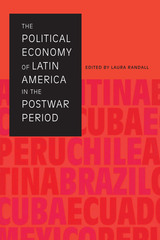 The Political Economy of Latin America in the Postwar Period
Edited by Laura Randall
University of Texas Press, 1998 The historic and increasing interdependence of the Latin American and U.S. economies makes an understanding of the political economies of Latin American nations particularly timely and important. After World War II, many nations initially implemented import substituting industrialization policies. Their outcomes, and the shift in policies, are related to the domestic policies and world economic conditions that led to government deficits, inflation, foreign borrowing, debt renegotiation, and renewed emphasis on common markets and other devices to stimulate trade and investment. In The Political Economy of Latin America in the Postwar Period, important policy measures are evaluated, such as indexation of prices and contracts; special provisions for financing the government through the Central Bank; stabilization; and deregulation of the economy. The introduction presents trends in Latin American growth and the factors that influence them. This is followed by parallel studies of the economic development of Argentina, Brazil, Chile, Cuba, Ecuador, Mexico, and Peru from 1945 to the mid-1990s. Noted experts bring their considerable experience to analyzing the content and impact of the economic theories that guided policymaking and their effects on output, income, and quality of life.
The Political Economy of NGOs: State Formation in Sri Lanka and Bangladesh
Jude L. Fernando
Pluto Press, 2011 Jude L. Fernando explores the paradoxical relationship between NGOs and capitalism, showing that supposedly progressive organisations often promote essentially the same policies and ideas as existing governments.
The book examines how a diverse group of NGOs have shaped state formation in Bangladesh and Sri Lanka. It argues that, rather than influencing state formation for the better, NGOs have been integrated into the capitalist system and their language adopted to give traditional exploitative social relations a transformative appearance.
This enlightening study will give pause to those who see NGOs as drivers of true social change and will encourage students of development studies to make a deeper analysis of state formation.
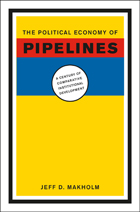 The Political Economy of Pipelines: A Century of Comparative Institutional Development
Jeff D. Makholm
University of Chicago Press, 2012 With global demand for energy poised to increase by more than half in the next three decades, the supply of safe, reliable, and reasonably priced gas and oil will continue to be of fundamental importance to modern economies. Central to this supply are the pipelines that transport this energy. And while the fundamental economics of the major pipeline networks are the same, the differences in their ownership, commercial development, and operation can provide insight into the workings of market institutions in various nations. Drawing on a century of the world’s experience with gas and oil pipelines, this book illustrates the importance of economics in explaining the evolution of pipeline politics in various countries. It demonstrates that institutional differences influence ownership and regulation, while rents and consumer pricing depend on the size and diversity of existing markets, the depth of regulatory institutions, and the historical structure of the pipeline businesses themselves. The history of pipelines is also rife with social conflict, and Makholm explains how and when institutions in a variety of countries have controlled pipeline behavior—either through economic regulation or government ownership—in the public interest.
 The Political Economy of Protest and Patience: East European and Latin American Trasformations Compared
Béla Greskovits
Central European University Press, 1998 Despite gloomy prophecies, democracy and the market economy seem to be taking root throughout Central and Eastern Europe, although set against a background of a recession deeper and longer than that of the Great Depression. How is this possible? Why did Eastern Europeans protest less about the brutal social consequences of systemic change than the people of Latin America a decade earlier? Why has the region-wide authoritarian or populist turnabout not occurred? Why has democracy in these countries proved to be crisis-proof? In what ways has economic crisis impacted on the politics of the region? In addressing these questions, Béla Greskovits uses a comparative analysis of the structures, institutions, cultures, and actors shaping both the Eastern European and the Latin American transformations. He argues that structural, institutional, and cultural factors have put a brake on destabilizing collective actions and have paved the way for the emergence of the enduring, low-level equilibrium between incomplete democracy and imperfect market economy which seems set to characterize the Central and Eastern European experience for the foreseeable future.
 The Political Economy of Reform in Post-Mao China
Elizabeth J. Perry and Christine Wong
Harvard University Press, 1985 In December 1978 the Chinese Communist Party announced dramatic changes in policy for both agriculture and industry that seemed to repudiate the Maoist “road to socialism” in favor of certain “capitalist” tendencies. The motives behind these changes, the nature of the reforms, and their effects upon the economy and political life of countryside and city are here analyzed by five political scientists and five economists. Their assessments of ongoing efforts to implement the new policies provide a timely survey of what is currently happening in China.
Part One delineates the content of agricultural reforms—including decollectivization and the provisions for households to realize private profits—and examines their impact on production, marketing, peasant income, family planning, local leadership, and rural violence. Part Two examines the evolution of industrial reforms, centering on enterprise profit retention, and their impact on political conflict, resource allocation, investment, material and financial flows, industrial structure, and composition of output. Through all ten chapters one theme is conspicuous—the multiple interactions between politics and economics in China’s new directions since the Cultural Revolution.
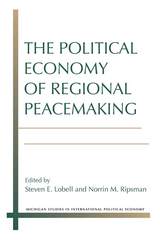 The Political Economy of Regional Peacemaking
Edited by Steven E. Lobell and Norrin M. Ripsman
University of Michigan Press, 2016 In The Political Economy of Regional Peacemaking, scholars examine the efficacy of trade agreements, economic sanctions, and other strategies of economic statecraft for the promotion of peace both between rival states and across conflict-ridden regions more generally. In the introduction, Steven E. Lobell and Norrin M. Ripsman pose five central questions: (1) What types of economic statecraft, including incentives and sanctions, can interested parties employ? (2) Who are the appropriate targets in the rival states—state leaders, economic and social elites, or society as whole? (3) When should specific economic instruments be used to promote peace—prior to negotiations, during negotiations, after signature of the treaty, or during implementation of the treaty? (4) What are the limits and risks of economic statecraft and economic interdependence? (5) How can economic statecraft be used to move from a bilateral peace agreement to regional peace? The chapters that follow are grouped in three sections, corresponding to the three stages of peacemaking: reduction or management of regional conflict; peacemaking or progress toward a peace treaty; and maintenance of bilateral peace and the regionalization of the peace settlement. In each chapter, the contributors consider the five key questions from a variety of methodological, historical, cultural, and empirical perspectives, drawing data from the Pacific, the Middle East, Europe, Asia, and Latin America. The conclusion expands on several themes found in the chapters and proposes an agenda for future research.
The Political Economy of Special-Purpose Government
Kathryn A. Foster
Georgetown University Press In recent decades, local governments across America have increasingly turned specialized functions over to autonomous agencies ranging in scope from subdivision-sized water districts to multi-state transit authorities. This book is the first comprehensive examination of the causes and consequences of special-purpose governments in more than 300 metropolitan areas in the United States. It presents new evidence on the economic, political, and social implications of relying on these special districts while offering important findings about their use and significance.
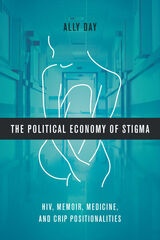 The Political Economy of Stigma: HIV, Memoir, Medicine, and Crip Positionalities
Ally Day
Ohio State University Press, 2021 Winner, 2022 Alison Piepmeier Prize from the National Women’s Studies Association
In The Political Economy of Stigma, Ally Day offers a compelling critique of neoliberal medical practices in the US by coupling an analysis of HIV memoir with a critical examination of narrative medicine practice. Using insights from feminist disability studies and crip theory, Day argues that stories of illness and disability—such as HIV memoirs—operate within a political economy of stigma, which she defines as the formal and informal circulation of personal illness and disability narratives that benefits some while hindering others. On the one hand, this system decreases access to appropriate medical care for those with chronic conditions by producing narratives of personal illness that frame one’s relationship to structural inequality as a result of personal failure. On the other hand, the political economy of stigma rewards those who procure such narratives and circulate them for public consumption.
The political economy of stigma is theorized from three primary research sites: a reading group with women living with HIV, a reading group with AIDS service workers, and participant observation research and critical close reading of practices in narrative medicine. Ultimately, it is the women living with HIV who provide an alternative way to understand disability and illness narratives, a practice of differential reading that can challenge stigmatizing tropes and reconceptualize the creation, reception, and circulation of patient memoir.
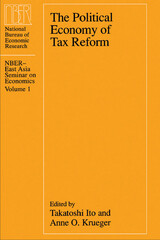 The Political Economy of Tax Reform
Edited by Takatoshi Ito and Anne O. Krueger
University of Chicago Press, 1992 The rapid emergence of East Asia as an important geopolitical-economic entity has been one of the most visible and striking changes in the international economy in recent years. With that emergence has come an increased need for understanding the problems of interdependence. As a step toward meeting this need, the National Bureau of Economic Research joined with the Korea Development Institute to sponsor this volume, which focuses on the complexities of tax reform in a global economy.
Experts from Taiwan, Korea, the Philippines, Japan, and Thailand, as well as the United States, Canada, and Israel examine the major tax programs of the 1980s and their domestic and international economic effects. The analyses reveal similarities between the United States and countries in East Asia in political constraints on policy making, and taken together they show how growing interdependence interacts with domestic economic and political concerns to affect issues as politically vital as tax reform. Economists, policymakers, and members of the business community will benefit from these studies.
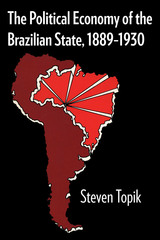 The Political Economy of the Brazilian State, 1889–1930
By Steven Topik
University of Texas Press, 1987 In this first overview of the Brazilian republican state based on extensive primary source material, Steven Topik demonstrates that well before the disruption of the export economy in 1929, the Brazilian state was one of the most interventionist in Latin America. This study counters the previous general belief that before 1930 Brazil was dominated by an export oligarchy comprised of European and North American capitalists and that only later did the state become prominent in the country’s economic development. Topik examines the state’s performance during the First Republic (1889–1930) in four sectors—finance, the coffee trade, railroads, and industry. By looking at the controversies in these areas, he explains how domestic interclass and international struggles shaped policy and notes the degree to which the state acted relatively independently of civil society. Topik’s primary concern is the actions of state officials and whether their decisions reflected the demands of the ruling class. He shows that conflicting interests of fractions of the ruling class and foreign investors gradually led to far greater state participation than any of the participants originally desired, and that the structure of the economy and of society—not the intentions of the actors—best explains the state’s economic presence.
 The Political Economy of the Public Budget in the Americas
Edited by Diego Sanchez-Ancochea and Iwan Morgan
University of London Press, 2009 This volume provides a multidisciplinary comparison of fiscal and tax policies in Latin America and the United States by political economy specialists from Latin America, the U.S., and Europe. The contributors identify the common budgetary problems of the nations of the Americas in terms of their status as "small fiscal states" --ones that have failed to generate adequate tax resources to fund the responsibilities of modern government. They also consider the differing effect of capital inflows on the autonomy of the public sector in the U.S. and Latin America. While the former has been able to operate large budgetary and trade deficits without adverse reaction from global financial markets, the latter has experienced the disciplining effect of these external forces to maintain low public deficits. The book offers a timely assessment of hemispheric fiscal developments on the eve of the greatest crisis for the world economy since the depression of the 1930s. Contributors includeWerner Baer (University of Illinois), Dennis S. Ippolito (Southern Methodist University), Colin M. Lewis (London School of Economics & Political Science and ISA), Roberto Machado (ECLAC), Andrew H. Mitchell (UCLA Center for Economic History), Iwan Morgan (ISA), Diego Sanchez-Ancochea (University of Oxford), Aaron Schneider (Tulane University), Carlos E. Schonerwald (Universidade do Vale do Rio dos Sinos and ECLAC), and Matias Vernengo (University of Utah).
 Political Economy of the Urban Ghetto
Daniel R. Fusfeld and Timothy Bates
Southern Illinois University Press, 1984
The income of blacks in most northern industrial states today is lower relative to the income of whites than in 1949.Fusfeld and Bates examine the forces that have led to this state of affairs and find that these economic relationships are the product of a complex pattern of historical development and change in which black-white economic relationships play a major part, along with patterns of industrial, agricultural, and technological change and urban development. They argue that today’s urban racial ghettos are the result of the same forces that created modern America and that one of the by-products of American affluence is a ghettoized racial underclass.
These two themes, they state, are essential for an understanding of the problem and for the formulation of policy. Poverty is not simply the result of poor education, skills, and work habits but one outcome of the structure and functioning of the economy. Solutions require more than policies that seek to change people: they await a recognition that basic economic relationships must be changed.
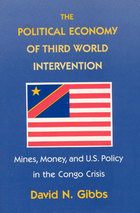 The Political Economy of Third World Intervention: Mines, Money, and U.S. Policy in the Congo Crisis
David N. Gibbs
University of Chicago Press, 1991 Interventionism—the manipulation of the internal politics of one country by another—has long been a feature of international relations. The practice shows no signs of abating, despite the recent collapse of Communism and the decline of the Cold War.
In The Political Economy of Third World Intervention, David Gibbs explores the factors that motivate intervention, especially the influence of business interests. He challenges conventional views of international relations, eschewing both the popular "realist" view that the state is influenced by diverse national interests and the "dependency" approach that stresses conflicts between industrialized countries and the Third World. Instead, Gibbs proposes a new theoretical model of "business conflict" which stresses divisions between different business interests and shows how such divisions can influence foreign policy and interventionism. Moreover, he focuses on the conflicts among the core countries, highlighting friction among private interests within these countries.
Drawing on U.S. government documents—including a wealth of newly declassified materials—he applies his new model to a detailed case study of the Congo Crisis of the 1960s. Gibbs demonstrates that the Crisis is more accurately characterized by competition among Western interests for access to the Congo's mineral wealth, than by Cold War competition, as has been previously argued.
Offering a fresh perspective for understanding the roots of any international conflict, this remarkably accessible volume will be of special interest to students of international political economy, comparative politics, and business-government relations.
"This book is an extremely important contribution to the study of international relations theory; Gibbs' treatment of the Congo case is superb. He effectively takes the "statists" to task and presents a compelling new way of analyzing external interventions in the Third World."—Michael G. Schatzberg, University of Wisconsin
"David Gibbs makes an original and important contribution to our understanding of the influence of business interests in the making of U.S. foreign policy. His business conflict model provides a synthetic theoretical framework for the analysis of business-government relations, one which yields fresh insights, overcomes inconsistencies in other approaches, and opens new ground for important research. . . . [Gibbs] provides a sophisticated analysis of the conflicts within the U.S. business community and identifies the complex ways in which they interacted with agencies within the government to form U.S. foreign policy toward the Congo. . . . This is a well-crafted analysis of a critical case of U.S. postwar intervention which should be of general interest to scholars and others concerned with the domestic bases of foreign policy."—Thomas J. Biersteker, Director, School of International Relations, University of Southern California
The Political Economy of Trade Protection
Edited by Anne O. Krueger
University of Chicago Press, 1995 This clear, concise summary of the in-depth analyses presented in The Political Economy of American Trade Policy examines the level, form, and evolution of American trade protection.
In case studies of trade barriers imposed during the 1980s to help the steel, semiconductor, automobile, lumber, wheat, and textile and apparel industries, the contributors trace the evolution of efforts to obtain protection, protectionist measures, and their results. A chapter assessing the common themes that emerge from the studies concludes that the focus of current trade law is exclusively on the individual protection-seeking industries, with little regard for indirect effects on using industries or for consumers. Reform could usefully take these effects into account.
This volume will interest policymakers, business executives, and anyone interested in trade policy formulation and practice.
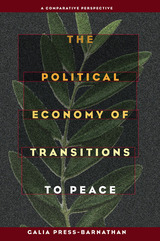 The Political Economy of Transitions to Peace: A Comparative Perspective
Galia Press-Barnathan
University of Pittsburgh Press, 2009
Much attention has focused on the ongoing role of economics in the prevention of armed conflict and the deterioration of relations. In The Political Economy of Transitions to Peace, Galia Press-Barnathan focuses on the importance of economics in initiating and sustaining peaceful relations after conflict.
Press-Barnathan provides in-depth case studies of several key relationships in the post-World War II era: Israel and Egypt; Israel and Jordan; Japan, the Philippines, and Indonesia; Japan and South Korea; Germany and France; and Germany and Poland. She creates an analytical framework through which to view each of these cases based on three factors: the domestic balance between winners and losers from transition to peace; the economic disparity between former enemies; and the impact of third parties on stimulating new cooperative economic initiatives. Her approach provides both a regional and cross-regional comparative analysis of the degree of success in maintaining and advancing peace, of the challenges faced by many nations in negotiating peace after conflict, and of the unique role of economic factors in this highly political process.
Press-Barnathan employs both liberal and realist theory to examine the motivations of these states and the societies they represent. She also weighs their power relations to see how these factor into economic interdependence and the peace process. She reveals the predominant role of the state and big business in the initial transition phase (“cold” peace), but also identifies an equally vital need for a subsequent broader societal coalition in the second, normalizing phase (“warm” peace). Both levels of engagement, Press-Barnathan argues, are essential to a durable peace. Finally, she points to the complex role that third parties can play in these transitions, and the limited long-term impact of direct economic side-payments to the parties.
 The Political Economy of Turkey
Zulkuf Aydin
Pluto Press, 2005 This book analyses the political and socio-economic problems faced by Turkey in recent decades and the country's gradual integration into the global economy. Since the 1970s, Turkey has faced some of the most serious crises since the Republic was established in 1923. Social unrest, political and ethnic violence, paralysis of the state bureaucracy and other institutions, increasing foreign debt, decreasing economic growth, vast inflation and increasing unemployment have all been part of everyday life in Turkey's recent history. The author argues that this state of affairs is symptomatic of a deeper, more enduring crisis arising from the way in which Turkey has been integrated into the global economy. He shows how, like many other developing countries, Turkey has become reliant on foreign investment and international financial institutions, and he offers a broader critique of globalisation in this light. Topics covered include democracy, repression, the military, the Kurdish question and regional inequalities, civil society, human rights and Islamic fundamentalism.
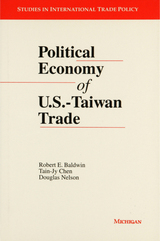 Political Economy of U.S. - Taiwan Trade
Robert Baldwin, Tain-Jy Chen, and Douglas Nelson, Editors
University of Michigan Press, 1995 Two key features of the remarkable economic growth in the newly industrializing countries of East Asia over the last quarter of a century are the role of exports of manufactured goods as the engine of this growth and the importance of the United States as a market for these exports. Political Economy of U.S.-Taiwan Trade analyzes the nature of the political and economic interactions, both domestic and international, which evolved between Taiwan and the United States in a manner that has enabled this growth to occur. In analyzing the various cooperative and conflicting trade policies pursued by the two countries over the last fifty years, the authors utilize a broad political economy framework. They first describe the nature and evolution of trade between Taiwan and the United States and discuss the major economic and political groups and institutions that shape trade policies in the two countries. In doing so, the role that trade has played both in Taiwan's development policies and in the international economic and political policies of the United States in the post-World War II period is analyzed. The various restrictions imposed by each country on the other's exports are examined, and the efforts to reduce these trade barriers are then discussed in detail. Particular attention is given to the series of bilateral negotiations in which the United States has used its dominant economic and political power to force Taiwan to open a number of its internal markets. The book will be of interest to both economists and political scientists specializing in international economics and international political relations. Area specialists focusing on the Far East will also find the book helpful. Robert E. Baldwin is Hilldale Professor of Economics, University of Wisconsin. Tain-Jy Chen is Research Fellow, Chung-Hua Institution for Economic Research. Douglas Nelson is Associate Professor of Economics, Tulane University. This title was formally part of the Studies in International Trade Policy Series, now called Studies in International Economics.
A Political Education: A Washington Memoir
By Harry McPherson
University of Texas Press, 1995 This insider's view of Washington in the 1950s and 1960s, of the tumultuous presidency of Lyndon Johnson, and of the conflicts and factions of the president's staff has become a political classic since its original publication in 1972. In this reissue, Harry McPherson adds a new preface in which he reflects on changes in Washington since the Johnson era and on the lessons Bill Clinton could learn from the presidency of Lyndon Johnson.
 Political Emotions: Why Love Matters for Justice
Martha C. Nussbaum
Harvard University Press, 2013 How can we achieve and sustain a "decent" liberal society, one that aspires to justice and equal opportunity for all and inspires individuals to sacrifice for the common good? In this book, a continuation of her explorations of emotions and the nature of social justice, Martha Nussbaum makes the case for love. Amid the fears, resentments, and competitive concerns that are endemic even to good societies, public emotions rooted in love—in intense attachments to things outside our control—can foster commitment to shared goals and keep at bay the forces of disgust and envy.
Great democratic leaders, including Abraham Lincoln, Mohandas Gandhi, and Martin Luther King Jr., have understood the importance of cultivating emotions. But people attached to liberalism sometimes assume that a theory of public sentiments would run afoul of commitments to freedom and autonomy. Calling into question this perspective, Nussbaum investigates historical proposals for a public "civil religion" or "religion of humanity" by Jean-Jacques Rousseau, Auguste Comte, John Stuart Mill, and Rabindranath Tagore. She offers an account of how a decent society can use resources inherent in human psychology, while limiting the damage done by the darker side of our personalities. And finally she explores the cultivation of emotions that support justice in examples drawn from literature, song, political rhetoric, festivals, memorials, and even the design of public parks.
"Love is what gives respect for humanity its life," Nussbaum writes, "making it more than a shell." Political Emotionsis a challenging and ambitious contribution to political philosophy.
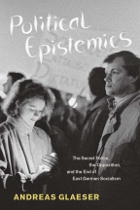 Political Epistemics: The Secret Police, the Opposition, and the End of East German Socialism
Andreas Glaeser
University of Chicago Press, 2011 What does the durability of political institutions have to do with how actors form knowledge about them? Andreas Glaeser investigates this question in the context of a fascinating historical case: socialist East Germany’s unexpected self-dissolution in 1989. His analysis builds on extensive in-depth interviews with former secret police officers and the dissidents they tried to control as well as research into the documents both groups produced. In particular, Glaeser analyzes how these two opposing factions’ understanding of the socialist project came to change in response to countless everyday experiences. These investigations culminate in answers to two questions: why did the officers not defend socialism by force? And how was the formation of dissident understandings possible in a state that monopolized mass communication and group formation? He also explores why the Stasi, although always well informed about dissident activities, never developed a realistic understanding of the phenomenon of dissidence.
Out of this ambitious study, Glaeser extracts two distinct lines of thought. On the one hand he offers an epistemic account of socialism’s failure that differs markedly from existing explanations. On the other hand he develops a theory—a sociology of understanding—that shows us how knowledge can appear validated while it is at the same time completely misleading.
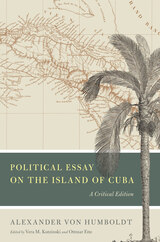 Political Essay on the Island of Cuba: A Critical Edition
Alexander von Humboldt
University of Chicago Press, 2011 The research Alexander von Humboldt amassed during his five-year trek through the Americas in the early nineteenth-century proved foundational to the fields of botany, geography, and geology. But his visit to Cuba during this time yielded observations that extended far beyond the natural world. Political Essay on the Island of Cuba is a physical and cultural study of the island nation. In it, Humboldt denounces colonial slavery on both moral and economic grounds and stresses the vital importance of improving intercultural relations throughout the Americas. Humboldt’s most controversial book, Political Essay on the Island of Cuba was banned, censored, and willfully mistranslated to suppress Humboldt’s strong antislavery sentiments. It reemerges here, newly translated from the original two volume French edition, to introduce a new generation of readers to Humboldt’s astonishing multiplicity of scientific and philosophical perspectives. In their critical introduction, Vera Kutzinski and Ottmar Ette emphasize Humboldt’s rare ability to combine scientific rigor with a cosmopolitan consciousness and a deeply felt philosophical humanism. The result is a work on Cuba of historical import that will attract historians of science as well as cultural historians, political scientists, and literary scholars.
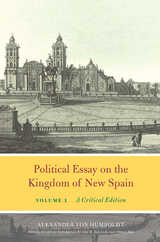 Political Essay on the Kingdom of New Spain, Volume 1: A Critical Edition
Alexander von Humboldt
University of Chicago Press, 2019 Volume 1 of this critical edition includes a note on the text from the Humboldt in English team, an introduction by editors Vera M. Kutzinski and Ottmar Ette, a preface to the first edition by Alexander von Humboldt, and the translation of Volumes 1 and 2 of Humboldt’s Essai politique sur le royaume de de Nouvelle Espagne from 1825 to 1827.
Alexander von Humboldt was the most celebrated modern chronicler of North and South America and the Caribbean, and this translation of his essay on New Spain—the first modern regional economic and political geography—covers his travels across today’s Mexico in 1803–1804. The work canvases natural-scientific and cultural-scientific objects alike, combining the results of fieldwork with archival research and expert testimony.
To show how people, plants, animals, goods, and ideas moved across the globe, Humboldt wrote in a variety of styles, bending and reshaping familiar writerly conventions to keep readers attentive to new inputs. Above all, he wanted his readers to be open-minded when confronted with cultural and other differences in the Americas. Fueled by his comparative global perspective on politics, economics, and science, he used his writing to support Latin American independence and condemn slavery and other forms of colonial exploitation. It is these voluminous and innovative writings on the New World that made Humboldt the undisputed father of modern geography, early American studies, transatlantic cultural history, and environmental studies.
This two-volume critical edition—the third installment in the Alexander von Humboldt in English series—is based on the full text, including all footnotes, tables, and maps, of the second, revised French edition of Essai politique sur le royaume de de Nouvelle Espagne from 1825 to 1827, which has never been translated into English before. Extensive annotations and full-color atlases are available on the series website.
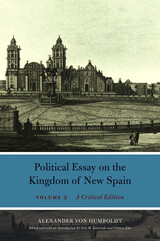 Political Essay on the Kingdom of New Spain, Volume 2: A Critical Edition
Alexander von Humboldt
University of Chicago Press, 2019 Volume 2 of this critical edition includes the translation of Volumes 3 and 4 of the second, revised French edition of Alexander von Humboldt’s Essai politique sur le royaume de de Nouvelle Espagne from 1825 to 1827 as well as notes, supplements, indexes, and more.
Alexander von Humboldt was the most celebrated modern chronicler of North and South America and the Caribbean, and this translation of his essay on New Spain—the first modern regional economic and political geography—covers his travels across today’s Mexico in 1803–1804. The work canvases natural-scientific and cultural-scientific objects alike, combining the results of fieldwork with archival research and expert testimony.
To show how people, plants, animals, goods, and ideas moved across the globe, Humboldt wrote in a variety of styles, bending and reshaping familiar writerly conventions to keep readers attentive to new inputs. Above all, he wanted his readers to be open-minded when confronted with cultural and other differences in the Americas. Fueled by his comparative global perspective on politics, economics, and science, he used his writing to support Latin American independence and condemn slavery and other forms of colonial exploitation. It is these voluminous and innovative writings on the New World that made Humboldt the undisputed father of modern geography, early American studies, transatlantic cultural history, and environmental studies.
This two-volume critical edition—the third installment in the Alexander von Humboldt in English series—is based on the full text, including all footnotes, tables, and maps, of the second, revised French edition of Essai politique sur le royaume de de Nouvelle Espagne from 1825 to 1827, which has never been translated into English before. Extensive annotations and full-color atlases are available on the series website.
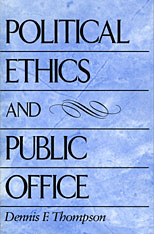 Political Ethics and Public Office
Dennis Thompson
Harvard University Press, 1987 Are public officials morally justified in threatening violence, engaging in deception, or forcing citizens to act for their own good? Can individual officials be held morally accountable for the wrongs that governments commit? Dennis Thompson addresses these questions by developing a conception of political ethics that respects the demands of both morality and politics. He criticizes conventional conceptions for failing to appreciate the difference democracy makes, and for ascribing responsibility only to isolated leaders or to impersonal organizations. His book seeks to recapture the sense that men and women, acting for us and together with us in a democratic process, make the moral choices that govern our public life.
Thompson surveys ethical conflicts of public officials over a range of political issues, including nuclear deterrence, foreign intervention, undercover investigation, bureaucratic negligence, campaign finance, the privacy of officials, health care, welfare paternalism, drug and safety regulation, and social experimentation. He views these conflicts from the perspectives of many different kinds of public officials—elected and appointed executives at several levels of government, administrators, judges, legislators, governmental advisers, and even doctors, lawyers, social workers, and journalists whose professional roles often thrust them into public life.
In clarifying the ethical problems faced by officials, Thompson combines theoretical analysis with practical prescription, and begins to define a field of inquiry for which many have said there is a need but to which few have yet contributed. Philosophers, political scientists, policy analysts, sociologists, lawyers, and other professionals interested in ethics in government will gain insight from this book.
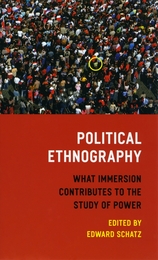 Political Ethnography: What Immersion Contributes to the Study of Power
Edited by Edward Schatz
University of Chicago Press, 2009 Scholars of politics have sought in recent years to make the discipline more hospitable to qualitative methods of research. Lauding the results of this effort and highlighting its potential for the future, Political Ethnography makes a compelling case for one such method in particular. Ethnography, the contributors amply demonstrate in a wide range of original essays, is uniquely suited for illuminating the study of politics. Situating these pieces within the context of developments in political science, Edward Schatz provides an overarching introduction and substantive prefaces to each of the volume’s four sections. The first of these parts addresses the central ontological and epistemological issues raised by ethnographic work, while the second grapples with the reality that all research is conducted from a first-person perspective. The third section goes on to explore how ethnographic research can provide fresh perspectives on such perennial topics as opinion, causality, and power. Concluding that political ethnography can and should play a central role in the field as a whole, the final chapters illuminate the many ways in which ethnographic approaches can enhance, improve, and, in some areas, transform the study of politics.
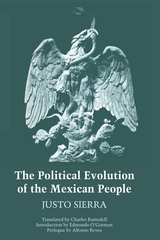 The Political Evolution of the Mexican People
By Justo Sierra
University of Texas Press, 1969 Are the Mexican people the children of Moctezuma or the children of Cortés? This question, long the central problem of Mexican historians, Justo Sierra answered by saying, "The Mexicans are the sons of the two peoples, of the two races … to this we owe our soul." Because Sierra recognized the dual parentage, he was able to view his country's history as an evolutionary process. Formed in both the indigenous past and the colonial past, the Mexican people, after three hundred years of slow and painful gestation, were finally born with the arrival of Independence. They came of age when the Reform, the Republic, and the nation achieved a single identity. This classical synthesis, written on the eve of the Mexican Revolution, gave direction to the generation that furnished the Revolution's intellectual leaders. Although the author was Secretary of Public Instruction in the dictatorial regime of Porfirio Díaz, he was the first historian to show sympathy for the plight of the masses, and his book ends with the warning that political evolution has lost its way unless the result is freedom. As Edmundo O'Gorman points out in an important essay on Mexican historiography, written especially for this edition, Sierra was also the first to write a history of his nation in a sincere endeavor to get at the truth, instead of shaping his account to prove a thesis or to preach some political faith. And yet, his work "owes its originality and its lasting merit to his vigorous interpretation of Mexico's history in the light of his convictions, of his keen insight, even of his fears." Though the chapters on the pre-Columbian Indian have been rendered obsolete by later archeological discoveries, the rest of the history is still valid and needs only to be brought up to date.
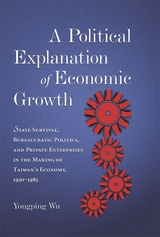 A Political Explanation of Economic Growth: State Survival, Bureaucratic Politics, and Private Enterprises in the Making of Taiwan’s Economy, 1950–1985
Yongping Wu
Harvard University Press, 2005 Taiwan is a classic case of export-led industrialization. But unlike South Korea and Japan, where large firms have been the major exporters, before the late 1980s Taiwan's successful exporters were overwhelmingly small- and medium-sized enterprises (SMEs). The SMEs became the engine of the entire economy, yet for many years the state virtually ignored the SMEs and their role as exporters.
What factors account for the success of the SMEs and their benign neglect by the state? The key was a strict division of labor: state and large private enterprises jointly monopolized the domestic market. This gave the SMEs a free run in export markets. How did this industrial structure come into being? The author argues that it was an unintended consequence of the state's policy toward the private sector and its political strategies for managing societal forces. Indeed, Taiwan's unique industrial structure was shaped by both the witting and the unwitting interactions of the state and the private sector. Moreover, as the author shows, this industrial policy was a product of the internal politics of the economic bureaucracy, and the formulation and implementation of economic policy hinged on mechanisms for solving differences within the state.
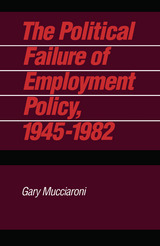 The Political Failure of Employment Policy, 1945–1982
Gary Mucciaroni
University of Pittsburgh Press, 2023
This political history analyzes the failure of the United States to adopt viable employment policies, follows U.S. manpower training and employment policy from the 1946 Employment Act to the Job Training Partnership Act of 1982. Between these two landmarks of legislation in the War on Poverty, were attempts to create public service employment (PSE), the abortive Humphrey-Hawkins Act, and the beleaguered Comprehensive Employment and Training Act (CETA).
Mucciaroni's traces the impact of economic ideas and opinions on federal employment policy. Efforts at reform, he believes, are frustrated by the tension between economic liberty and social equality that restricts the role of government and holds workers themselves accountable for success or failure. Professional economists, especially Keynesians, have shaped the content and timing of policy innovations in such ways as to limit employment programs to a social welfare mission, rather than broader, positive economic objectives. As a result, neither labor nor management has been centrally involved in making policy, and employment programs have lacked a stable and organized constituency committed to their success. Finally, because of the fragmentation of U.S. political institutions, employment programs are not integrated with economic policy, are hampered by conflicting objectives, and are difficult to carry out effectively.
As chronic unemployment and the United States' difficulties in the world marketplace continue to demand attention, the importance of Mucciaroni's subject will grow. For political scientists, economists, journalists, and activists, this book will be a rich resource in the ongoing debate about the deficiencies of liberalism and the best means of addressing one of the nation's most pressing social and political problems.
Mucciaroni's provocative theoretical analysis is buttressed by several years' research at the U.S. Department of Labor, access to congressional hearings, reports, and debates, and interviews with policy makers and their staffs. It will interest all concerned with the history of liberal social policy in the postwar period.
Political Fiction, the Spirit of Age, and Allen Drury
Tom Kemme
University of Wisconsin Press, 1987 The President of the United States, says the Constitution, cannot act in many specified instances without the "advice and consent" of Congress. But "advice" is not a strong word. And taking or not taking advice is a fairly nebulous situation . . . creating an instability, a fundamental ambiguity, at the very heart of power, between the Congress and the President. It is this instability, and this wide-openness, that allows the free play of the more intangible types of power that begin where the constitution breaks off: sex, personality, and character. Things which are left out of civics textbooks are what Allen Drury took as his subject in such novels as Advise and Consent, A Shade of Difference, and Capable of Honor.
 Political Fictions
Jean-Paul Sartre
Seagull Books, 2021 A collection of pieces on politically engaged fiction of Sartre’s day, including works by André Gorz and Paul Nizan.
Iconic French novelist, playwright, and essayist Jean-Paul Sartre is widely recognized as one of the most important philosophers of the twentieth century, and his work has remained relevant and thought-provoking through the decades. The Seagull Sartre Library now presents some of his most incisive philosophical, cultural, and literary critical essays in twelve newly designed and affordable editions.
Political Fictions includes Sartre’s long foreword to André Gorz’s The Traitor, which has often been called the most intimate and profound book to emerge from the existentialist movement. Sartre also presents a detailed portrait of his friend and fellow writer Paul Nizan (1905–1940), once a committed communist, who died fighting the Nazis at the Battle of Dunkirk. Also featured here is Sartre’s famous foreword to Nizan’s novel The Conspiracy, which made the novel famous on its republication in the 1960s, when it was adopted as an iconic text during the events of May ’68.
 Political Film: The Dialectics of Third Cinema
Mike Wayne
Pluto Press, 2001 Third Cinema is a cinema committed to social and cultural emancipation. In this book, Mike Wayne argues that Third Cinema is absolutely central to key debates concerning contemporary film practices and cultures. As a body of films, Third Cinema expands our horizons of the medium and its possibilities. Wayne develops Third Cinema theory by exploring its dialectical relations with First Cinema (dominant,commercial) and Second Cinema (arthouse,auteur). Discussing an eclectic range of films, from Evita to Dollar Mambo, The Big Lebowski to The Journey, Amistad to Camp de Thiaroye, Political Film explores the affinities and crucial political differences between First and Third Cinema. Third Cinema’s relationship with Second Cinema is explored via the cinematic figure of the bandit (Bandit Queen, The General, Eskiya). The continuities and differences with European precursors such as Eisenstein, Vertov, Lukacs, Brecht and Walter Benjamin are also assessed. The book is a polemical call for a film criticism that is politically engaged with the life of the masses.
 The Political Force of Musical Beauty
Barry Shank
Duke University Press, 2014 In The Political Force of Musical Beauty, Barry Shank shows how musical acts and performances generate their own aesthetic and political force, creating, however fleetingly, a shared sense of the world among otherwise diverse listeners. Rather than focusing on the ways in which music enables the circulation of political messages, he argues that communities grounded in the act and experience of listening can give rise to new political ideas and expression. Analyzing a wide range of "beautiful music" within popular and avant-garde genres—including the Japanese traditions in the music of Takemitsu Toru and Yoko Ono, the drone of the Velvet Underground, and the insistence of hardcore punk and Riot grrrl post-punk—Shank finds that when it fulfills the promise of combining sonic and lyrical differences into a cohesive whole, musical beauty has the power to reorganize the basis of social relations and produce communities that recognize meaningful difference.
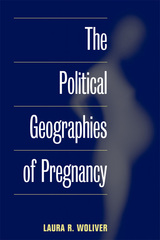 The Political Geographies of Pregnancy
Laura R. Woliver
University of Illinois Press, 2002 A searing study of how modern reproductive politics shapes women's bodily agency Pregnancy indisputably takes place within a woman's body. But as reproductive power finds its way into the hands of medical professionals, lobbyists, and policymakers, the geographies of pregnancy are shifting, and the boundaries need to be redrawn, argues Laura R. Woliver. The Political Geographies of Pregnancy is a vigorous analysis of the ways modern reproductive politics are shaped by long-standing debates on abortion and adoption, surrogacy arrangements, new reproductive technologies, medical surveillance, and the mapping of the human genome. Across a politically charged backdrop of reproductive issues, Woliver exposes strategies that claim to uphold the best interests of children, families, and women but in reality complicate women's struggles to have control over their own bodies. Utilizing feminist standpoint theory and promoting a feminist ethic of care, Woliver looks at abortion politics, modern adoption laws that cater to male-headed families, regulations that allow the state to monitor pregnant women but not always provide care for them, and the power structures behind the seemingly benign world of egg-selling and surrogate parenting. She also considers the potentially staggering political implications of mapping the human genome, and the exclusion of women's perspectives in discussions about legislation and advancements in reproductive technologies.
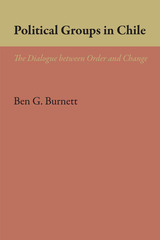 Political Groups in Chile: The Dialogue between Order and Change
By Ben G. Burnett
University of Texas Press, 1970 Before the Pinochet coup in 1973, Chile had a lengthy history of constitutionalism. Early in the republican era the aristocracy established order in the political system; a century later the emergent middle sectors infused politics with wider democratic practices and, relative to most of Latin America, a level of pluralism came to characterize group politics. Despite the distinctive advantages that embellished Chile’s political system, however, certain unfulfilled promises still marred the actual picture in the early 1960s. As the lower economic strata of society were continually passed over by most of the social reforms and economic advances that bettered the general outlook of the nation, their frustrations were brought out into the open and their votes were appealed to by reformist and radical political parties anxious to break the political hegemony of moderates and conservatives. Thus, the 1960s stood out as a high-water mark in the confrontation between, on the one side, those desirous of maintaining the status quo, or at most admitting to prescriptive change, and, on the other, progressive elements demanding deep structural alterations in the entire social fabric. This study seeks to analyze the sources of alienation, the styles and objectives of the participants in the confrontation, and the relative ability of groups to gain satisfaction of their claims upon the political system. Ben G. Burnett delineates this dialogue between order and change as it inexorably pushed toward a showdown in the presidential elections of 1964 and the congressional elections of 1965.
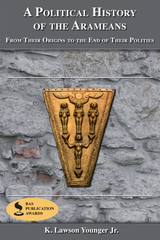 A Political History of the Arameans: From Their Origins to the End of Their Polities
K. Lawson Younger Jr.
SBL Press, 2016 An up-to-date analysis of the history of the ancient Near East and the Arameans
K. Lawson Younger Jr. presents a political history of the Arameans from their earliest origins to the demise of their independent entities. The book investigates their tribal structures, the development of their polities, and their interactions with other groups in the ancient Near East. Younger utilizes all of the available sources to develop a comprehensive picture of this complex, yet highly important, people whose influence and presence spanned the Fertile Cresent.
Features:
- The best, recent understanding of tribal political structures, aspects of mobile pastoralism, and models of migration
- A regional rather than a monolithic approach to the rise of Aramean polities
- Thorough integration of the complex relationships and interactions of the Arameans with the Luwians, the Assyrians, the Israelites, and others
A Political History of the Texas Republic, 1836-1845
By Stanley Siegel
University of Texas Press, 1956 This book is unique among the histories of the Texas Republic: it is the first to examine the fledgling nation from the point of view of its dynamic political life. Policies with far-reaching results were formulated in the nine years of Texas' independence, and the author clearly presents the many thorny issues that were to plague Texas for generations. The political history of the Republic is one of strong figures vying with each other for popular support of their divergent policies. The author details the personal feuds and animosities that resulted and shows the effects of these differences on the governing of the nation. Thoughtful use of diaries, memoirs, and other contemporary sources gives the reader an excellent understanding of the sense of personal concern the citizens of the Republic felt toward the political issues of the day.
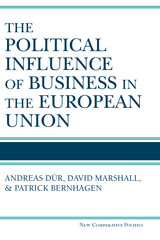 The Political Influence of Business in the European Union
Andreas Dür, David Marshall, and Patrick Bernhagen
University of Michigan Press, 2019 Many citizens, politicians, and political activists voice concern about the political influence of business in the European Union. But do business interests really pull the strings in Brussels? Contrary to expectations, this book shows that business interests are no more influential than other interests in shaping contemporary EU policies. Andreas Dür, David Marshall, and Patrick Bernhagen present an original argument that stresses the role of public actors in facilitating or impeding interest groups’ lobbying success. Novel data on a large number of legislative proposals on the EU’s agenda and three case studies present strong support for this argument. The Political Influence of Business in the European Union offers new insights into how lobbying success depends on the demand and supply of information, as well as new ideas on how to measure lobbying success. The book advances a fresh perspective on the question of business power and shows why business interests often lose in the policy struggle.
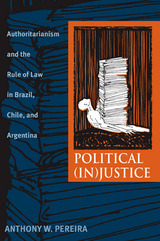 Political (In)Justice: Authoritarianism and the Rule of Law in Brazil, Chile, and Argentina
Anthony W. Pereira
University of Pittsburgh Press, 2005 Why do attempts by authoritarian regimes to legalize their political repression differ so dramatically? Why do some dispense with the law altogether, while others scrupulously modify constitutions, pass new laws, and organize political trials? Political (In)Justice answers these questions by comparing the legal aspects of political repression in three recent military regimes: Brazil (1964–1985); Chile (1973–1990); and Argentina (1976–1983). By focusing on political trials as a reflection of each regime’s overall approach to the law, Anthony Pereira argues that the practice of each regime can be explained by examining the long-term relationship between the judiciary and the military. Brazil was marked by a high degree of judicial-military integration and cooperation; Chile’s military essentially usurped judicial authority; and in Argentina, the military negated the judiciary altogether. Pereira extends the judicial-military framework to other authoritarian regimes—Salazar’s Portugal, Hitler’s Germany, and Franco’s Spain—and a democracy (the United States), to illuminate historical and contemporary aspects of state coercion and the rule of law.
Political Judgment: Structure and Process
Milton Lodge and Kathleen M. McGraw, Editors
University of Michigan Press, 1995 An information processing approach to how citizens make important political decisions
 Political Justice in Budapest after World War II
Andrea Peto
Central European University Press, 2015 In Hungary, which fell under Soviet influence at the end of World War II, those who had participated in the wartime atrocities were tried by so called people’s courts. This book analyses this process in an objective, quantitative way, contributing to the present timely discussion on the Hungarian war guilt. The authors apply a special focus on the gender aspect of the trials. Political justice had a specific nature in Hungary. War criminals began to be brought to trial while fighting was still underway in the western part of the country, well before the Nuremberg trials. Not only crimes committed during the war were tried in the same frame but also post-war ones. As far as the post-war period is concerned, legal proceedings regarding these crimes were most often launched on the basis of Act VII of 1946. This act of law concerned “the criminal law protection of the democratic constitutional order and the republic” and its basic aim was to facilitate the creation of a communist dictatorship and to deal with perceived or real enemies of the regime.
Political Landscape: The Art History of Nature
Martin Warnke
Reaktion Books, 2004 We all know what "the political landscape" is, and politicians and journalists never tire of referring to it. But in this ingenious and original book, Martin Warnke takes that well-worn metaphor literally and uses it to reveal just how politicized the real landscape of continental Europe has been for centuries. The author finds his evidence of humanity's intervention in nature in the form of monuments and milestones, gardens, roads and border crossings, in landscape paintings and maps – even, in fact, in the anthropomorphic interpretations once given to formations of hills and rocks.
The Political Landscape is underpinned with a fascinating array of examples and illustrations, many of which will be new even to experts in the art of landscape and related disciplines.
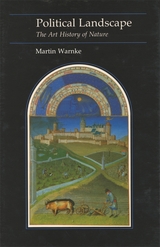 Political Landscape: The Art History of Nature
Martin Warnke
Harvard University Press, 1995 If a river runs through it, somewhere there is bound to be a bridge. Little in the landscape remains untouched by human hands, and every touch, from the simplest ditch to the most intricate monument, reveals a political decision or design. This is how Martin Warnke, one of Germany's leading art historians, looks at landscape in this book, which leads to a new way of seeing nature as we have appropriated, represented, and transformed it over time. Covering nearly a thousand years and most of western Europe, The Political Landscape provides a compelling summary history of modern humanity's ill-fated attempt to master nature.
Warnke finds evidence of the politicized landscape everywhere, on nature's own ground and in art, artifacts, and architecture, in features defined by the demands of conquest and defense, property rights and picturesque improvement, trade, tradition, communication, and commemoration. Whether considering the role of landscape in battle depictions, or investigating monumental figures from the Colossus of Rhodes to Mount Rushmore, or asking why gold backgrounds in paintings gave way to mountains topped with castles, Warnke reconfigures our idea of landscape, its significance, and its representations. The book sharpens our perceptions of nature in art and as art--a nature charged with symbol and meaning as a result of interventions by turns enlightened, insensitive, or, as now, dangerously corrosive.
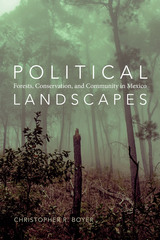 Political Landscapes: Forests, Conservation, and Community in Mexico
Christopher R. Boyer
Duke University Press, 2015 Following the 1917 Mexican Revolution inhabitants of the states of Chihuahua and Michoacán received vast tracts of prime timberland as part of Mexico's land redistribution program. Although locals gained possession of the forests, the federal government retained management rights, which created conflict over subsequent decades among rural, often indigenous villages; government; and private timber companies about how best to manage the forests. Christopher R. Boyer examines this history in Political Landscapes, where he argues that the forests in Chihuahua and Michoacán became what he calls "political landscapes"—that is, geographies that become politicized by the interactions between opposing actors—through the effects of backroom deals, nepotism, and political negotiations. Understanding the historical dynamic of community forestry in Mexico is particularly critical for those interested in promoting community involvement in the use and conservation of forestlands around the world. Considering how rural and indigenous people have confronted, accepted, and modified the rationalizing projects of forest management foisted on them by a developmentalist state is crucial before community management is implemented elsewhere.
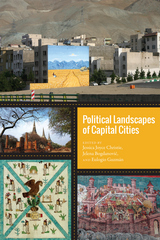 Political Landscapes of Capital Cities
Jessica Joyce Christie
University Press of Colorado, 2016 Political Landscapes of Capital Cities investigates the processes of transformation of the natural landscape into the culturally constructed and ideologically defined political environments of capital cities. In this spatially inclusive, socially dynamic interpretation, an interdisciplinary group of authors including archaeologists, anthropologists, and art historians uses the methodology put forth in Adam T. Smith’s The Political Landscape: Constellations of Authority in Early Complex Polities to expose the intimate associations between human-made environments and the natural landscape that accommodate the sociopolitical needs of governmental authority.
Political Landscapes of Capital Cities blends the historical, political, and cultural narratives of capital cities such as Bangkok, Cusco, Rome, and Tehran with a careful visual analysis, hinging on the methodological tools of not only architectural and urban design but also cultural, historiographical, and anthropological studies. The collection provides further ways to conceive of how processes of urbanization, monumentalization, ritualization, naturalization, and unification affected capitals differently without losing grasp of local distinctive architectural and spatial features. The essays also articulate the many complex political and ideological agendas of a diverse set of sovereign entities that planned, constructed, displayed, and performed their societal ideals in the spaces of their capitals, ultimately confirming that political authority is profoundly spatial.
Contributors: Jelena Bogdanović, Jessica Joyce Christie, Talinn Grigor, Eulogio Guzmán, Gregor Kalas, Stephanie Pilat, Melody Rod-ari, Anne Toxey, Alexei Vranich
The Political Language of Islam
Bernard Lewis
University of Chicago Press, 1988 A penetrating account, drawing on a wide range of sources in multiple languages, of the development of Islamic political language
What does jihad really mean? What is the Muslim conception of law? What is Islam's stance toward unbelievers? Probing literary and historical sources, Bernard Lewis traces the development of Islamic political language from the time of the Prophet to the present. His analysis of documents written in Arabic, Persian, and Turkish illuminates differences between Muslim political thinking and Western political theory, and clarifies the perception, discussion, and practices of politics in the Islamic world.
Political Leadership: A Source Book
Barbara Kellerman
University of Pittsburgh Press, 1986
This collection of essays draws on writings from mythologists, sociologists, philosophers, historians, and political activists, to present perspectives on the techniques, philosophies, and theories of political leadership throughout history. The forty-three selections offer a broad range of thought and provide a uniquely comprehensive reference.
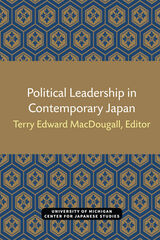 Political Leadership in Contemporary Japan
Terry Edward MacDougall, Editor
University of Michigan Press, 1982 Those who do not read Japanese seldom have access to analytic studies of the fascinating and surprisingly diverse world of contemporary Japanese political leadership. This volume constitutes a step toward bringing to the English reader some sense of the norms, beliefs, styles, and modes of exercising power of Japanese political leaders and the organizational and political contexts which are changing leadership role expectations. The second volume in this series concentrates more explicitly on leadership recruitment, although the subject is also addressed here. All of the essays in this volume highlight specific politicians, while attempting to develop analytic categories to understand the broader significance of these types of leaders. Included are the following: a Liberal Democratic Party prime minister and faction leader (Fukuda Takeo) who rose "almost effortlessly" to the pinnacle of power on the basis of an elitist educational and bureaucratic career background and another (Tanaka Kakuei) who took advantage of the chaotic wartime and immediate postwar period to overcome the limitations of his commoner background by developing an entrepreneurial style that makes him even today "the most powerful in Japan"; a younger conservative leader (Kono Yohei) who, with certain others of his generation, found life within the restrictive but predictable career paths of ruling Liberal Democrats less attractive than the risky option of forming his own New Liberal Club; an unconventional Socialist chairman (Asukata Ichio) who bucks the pull toward coalition making among the opposition parties in favor of his belief that this major but perpetual opposition party must first reconstruct itself and structure a new popular consensus that can legitimize a coalitional alternative to the Liberal Democrats; parliamentary leaders (like lower-house speaker Maeo Shigesaburo, directors of the House Management Committee, and heads of the Diet policy committees of the various parties) who are projected into increasingly influential roles by changing electoral trends and popular expectations; an innovative and dynamic mayor (Suzuki Heizaburo) who, taking advantage of the considerable authority afforded by Japan's "presidential" system of local chief executives, pursues his own priorities, mobilizing the requisite support despite the lack of national guidance and the oppositions of former backers; and the "power behind the throne" (Matsunaga Yasuzaemon and Komori Takeshi) whose visions move prime ministers and governors as well as their own followers in powerful public and private bureaucracies. [intro]
 Political Learning in Adulthood: A Sourcebook of Theory and Research
Edited by Roberta S. Sigel
University of Chicago Press, 1989 In the wake of World War II, the issues of political stability in general and the survival of stable democracies in particular captured the attention of American political scientists. An inevitable offshoot of this interest was the study of political behavior—how it is acquired and how and why it persists. In its early stages, work on political socialization focused exclusively on childhood and adolescence, as if the learning process ends when adulthood begins. Only recently has adult socialization emerged as a legitimate field of study within political science.
In Political Learning in Adulthood, social scientists for the first time examine the changes in political outlook and behavior that take place during the adult years, providing an invaluable overview of the problems, theories, and methodological approaches that characterize the field of political socialization. They consider which political values remain constant and which are subject to change, and they explore the ways in which both ordinary and extraordinary life events affect adults' political worldviews. Among specific topics considered are the effects of age and aging, the relation between participation in the work force and the development and expression of political views, continuity and change in the wake of revolutionary social and political movements, and the effects of such traumatic and life-threatening situations as war and terrorist activity.
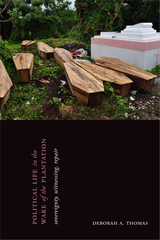 Political Life in the Wake of the Plantation: Sovereignty, Witnessing, Repair
Deborah A. Thomas
Duke University Press, 2019 In 2010, Jamaican police and military forces entered the West Kingston community of Tivoli Gardens to apprehend Christopher “Dudus” Coke, who had been ordered for extradition to the United States on gun and drug-running charges. By the time Coke was detained, somewhere between seventy-five and two hundred civilians had been killed. In Political Life in the Wake of the Plantation, Deborah A. Thomas uses the incursion as a point of departure for theorizing the roots of contemporary state violence in Jamaica and in post-plantation societies in general. Drawing on visual, oral historical, and colonial archives, Thomas traces the long-term legacies of the plantation system and how its governing logics continue to shape and replicate forms of violence. She places affect at the center of sovereignty to destabilize disembodied narratives of liberalism and progress and to raise questions about recognition, repair, and accountability. In tying theories of politics, colonialism, race, and affect together with Jamaica's history, Thomas presents a robust framework for understanding what it means to be human in the plantation's wake.
The Political Life of Medicare
Jonathan Oberlander
University of Chicago Press, 2003 In recent years, bitter partisan disputes have erupted over Medicare reform. Democrats and Republicans have fiercely contested issues such as prescription drug coverage and how to finance Medicare to absorb the baby boomers. As Jonathan Oberlander demonstrates in The Political Life of Medicare, these developments herald the reopening of a historic debate over Medicare's fundamental purpose and structure. Revealing how Medicare politics and policies have developed since Medicare's enactment in 1965 and what the program's future holds, Oberlander's timely and accessible analysis will interest anyone concerned with American politics and public policy, health care politics, aging, and the welfare state.
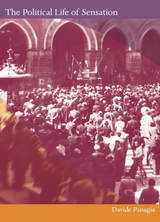 The Political Life of Sensation
Davide Panagia
Duke University Press, 2009 The taste of chocolate, the noise of a crowd, the visual impressions of filmic images—such sensory perceptions are rarely if ever discussed in relation to democratic theory. In response, Davide Panagia argues that by overlooking sensation political theorists ignore a crucial dimension of political life. Drawing on Gilles Deleuze’s and Jacques Rancière’s readings of Kantian aesthetics, Panagia posits sensation as a radical democratic moment of aesthetic judgment. He contends that sensory experience interrupts our perceptual givens, creating occasions to suspend authority and reconfigure the arrangement of a political order. Panagia claims that the rule of narrative governs our inherited notions of political subjectivity and agency, such that reading and writing are the established modes of political deliberation. Yet the contemporary citizen-subject is a viewing subject, influenced by film, photos, and other perceptual stimuli as much as by text. Challenging the rule of narrative, Panagia analyzes diverse sites of cultural engagement including the visual dynamics portrayed in the film The Ring, the growth of festival culture in late-fifteenth-century Florence, the practices of convivium espoused by the Slow Food movement, and the architectural design of public newsstands. He then ties these occasions for sensation to notable moments in the history of political thought and shows the political potential of a dislocated subjectivity therein. Democratic politics, Panagia concludes, involves a taking part in those everyday practices that interrupt our common modes of sensing and afford us an awareness of what had previously been insensible.
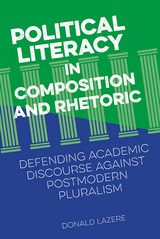 Political Literacy in Composition and Rhetoric: Defending Academic Discourse against Postmodern Pluralism
Donald Lazere
Southern Illinois University Press, 2015 In Political Literacy in Composition and Rhetoric, Donald Lazere calls for revival of NCTE resolutions in the 1970s for teaching the “critical reading, listening, viewing, and thinking skills necessary to enable students to cope with the persuasive techniques in political statements, advertising, entertainment, and news,” and explores the reasons these goals have been eclipsed in composition studies over recent decades. Obstacles to those goals have included the emphasis in the profession on basic and first year writing at the expense of more advanced study in argumentative rhetoric, and on the privileging of students’ personal writing over critical study of both academic and political discourse. Lazere further argues that theorists who legitimately champion students’ pluralistic local communities sometimes fail to recognize that liberal education can enable students to grow beyond their home cultures to critical awareness of national and international politics. Finally, he argues that the fixation in recent composition studies on liberally-inclined students and communities “on the margins” has eclipsed attention to the conservative conformity long prevalent in mainstream American society and education. His proposals for curriculum and pedagogy seek to introduce students to a more highly-informed, cogent, and open-ended level of debate between the political left and right.
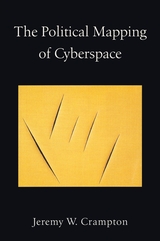 The Political Mapping of Cyberspace
Jeremy W. Crampton
University of Chicago Press, 2003 As inherently spatial beings, our sense of space in cyberspace challenges all that is familiar in terms of our ability to define, organize, govern, and map social places. In The Political Mapping of Cyberspace, Jeremy Crampton shows that cyberspace is not the virtual reality we think it to be, but instead a rich geography of political practices and power relations.
Using concepts and methods derived from the work of Michel Foucault, Crampton outlines a new mapping of cyberspace to help define the role of space in virtual worlds and to provide constructive ways in which humans can exist in another spatial dimension. He delineates the critical role maps play in constructing the medium as an object of knowledge and demonstrates that by processes of mapping we come to understand cyberspace. Maps, he argues, shape political thinking about cyberspace, and he deploys in-depth case studies of crime mapping, security maintenance, and geo-surveillance to show how we map ourselves onto cyberspace, inexorably, and indelibly.
Offering a powerful reinterpretation of technology and contemporary life, this innovative book will be an essential touchstone for the study of cartography and cyberspace in the twenty-first century.
 Political Matter: Technoscience, Democracy, and Public Life
Bruce Braun
University of Minnesota Press, 2010 Taking seriously the argument that things have politics, Political Matter seeks to develop a fully materialist theory of politics, one that opens new possibilities for imagining the relationship between scientific and political practices. The contributors assert that without such a theory the profusion of complex materials with and through which we live-plastic bags, smart cars, and long-life lightbulbs, for example-too often leaves us oscillating between fearful repudiation and glib celebration.
Exploring the frictions that come from linking the work of scholars in science and technology studies and political theory, these essays spark new ways of understanding the matter of politics.
Contributors: Andrew Barry, U of Oxford; Jane Bennett, Johns Hopkins U; Stephen J. Collier, New School; William E. Connolly, Johns Hopkins U; Rosalyn Diprose, U of New South Wales; Lisa Disch, U of Michigan; Gay Hawkins, U of New South Wales; Andrew Lakoff, UC San Diego; Noortje Marres, U of London; Isabelle Stengers, U Libre de Bruxelles; Nigel Thrift, U of Warwick.
 Political Memory in and after the Persian Empire
Jason M. Silverman
SBL Press, 2015 An interdisciplinary study of the Persian Period
Various disciplines that deal with Achaemenid rule offer starkly different assessments of Persian kingship. While Assyriologists treat Cyrus's heirs as legitimate successors of the Babylonian kings, biblical scholars often speak of a "kingless era" in which the priesthood took over the function of the Davidic monarch. Egyptologists see their land as uniquely independently minded despite conquests, while Hellenistic scholarship tends to evaluate the interface between Hellenism and native traditions without reference to the previous two centuries of Persian rule. This volume brings together in dialogue a broad array of scholars with the goal of seeking a broader context for assessing Persian kingship through the anthropological concept of political memory.
Features
- Articles present the results of an international symposium held in Leiden, the Netherlands, 2014
- More than twenty illustrations
- Seventeen articles, an introduction, and a summary response
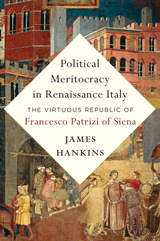 Political Meritocracy in Renaissance Italy: The Virtuous Republic of Francesco Patrizi of Siena
James Hankins
Harvard University Press, 2023 The first full-length study of Francesco Patrizi—the most important political philosopher of the Italian Renaissance before Machiavelli—who sought to reconcile conflicting claims of liberty and equality in the service of good governance.
At the heart of the Italian Renaissance was a longing to recapture the wisdom and virtue of Greece and Rome. But how could this be done? A new school of social reformers concluded that the best way to revitalize corrupt institutions was to promote an ambitious new form of political meritocracy aimed at nurturing virtuous citizens and political leaders.
The greatest thinker in this tradition of virtue politics was Francesco Patrizi of Siena, a humanist philosopher whose writings were once as famous as Machiavelli’s. Patrizi wrote two major works: On Founding Republics, addressing the enduring question of how to reconcile republican liberty with the principle of merit; and On Kingship and the Education of Kings, which lays out a detailed program of education designed to instill the qualities necessary for political leadership—above all, practical wisdom and sound character.
The first full-length study of Patrizi’s life and thought in any language, Political Meritocracy in Renaissance Italy argues that Patrizi is a thinker with profound lessons for our time. A pioneering advocate of universal literacy who believed urban planning could help shape civic values, he concluded that limiting the political power of the wealthy, protecting the poor from debt slavery, and reducing the political independence of the clergy were essential to a functioning society. These ideas were radical in his day. Far more than an exemplar of his time, Patrizi deserves to rank alongside the great political thinkers of the Renaissance: Machiavelli, Thomas More, and Jean Bodin.
The Political Message of the Shrine of St. Heribert of Cologne: Church and Empire after the Investiture Contest
Carolyn M. Carty
Arc Humanities Press, 2022 This is the first ever book in English solely devoted to one of the most important reliquary shrines of the Mosan Rhineland, the Heribert Shrine. Carolyn M. Carty investigates how liturgy, history, politics, and geography all converge to influence the creation and the message of a work of art in the aftermath of the Investiture Controversy between the Church and the Holy Roman Empire. She argues that the Heribert Shrine's images and inscriptions support the supremacy of the Church over the State with consequent implications for the shrine's intended viewers.
 The Political Mobilization of the Christian Community in Malaysia
Pui Yee Choong
Leiden University Press, 2024 Spanning Malaysia’s post-independence period, and using the repression-mobilization nexus as a key theoretical framework, this study outlines how its Christian community delicately and simultaneously defends its religious rights without being construed as anti-Islam in the face of state-led “Islamization”. By primarily focusing on the 1980s to the contemporary period, while considering subnational differences between East and West Malaysia, this study charts the changes in the community’s tactics of resistance and explains why it chose to adopt a non-partisan and non-violent approach despite targeted repression. In outlining the interplay between a minority community’s mobilization and national-level contestation, it focuses especially the role played by the Christian elites. Additionally, it raises key questions that remain relevant in the study of contentious politics: How do minority community in semi-democratic contexts protect their rights? What are their options and constraints for resistance? And how do changes in the political environment mould their strategy and tactics of resistance?
Political Mobilization of the Venezuelan Peasant
John Duncan Powell
Harvard University Press, 1971 In Venezuela, 1935 to 1958 marked the decline of traditional dictatorships and the emergence of stable democratic government. This pioneering study traces the formation of a successful alliance between the peasants and a small urban elite, provides an empirical structural-functional analysis of the alliance, and develops a provocative new view of peasant mobilization.
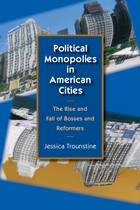 Political Monopolies in American Cities: The Rise and Fall of Bosses and Reformers
Jessica Trounstine
University of Chicago Press, 2008 Around the same time that Richard J. Daley governed Chicago, greasing the wheels of his notorious political machine during a tenure that lasted from 1955 to his death in 1976, Anthony “Dutch” Hamann’s “reform” government centralized authority to similar effect in San Jose. In light of their equally exclusive governing arrangements—a similarity that seems to defy their reputations—Jessica Trounstine asks whether so-called bosses and reformers are more alike than we might have realized.
Situating her in-depth studies of Chicago and San Jose in the broad context of data drawn from more than 240 cities over the course of a century, she finds that the answer—a resounding yes—illuminates the nature of political power. Both political machines and reform governments, she reveals, bias the system in favor of incumbents, effectively establishing monopolies that free governing coalitions from dependence on the support of their broader communities. Ironically, Trounstine goes on to show, the resulting loss of democratic responsiveness eventually mobilizes residents to vote monopolistic regimes out of office. Envisioning an alternative future for American cities, Trounstine concludes by suggesting solutions designed to free urban politics from this damaging cycle.
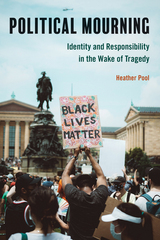 Political Mourning: Identity and Responsibility in the Wake of Tragedy
Heather Pool
Temple University Press, 2021 What leads us to respond politically to the deaths of some citizens and not others? This is one of the critical questions Heather Pool asks in Political Mourning. Born out of her personal experiences with the trauma of 9/11, Pool’s astute book looks at how death becomes political, and how it can mobilize everyday citizens to argue for political change. Pool examines four tragedies in American history—the Triangle Shirtwaist Factory Fire, the lynching of Emmett Till, the September 11 attacks, and the Black Lives Matter movement—that offered opportunities to tilt toward justice and democratic inclusion. Some of these opportunities were taken, some were not. However, these watershed moments show, historically, how political identity and political responsibility intersect and how racial identity shapes who is mourned. Political Mourning helps explain why Americans recognize the names of Trayvon Martin and Sandra Bland; activists took those cases public while many similar victims have been ignored by the news media. Concluding with an afterword on the coronavirus, Pool emphasizes the importance of collective responsibility for justice and why we ought to respond to tragedy in ways that are more politically inclusive.
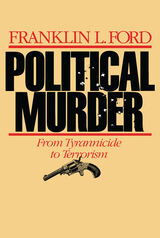 Political Murder: From Tyrannicide to Terrorism
Franklin L. Ford
Harvard University Press, 1985 Franklin Ford's unprecedented inquiry into assassination traverses civilizations, cultures, religions, and modes of social behavior to locate the common threads of this often mysterious and always shocking phenomenon.
Are there similarities between the killings of the Gracchi brothers and the Kennedy brothers? Does the Baader-Meinhof terrorist gang have roots in the rightist murder teams of Weimar Germany? Was political context as important to the crucifixion of Jesus as to the death of Martin Luther King in 1968? Are political murders usually produced by elaborate conspiracies, or are they more often the work of lone assassins? What circumstances and impulses motivate an individual to risk his or her own life to kill another for reasons of state? This fast-paced narrative, interspersed with reflections, finds intriguing implications in a multitude of famous cases.
From the first known case of political murder, Ehud the Benjamite's stabbing of Eglon, to the recent gunning down of Indira Gandhi by two trusted Sikh bodyguards, the frequency of such acts has varied greatly over time. Mainland Greece suffered few political murders in the violent century of Pericles. The Romans, despite their bloody record under the Empire, avoided assassination for almost four hundred years under the Republic. There was a third such "remission" during the twelfth and thirteenth centuries, Europe's high Middle Ages, matched by yet another extending from 1650 to 1789. In the interval between, the sixteenth century was an especially violent time in countries such as Scotland, the Netherlands, and France. Assassination and terrorism increased again after 1815, but the nineteenth century did not come close to equaling the twentieth in the number of brutal episodes.
Ford's exploration of calculated, personalized assassination draws on history, literature, law, philosophy, sociology, and religion. Addressing the vast array of cases and combing thousands of years of history, he asks most of all whether assassination works. Does it, in even a minority of cases, produce results consistent with the aims of those who attempt it? Can it forestall evil acts or prevent irreparable damage inflicted by misguided leaders? Or is it "bad politics" in every sense of the term? The questions are large ones, and this book offers a sophisticated basis for seeking answers.
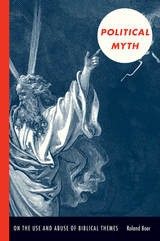 Political Myth: On the Use and Abuse of Biblical Themes
Roland Boer
Duke University Press, 2009 In this provocative and necessary work, Roland Boer, a leading biblical scholar and cultural theorist, develops a political myth for the Left: a powerful narrative to be harnessed in support of progressive policy. Boer focuses on foundational stories in the Hexateuch, the first six books of the Bible, from Genesis through Joshua. He contends that the “primal story” that runs from Creation, through the Exodus, and to the Promised Land is a complex political myth, one that has been appropriated recently by the Right to advance reactionary political agendas. To reclaim it in support of progressive political ends, Boer maintains, it is necessary to understand the dynamics of political myth. Boer elaborates a theory of political myth in dialogue with Ernst Bloch, Theodor Adorno, Alain Badiou, Jacques Lacan, and Slavoj Žižek. Through close readings of well-known biblical stories he then scrutinizes the nature of political myth in light of feminism, psychoanalysis, and Marxism. Turning to contemporary politics, he examines the statements of prominent American and Australian politicians to show how the stories of Creation, conquest, Paradise, and the Promised Land have been distorted into a fantasy of Israel as a perpetual state in the making and a land in need of protection. Boer explains how this fantasy of Israel shapes U.S. and Australian foreign and domestic policies, and he highlights the links between it and the fantasy of unfettered global capitalism. Contending that political myths have repressed dimensions which if exposed undermine the myths’ authority, Boer urges the Left to expose the weakness in the Right’s mythos. He suggests that the Left make clear what the world would look like were the dream of unconstrained capitalism to be realized.
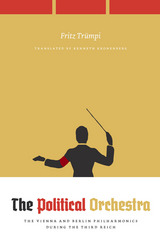 The Political Orchestra: The Vienna and Berlin Philharmonics during the Third Reich
Fritz Trümpi
University of Chicago Press, 2016 This is a groundbreaking study of the prestigious Berlin and Vienna Philharmonics during the Third Reich. Making extensive use of archival material, including some discussed here for the first time, Fritz Trümpi offers new insight into the orchestras’ place in the larger political constellation.
Trümpi looks first at the decades preceding National Socialist rule, when the competing orchestras, whose rivalry mirrored a larger rivalry between Berlin and Vienna, were called on to represent “superior” Austro-German music and were integrated into the administrative and social structures of their respective cities—becoming vulnerable to political manipulation in the process. He then turns to the Nazi period, when the orchestras came to play a major role in cultural policies. As he shows, the philharmonics, in their own unique ways, strengthened National Socialist dominance through their showcasing of Germanic culture in the mass media, performances for troops and the general public, and fictional representations in literature and film. Accompanying these propaganda efforts was an increasing politicization of the orchestras, which ranged from the dismissal of Jewish members to the programming of ideologically appropriate repertory—all in the name of racial and cultural purity.
Richly documented and refreshingly nuanced, The Political Orchestra is a bold exploration of the ties between music and politics under fascism.
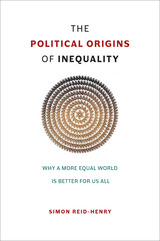 The Political Origins of Inequality: Why a More Equal World Is Better for Us All
Simon Reid-Henry
University of Chicago Press, 2015 Inequality is the defining issue of our time. But it is not just a problem for the rich world. It is the global 1% that now owns fully half the world’s wealth—the true measure of our age of inequality. In this historical tour de force, Simon Reid-Henry rewrites the usual story of globalization and development as a story of the management of inequality. Reaching back to the eighteenth century and around the globe, The Political Origins of Inequality foregrounds the political turning points and decisions behind the making of today’s uneven societies. As it weaves together insights from the Victorian city to the Cold War, from US economic policy to Europe’s present migration crisis, a true picture emerges of the structure of inequality itself.
The problem of inequality, Reid-Henry argues, is a problem that manifests between places as well as over time. This is one reason why it cannot be resolved by the usual arguments of left versus right, bound as they are to the national scale alone. Most of all, however, it is why the level of inequality that confronts us today is indicative of a more general crisis in political thought. Modern political discourse has no place for public reason or the common good. Equality is yesterday’s dream. Yet the fact that we now accept such a world—a world that values security over freedom, special treatment over universal opportunity, and efficiency over fairness—is ultimately because we have stopped even trying in recent decades to build the political architecture the world actually requires.
Our politics has fallen out of step with the world, then, and at the every moment it is needed more than ever. Yet it is within our power to address this. Doing so involves identifying and then meeting our political responsibilities to others, not just offering them the selective charity of the rich. It means looking beyond issues of economics and outside our national borders. But above all it demands of us that we reinvent the language of equality for a modern, global world: and then institute this. The world is not falling apart. Different worlds, we all can see, are colliding together. It is our capacity to act in concert that is falling apart. It is this that needs restoring most of all.
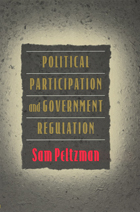 Political Participation and Government Regulation
Sam Peltzman
University of Chicago Press, 1998 Sam Peltzman is one of the world's leading economists, and the essays in this collection are central to the modern canon in political economy. These ten articles and an original introduction respond to two broad questions: How does government work? How do voters and their elected representatives make decisions? Given the media's portrayal of the cynical political atmosphere in America, Peltzman's responses are rather surprising—the electorate really does make well-informed decisions and elected officials actually do tend to vote according to their constituents' interests. These conclusions bear the stamp of the Chicago approach to political economy (which applies microeconomic principles to political phenomena), an approach that has had considerable success explaining why certain government policies have not achieved their intended effects.
This collection reflects Peltzman's long career studying the interface between the private economy and the public sector. It will be essential to anyone who wishes to study government activity and voting behavior from an economic perspective.
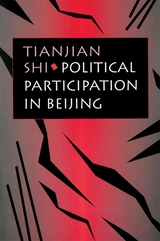 Political Participation in Beijing
Tianjian Shi
Harvard University Press, 1997 In this first scientific survey of political participation in the People's Republic of China, Tianjian Shi identifies twenty-eight participatory acts and groups them into seven areas: voting, campaign activities, appeals, adversarial activities, cronyism, resistance, and boycotts. What he finds will surprise many observers. Political participation in a closed society is not necessarily characterized by passive citizens driven by regime mobilization aimed at carrying out predetermined goals. Beijing citizens acknowledge that they actively engage in various voluntary participatory acts to articulate their interests.
In a society where communication channels are controlled by the government, Shi discovers, access to information from unofficial means becomes the single most important determinant for people's engaging in participatory acts. Government-sponsored channels of appeal are easily accessible to ordinary citizens, so socioeconomic resources are unimportant in determining who uses these channels. Instead, voter turnout is found to be associated with the type of work unit a person belongs to, subjective evaluations of one's own economic status, and party affiliation. Those most likely to engage in campaign activities, adversarial activities, cronyism, resistance, and boycotts are the more disadvantaged groups in Beijing. While political participation in the West fosters a sense of identification, the unconventional modes of participation in Beijing undermine the existing political order.
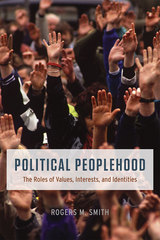 Political Peoplehood: The Roles of Values, Interests, and Identities
Rogers M. Smith
University of Chicago Press, 2015 For more than three decades, Rogers M. Smith has been one of the leading scholars of the role of ideas in American politics, policies, and history. Over time, he has developed the concept of “political peoples,” a category that is much broader and more fluid than legal citizenship, enabling Smith to offer rich new analyses of political communities, governing institutions, public policies, and moral debates.
This book gathers Smith’s most important writings on peoplehood to build a coherent theoretical and historical account of what peoplehood has meant in American political life, informed by frequent comparisons to other political societies. From the revolutionary-era adoption of individual rights rhetoric to today’s battles over the place of immigrants in a rapidly diversifying American society, Smith shows how modern America’s growing embrace of overlapping identities is in tension with the providentialism and exceptionalism that continue to make up so much of what many believe it means to be an American.
A major work that brings a lifetime of thought to bear on questions that are as urgent now as they have ever been, Political Peoplehood will be essential reading for social scientists, political philosophers, policy analysts, and historians alike.
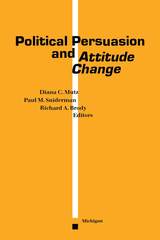 Political Persuasion and Attitude Change
Diana C. Mutz, Richard A. Brody, and Paul M. Sniderman, Editors
University of Michigan Press, 1996 Political Persuasion and Attitude Change defines and introduces a new field of research, one that investigates the alteration of people's attitudes: when people can be moved, and when they cannot.
Each chapter synopsizes a major area of political persuasion and provides an update on the latest findings as well as overviews of past research in each area. Whole sections of the book center on the three major agents involved in the political persuasion process: the mass media, political elites, and individual citizens themselves.
Political Persuasion and Attitude Change boldly contradicts the received wisdom on the extent of mass media's influence on political attitudes and argues that the media's effects are indeed massive, rather than limited. It explores the impact of political elites on the persuasion process, and focuses on individual control over the persuasion process.
This volume is unique in that chapters address theoretical as well as methodological issues, simultaneously combining reviews of literature with the latest research findings. It will appeal to scholars and students interested in the study of political persuasion in contemporary politics across the disciplines of political science, psychology, sociology, and communications.
Part I. Mass Media and Political Persuasion. Contributors are Steven Ansolabehere and Shanto Iyengar; Joanne M. Miller and Jon A. Krosnick; and John Zaller.
Part II. Persuasion by Political Elites. Contributors are James H. Kuklinski and Norman L. Hurley; Kathleen M. McGraw and Clark Hubbard; Lee Sigelman and Alan Rosenblatt.
Part III. Individual Control of the Political Persuasion Process. Contributors are Steven H. Chaffee and Rajiv Rimal; Dennis Chong; Gregory Andrade Diamond and Michael D. Cobb; Jeffrey Mondak, Diana C. Mutz, and Robert Huckfeldt.
Diana C. Mutz is Associate Professor of Political Science and Mass Communications, University of Wisconsin, Madison. Paul M. Sniderman is Professor of Political Science, Stanford University. Richard A. Brody is Professor Emeritus of Political Science and Communications, Stanford University.
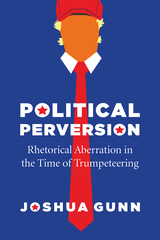 Political Perversion: Rhetorical Aberration in the Time of Trumpeteering
Joshua Gunn
University of Chicago Press, 2020 When Trump became president, much of the country was repelled by what they saw as the vulgar spectacle of his ascent, a perversion of the highest office in the land. In his bold, innovative book, Political Perversion, rhetorician Joshua Gunn argues that this “mean-spirited turn” in American politics (of which Trump is the paragon) is best understood as a structural perversion in our common culture, on a continuum with infantile and “gotcha” forms of entertainment meant to engender provocation and sadistic enjoyment.
Drawing on insights from critical theory, media ecology, and psychoanalysis, Gunn argues that perverse rhetorics dominate not only the political sphere but also our daily interactions with others, in person and online. From sexting to campaign rhetoric, Gunn advances a new way to interpret our contemporary political context that explains why so many of us have difficulty deciphering the appeal of aberrant public figures. In this book, Trump is only the tip of a sinister, rapidly growing iceberg, one to which we ourselves unwittingly contribute on a daily basis.
 Political Philosophy 1: Rights--The New Quarrel between the Ancients and the Moderns
Luc Ferry
University of Chicago Press, 1990 In recent years, an increasing number of thinkers have grown suspicious of the Enlightenment ideals of progress, reason, and freedom. These critics, many inspired by Martin Heidegger, have attacked modern philosophy's attempt to ground a vision of the world upon the liberty of the human subject. Pointing to the rise of totalitarian regimes in this century, they argue that the Enlightenment has promoted the enslavement of human beings rather than their freedom.
In this first of four volumes that aim to revitalize the fundamental values of modern political thought, one of the leading figures in the contemporary revival of liberalism in France responds to these critics and offers a philosophically cogent defense of a humanistic modernity. Luc Ferry reexamines the philosopical basis of the contemporary retreat from the Enlightenment and then suggests his own alternative, which defends the ideals of modernity while giving due consideration to the objections of the critics.
 Political Philosophy 2: The System of Philosophies of History
Luc Ferry
University of Chicago Press, 1992 Because contemporary political philosophy owes a significant debt to the great nineteenth-century German philosophies of history, a sound knowledge of German Idealist philosophy is crucial to an understanding of our own time. In Political Philosophy 2, Luc Ferry provides not only a thorough introduction to German Idealism and its critics, but also an insightful look at contemporary political philosophy.
Ferry begins this second volume of his ambitious three-volume Political Philosophy by considering both the structure and the potential political effects of the various philosophies of history born of German Idealism. He focuses on the key question of whether, and to what extent, the principle of reason may be said to govern the totality of the historically real. This leads to an examination of Hegel's criticism of the moral view of the world and to an assessment of the phenomenological criticism of Hegel put forth by Heidegger and Arendt.
Political Philosophy 3: From the Rights of Man to the Republican Idea
Luc Ferry and Alain Renaut
University of Chicago Press, 1992 What is the common element linking the right to health care and the right of free speech, the right to leisure and the right of free association, the right to work and the right to be protected? Debates on the rights of man abound in the media today, but all too often they remain confused and fail to recognize the fundamental political conceptions on which they hinge.
Several French theorists have recently attempted a new account of rights, one that would replace the discredited Marxist view of rights as mere formalities concealing the realities of class domination. In this final volume of Political Philosophy, Luc Ferry and Alain Renaut summarize these efforts and put forward their own set of arguments.
Political Philosophy and Revelation
James V. Schall, SJ
Catholic University of America Press, 2013 A collection of Fr. James Schall's recent essays, Political Philosophy and Revelation offers a learned, erudite, and coherent statement on the relationship between reason and revelation in the modern world. It addresses political philosophy in the context of an awareness of other humane and practical sciences, including history, literature, economics, theology, ethics and metaphysics.
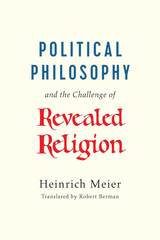 Political Philosophy and the Challenge of Revealed Religion
Heinrich Meier
University of Chicago Press, 2017 Heinrich Meier’s guiding insight in Political Philosophy and the Challenge of Revealed Religion is that philosophy must prove its right and its necessity in the face of the claim to truth and demand obedience of its most powerful opponent, revealed religion. Philosophy must rationally justify and politically defend its free and unreserved questioning, and, in doing so, turns decisively to political philosophy.
In the first of three chapters, Meier determines four intertwined moments constituting the concept of political philosophy as an articulated and internally dynamic whole. The following two chapters develop the concept through the interpretation of two masterpieces of political philosophy that have occupied Meier’s attention for more than thirty years: Leo Strauss’s Thoughts on Machiavelli and Jean-Jacques Rousseau’s Social Contract. Meier provides a detailed investigation of Thoughts on Machiavelli, with an appendix containing Strauss’s original manuscript headings for each of his paragraphs. Linking the problem of Socrates (the origin of political philosophy) with the problem of Machiavelli (the beginning of modern political philosophy), while placing between them the political and theological claims opposed to philosophy, Strauss’s most complex and controversial book proves to be, as Meier shows, the most astonishing treatise on the challenge of revealed religion. The final chapter, which offers a new interpretation of the Social Contract, demonstrates that Rousseau’s most famous work can be adequately understood only as a coherent political-philosophic response to theocracy in all its forms.
|
|
